














In our Cover Feature, Happy Nkhoma, our resident journalist, speaks to Aretha Charles, about her company UHURU Development Projects’ endeavours to solve real energy and power problems for poor rural communities.
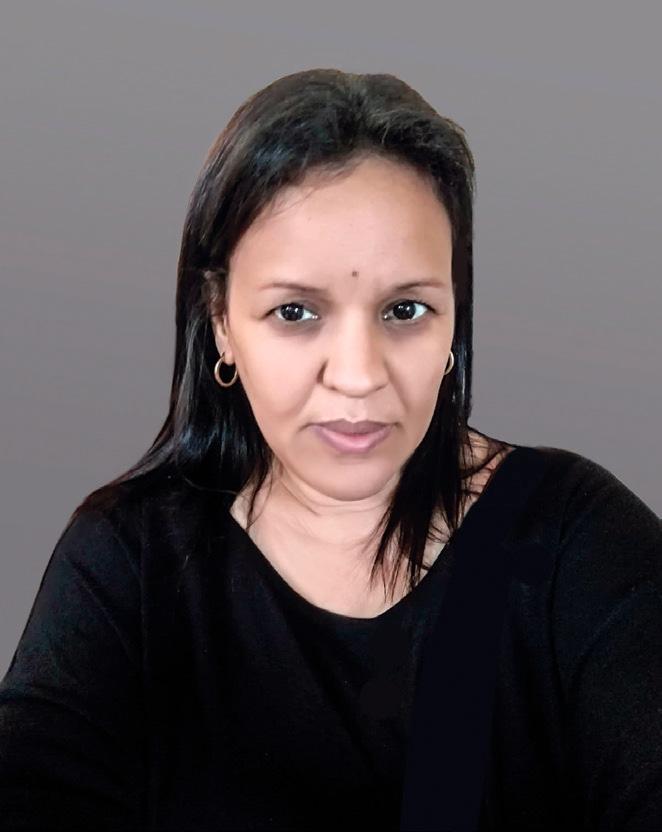


cooperative government by extension, and saw the delegates commit to turning around municipalities through the institutionalisation and implementation of the District Development Model (DDM).
Aretha has an amazing story to tell having come from Queenstown, a small town in the Eastern Cape, that had no street lighting and even neighbouring houses in outlying areas were not electrified. She dug deep, completing her studies, started a company, and now counts partnerships with various municipalities as the solution to lighting up the streets and homes in rural communities at an affordable rate.
In these very challenging times, government is looking towards PPP’s, or Public-Private Partnerships, to better respond to SA’s growing concerns that include unemployment, economic development, poverty, re-imagining SA after Covid19, the KZN floods, waste management, housing, our energy crises, social cohesion and bridging the digital divide, to name just a few of the challenges we now face.
Local, provincial and national government leaders are looking at innovative solutions, and synergies with civil society and the private sector, to identify and seize opportunities for collective impact.
We highlight the 2-day national Local Government Summit convened in September by Minister Nkosazana Dlamini-Zuma that addressed challenges that face local government and
opportunities to thousands across the province.
This period is cause for celebration for some, and the CSIR is wrapping up the year on a good note with the organisation having recorded an 81% achievement of its targets for the 20212022 financial year. With such outstanding results, CEO Thulani Dlamini is confident that the organisation is well on track of supporting the creation of a very capable state and supporting industrial development.
In this edition our cover feature showcases Cell C which has invested in “connecting communities and building capabilities”, where those who have been previously disadvantaged are afforded opportunities that empower them with the necessary skills, services
and products that enable them to participate in the growing economy.
Municipal Focus unpacks the role, commitment and contribution of the National School of Government (NSG) to the establishment of a capable, professional and responsive public sector, and speaks to Principal, Prof Busani Ngcaweni, about the NSG’s work in the local government sphere that include programme partnerships and capacity building interventions, so that public servants can best understand and implement their work.
Limpopo Province is on the move with new MEC of Economic Development, Environment and Tourism, Rogers Monama, promising to accelerate the provincial SEZ programmes and bring
June 2022 coincides with Youth Month and we have a conversation with Malusi Shezi, the CEO of CETA (Construction Education & Training Authority) about the construction industry, empowering youth with skills in the sector, the SETA’s successes and challenges, and collaborations with some of the other SETA’s and TVET Colleges that will benefit the youth.
South Africans take care of their own, and November being Disabilities Awareness Month, Minister in the Presidency for Women, Youth and People, Maite Nkoana-Mashabane, reiterated the Department's commitment to the unique needs, experiences and expertise of persons with disabilities premised on the regional and national frameworks. The Minister also urged all of government to be involved in developing the national development rights agenda.
The Electoral Commission has embarked on a Youth Democracy Campaign, aimed at youth voter education, participation and registration. Mawethu Mosery, Deputy Chief Electoral Officer: Outreach at the Electoral Commission, said that engaging the youth in this manner will empower this generation with the knowledge, skills and attitudes that will allow them to participate in elections and to shape their own future.
The Mayor of Elias Motsoaledi Local Municipality is doing just that – restoring human dignity for disabled persons in the region by handing out food parcels and delivering wheelchairs to the Tswelopele Disability Centre.
Barloworld celebrates its 120th Anniversary and continues the group’s legacy of positively impacting the communities in which it operates. Through its flagship programme, Barloworld Mbewu, it offers support to start-ups and other organizations that exist to help solve local socioeconomic challenges. Through its perpetual policy of giving back to communities, this iconic South African company continues to thrive.
As 2022 comes to a close we wish all our readers, and all South Africans a peaceful year-end and hope that the new year will bring with it opportunities to fulfil all our personal, philanthropic and professional aspirations.

Enjoy the read and keep safe!

Through collaborations, and by introducing civil society and private sector technology, innovation and ideas to deal with SA’s challenges, we are better positioned to make local government work, supplement the limited government capacity and resources we have, and provide better public services!
Enjoy the read and keep safe!



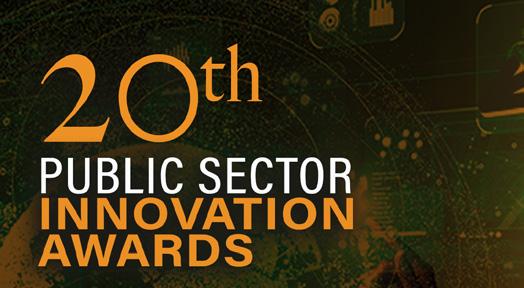
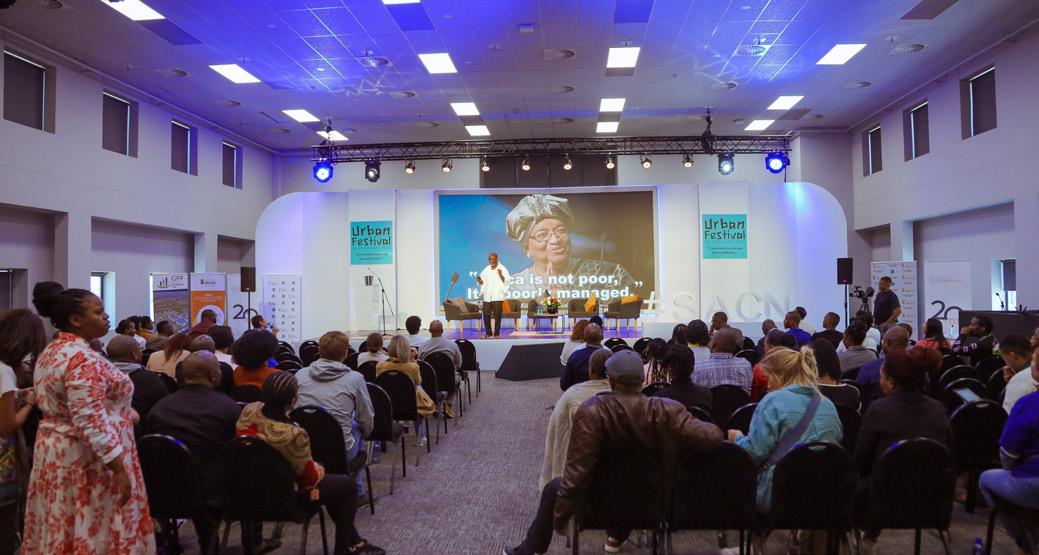





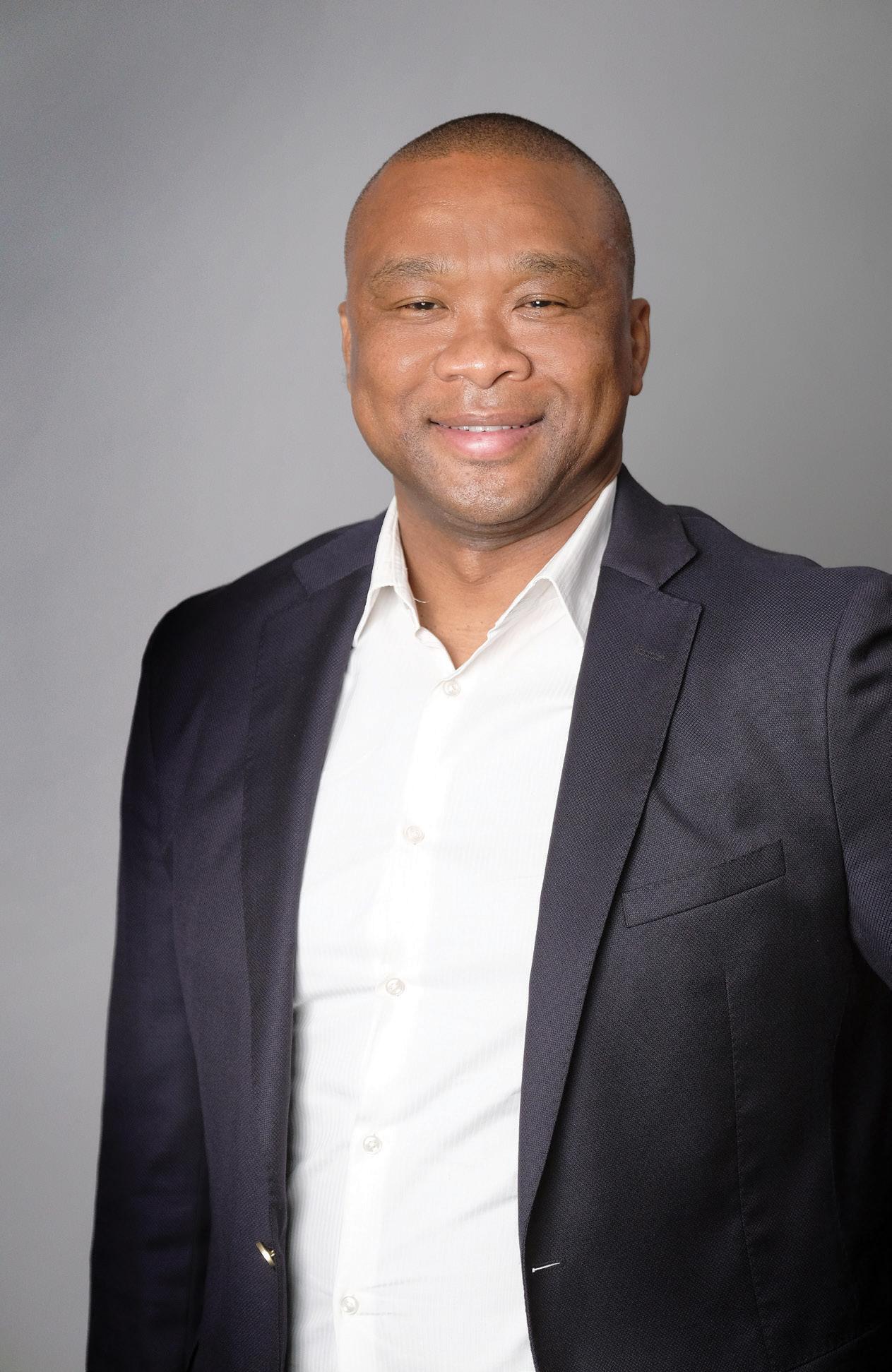


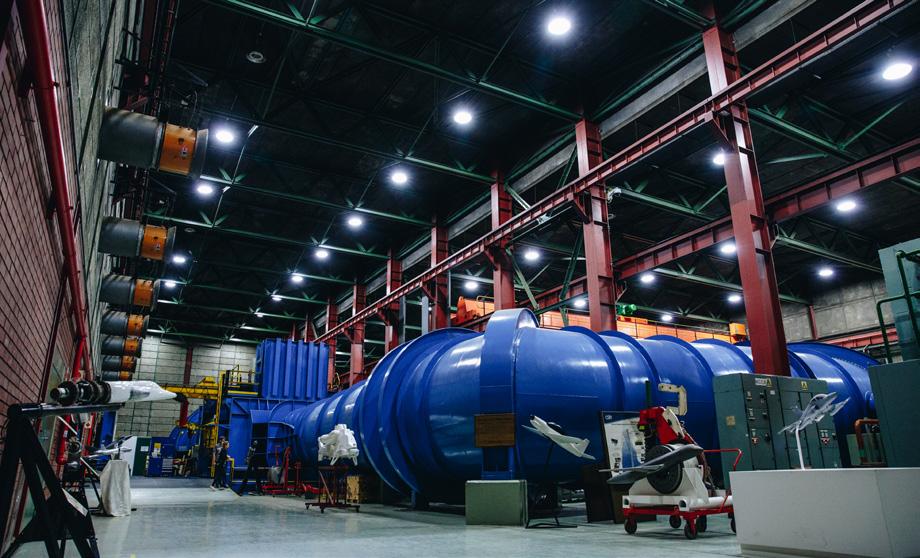
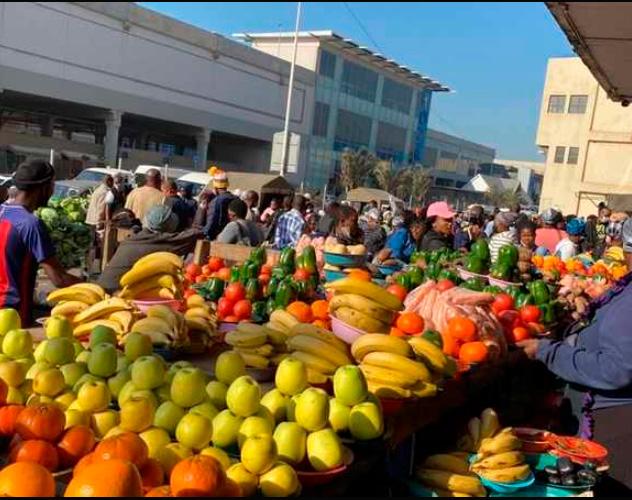




The Green Economy and the Renewable Energy revolution are not just pie-in-the-sky playthings for academia and tree-hugging environmentalists in rich developed economies. They can solve real energy and power problems for poor rural communities. Indeed, finding a young African woman pioneering in this sector is rare; Municipal Focus chats to Ms. Aretha Charles, Director of Uhuru Development Projects about her passion for the sector.
I originally studied quantity surveying and went on to work in the construction sector mainly in the Gqeberha and surrounding areas. I then started my own construction company where, in 2011, I was given an opportunity to implement a pilot project on renewable energy that was partially funded and promoted by the South African National Energy Development Institute


(SANEDI), and Department of Science and Technology. The University of Fort Hare was the implementing agent.
This, together with my humble origins have a lot to do with how I ended up in the renewable energy sector, otherwise known as the Green Energy Sector. In the rural parts of Queenstown, a small town in the Eastern Cape Province where I come from, we had no street lighting and some far outlying houses were not electrified. I had first-hand experience of the challenges faced by communities in rural, outlying areas.
First having worked with standard electrification projects I had to learn about renewable energy and energy efficiency in construction. Most importantly though, I learned about the importance of >
partnerships. I learned that partnerships make the high costs of implementing projects more affordable. They also reduce the limitations of scarce skills and resources. In this regard I realized that my dream of lighting up the streets of rural communities at an affordable cost to them was possible. At a technical level I learned about biogas digesters, solar power and wind as sources of energy and how to work with these forces.
It is against this background I formed Uhuru Development Projects and that was the beginning and not the end of the challenge!
At a country level I realized that most of the renewable Independent Power Producer (IPP) technology vested outside of South Africa; a lot of it in Europe –so bringing it into the country will be costly and challenging. At a sectorial level South Africa needed to learn pretty quickly whilst addressing legislative and capacity challenges as well as dealing with implementation framework issues; and still catch up with the rest of the world – considering that the migration from fossil fuel energy to renewable was
a global phenomenon and South Africa is the highest electricity producer and consumer on the continent. So, we are a significant player. At a business level, I was entering into a sector that, like many other sectors in South Africa, was majority male-dominated and skewed against HDIs especially women. At a personal level I realized that the capital costs of growing and running a business in this sector would be especially high.
I had to become an activist for myself as well as for other women and youth out there. To be taken seriously I had to fight for recognition – just to be given an audience. I had to fight the notion that I was fronting for ‘Big Brother’ out somewhere; that I was my own person with my own vision. So we have come a long way for Uhuru to do the things that we do.
We use renewable energy to contribute to the Green Economy by designing and implementing renewable energy projects that will contribute to the
supply of electricity to municipalities, towns, industry and the National Grid, whilst creating sustainable jobs and developing critical skills for the country.

Our ethos is Partnerships. Since municipalities are the delivery arm of government, we believe partnering with them to deliver these projects will greatly assist in developing the country and its economy.
• Development in provision of sustainable energy sources
• Implementation of labour-intensive renewable energy projects
• Creating employment opportunities and alleviating poverty within rural and low Income urban communities
• Reducing electricity demand and energy use
• Energy management and awareness in the rural communities
We install bio-gas digesters in land fill sites as well as pit latrines to produce Green Gas that can be used directly for heating or production of electricity. Land fill sites are owned and managed by municipalities therefore a partnership here will enable them to augment the energy supply in their locality. Rural municipalities are the ones that help build pit latrines in schools, facilities and buildings due to lack of running water infrastructure. So a partnership in this regard will ensure that we can use this shortcoming to their advantage and produce gas.
We are currently refurbishing a school kitchen in the Chris Hani District in the Eastern Cape; we are incorporating biogas digesters for cooking and retrofitting all electrical equipment with energy efficient solutions – we are doing this in partnership with the Department for Science and Innovation (DSI).
We also built off-grid solar systems that can power streetlights and other farflung buildings and facilities.
Municipalities can use this partnership to provide power and energy to nonelectrified areas and to meet the social demands of the indigent. The solution we provide is wholistic; we prefer that the municipality implement an energy saving project and greening project simultaneously.
It means that the municipality can retrofit energy saving devices in its buildings and facilities as well as for beneficiaries of their social investments such as, the indigents, whilst rolling out alternative energy using renewable energy methods such as bio-digesters and solar panels.

All this will be done whilst training local youth and women on the implementation and maintenance of such projects.
Maintenance cannot be overstated because all infrastructure requires attention as it grows older. The current Eskom situation being the case in point in the energy sector.
You said skill levels in this sector are low, so how do we then implement the above?
Partnerships are the solution. There are pockets of knowledge at institutions such as SANEDI, the University of Fort Hare and other tertiary institutions. The SETAs can play a leading role in facilitating skills development programs aimed at rural youth and women.
I know that the natural next question is where the resources to develop this training and to implement it will come from. Partnerships again. There are various strategic organizations that have a direct interest in this sector such as the Central Energy Fund (CEF), the National Skills Fund (NSF), the National Youth Development Agency (NYDA) among others who can marshal resources to this effect. The municipalities’ role as well as that of Uhuru would be to provide the platform for practical application of the training received. The municipality will benefit from the projects implemented and >
energy saved, as well as the jobs and skills created. A large amount of the power saved from the grid can now be sold to industry, creating revenue for the municipality.

What do you see as your key role in this regard?
Mobilizing resources is no easy task, Uhuru Development Projects will facilitate the resource mobilization through our existing partnerships.
What kind of partnerships have you developed?
We have strategic partnerships with structures such as the Mbuyane Traditional Council in the Mpumalanga Provinc; the Shembe Church, Ekuphakameni; the Umhlathuze Local Municipality; as well as the Hlomendlini Local Municipality, just to name a few.
Over the years we have built a reputation of strategic relationships with the private sector as well as other arms of government and regional and global development organizations. We sit on the National Renewable Energy Masterplan Committee in partnership with NEDLAC. We participate in the BRICS energy working group.
We have entered into a strategic partnership with the Ingonyama Trust of Kwa-Zulu Natal to deliver rural energy
projects – something the municipalities can benefit from. We are also working on Green Field off-grid electrification projects in Zambia and Tanzania in partnership with the Zambia Electricity Supply Corporation (ZESCO) – and can do the same with our Eskom.
What is the main thing municipalities need to consider in this relationship?
The frontloading that is required to create the Greenfield Project. It means that resources must be deployed upfront to develop the requisite statutory documents such as the Land Rights, the Eskom Grid Analysis, the Environ-mental Impact Analysis and the planning and designing of the plant, which requires specialists who are not available in South Africa and who need to be sourced offshore at a huge cost; and that is before the business case, which is in the form of a Power Purchase Agreement (PPA), can be put on the table. This frontloading is what becomes a barrier of entry for emerging enterprises.
The legislative framework that governs electrification and energy supply needs to be understood and navigated. This is another area where partnership with Uhuru will benefit the municipality. We have navigated this environment as the legal framework metamorphosed over the years and are a part of the structures that are continuously evaluating and implementing it.
One of the key considerations that municipalities need to make, is the option of co-generation. Instead of relying solely on Eskom, which is the current scenario, or going at it alone which is the other extreme position; municipalities should consider partnering with other stakeholders, especially private sector or other arms of government to generate power using renewables and then on-sell it to their local costumers on a revenue-sharing model with Eskom. In the coastal areas for example, an offshore wind turbine can generate up to 5MW of electricity which can go a long way towards meeting the needs of Eskom’s own customers demand at a local level. Municipalities can partner with private sector to in vest in this infrastructure.
A kneejerk reaction would say we are slow in implementation and are lagging behind. However, a fair and deeper analysis would show that we have advanced through leaps and bounds over a short space of time with limited resources. Our energy sector inherited a power generation and distribution system that was skewed against the majority of the population and was
based on ancient fossil fuel-driven power generation technology. So we have had to grapple with lighting up the backlogs whilst addressing new areas of property development without additional resources or supply. The advent of renewable alternatives meant that we had to divert some of our resources (both human and financial) to learn and catch up to the rest of the world. The traditional resistance to change has not helped but has slowed down progress instead. We therefore have to embrace the new as part of the solution.
Interestingly rural communities see and consider alternative energy and off-grid electricity as inferior to what they view as modern ‘Eskom power/electricity’ and resist it until they see its benefit and affordability. Ironically it is these rural

areas that have a lack of energy and power and stand to benefit the most from off-grid alternative energy supply.

What should then be done to speed up the process?
There is a need for more collaboration between municipalities, the private sector, various arms of government, Eskom and the communities to address alternative energy at local level in a decentralised manner to the benefit of the end user without exclusions. What is in the hands and ambit of the municipality is the use of energy saving projects through retrofitting to create local green economies and a skills pool. Through these projects municipalities can
fight crime in rural off-grid communities by installing streetlights powered by solar or biogas digesters from home pit latrines.
Uhuru means ‘freedom’ in Kiswahili and we shall not have attained our freedom if we remain a “dark” continent in the eyes of the developed world. We are here to work in partnership with the municipalities to light up the dark corners of our rural villages without increasing our CO2 emissions -and to create a vibrant green economy for rural communities.
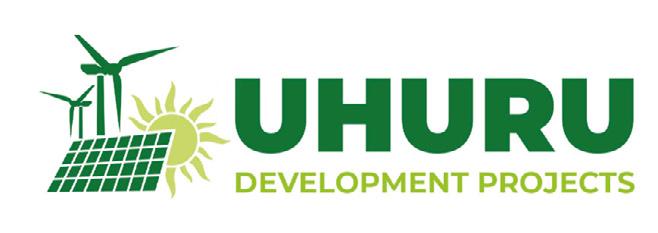
A key area in the delivery of services is the building of strategic partnerships which will form an integral part of achieving a state of ideal municipalities working with business, international communities and other key stakeholders and role players.

The two-day national Local Government Summit was convened by the Minister of Cooperative Governance and Traditional Affairs (CoGTA), Dr Nkosazana Dlamini Zuma, and held in Boksburg, Gauteng, 27- 28 September 2022.
This summit was a reflection of the District Development Model (DDM) in action towards realising the state of an ideal municipality that is underpinned by an ideal Local Government, it was in essence a reinforcement of chapter 3 of the Constitution.
The
Cabinet Ministers, Deputy Ministers, Premiers, Heads of Missions in SA, Heads of State-Owned Entities, MECs, Mayors, Municipal Managers, Traditional and Khoi-San leaders, Academia, and national and provincial department heads attended the summit in keeping with the principles of cooperative governance.
The two-day gathering presented a platform for the coalescence of solutions to collectively
address challenges that face local government and cooperative government by extension.
The first day of the summit saw the Minister of CoGTA, Dr Dlamini Zuma, delivering a keynote address emphasising the need to address three key focus areas comprised of creating a conducive environment for a healthy interface between Governance and Administration in order to facilitate inclusive Local Economic Development and integrated service delivery. The Minister called on all stakeholders in local government to take stock of the progress and challenges experienced in the 21 years of a democratic local government and begin to work towards an ideal municipality.
Ministers, MECs, business and academic representatives stressed the recognition of municipalities as being at the heart of development in our communities. The Auditor General, Ms Tsakani Maluleke underscored governance and the prudent use of public funds. The Statistician General, Dr Risenga Maluleka highlighted planning as a key to successful delivery of services in municipalities.
Building on the addresses of the first day, panel discussions and breakaway sessions were able to lift-up critical areas for concerted intervention efforts to strengthen municipal governance, improve service delivery
and audit outcomes, as well as befitting conditions for a community centred development.
As part of the discussion to chart the way forward towards achieving effective and efficient functioning municipalities as espoused by the National Development Plan, delegates agreed that the success of local government is the success of the whole of government and the country at large. Delegates supported the institutionalisation of the DDM as an all of society and all of government approach to build resilient, sustainable, cohesive, nonsexist, non-racial and climate-smart communities.
The institutionalization of the DDM is taking the country towards integrated planning and doing away with silos. Business and Academic representatives also acknowledged the DDM as a viable method to address the gaps and challenges of service delivery. Delegates committed to full participation in the development of the district “One Plans” as a longterm instrument for development by all districts and metropolitan municipalities.
Delivering his remarks on the second day of the summit President Ramaphosa called for strengthening of leadership, administration, governance, and financial management. >
institutionalization of the DDM is taking the country towards integrated planning and doing away with silos.
The summit appreciated that many municipalities have been unable to increase economic investment and job creation. This challenge can be attributed to poor or lack of local economic development (LED) plans. To this effect, the delegates agreed that LED units in municipalities should be strengthened. There was an agreement that municipalities should be strengthened and capacitated to be engines for the national economic development.
A key element related to local economic development that was raised is skills. The Minister of COGTA urged for skills revolution which will support the needs of municipalities and the growing economy.
The rural master plan was raised as an important milestone in the quest to deliver services and develop communities. This important initiative is led by traditional leaders and have urged for government and other stakeholders support to implement this plan.
The delegates committed to turning around municipalities through the institutionalisation and implementation of the DDM.
The 21-year review of Local Government will provide the necessary insight of what has worked, what was achieved and the way forward for this sector. The review should assist to set us on a path to having municipalities that work for communities.
The issue of disasters was also raised as requiring attention. Communities have to be involved in the discussions about disaster preparedness and disaster risk reduction.
The panel and commissions looked at Governance and Administration and reflected on challenges facing municipalities. The discussions touched on governance structures in municipalities; hung’ councils and their impact on service delivery, the need to have clear delineation between political and administrative leadership; the role of Traditional Leaders in ensuring good governance in municipalities; the functionality of ward committees and innovative ways to expand public participation; poor oversight and accountability and corruption
The panel on service delivery acknowledged challenges in municipalities mainly relating to inadequate infrastructure
that allow the for the delivery of services; Inadequate Maintenance; Infrastructure Lifecycle Management (Asset management); Theft and vandalism of infrastructure and the Reluctant uptake of innovative alternatives.
The last panel discussion looked at local economic development and called for the strengthening of LED. The panel lamented Inadequate strategic planning; touched on the Integration of government plans and investment partners and ensuring integrated planning.
The summit culminated in the signing of a pledge as a commitment to service delivery and also adopted a plan of action which will guide government and all role-players on a path to efficient, effective, reliable, and consistent service delivery as promised by the Constitution.
Minister Dlamini Zuma concluded by thanking all delegates and presenters at the summit. She asked all delegates to bring to life the discussions and decisions of the summit, thus ensuring that communities get access to services as required.
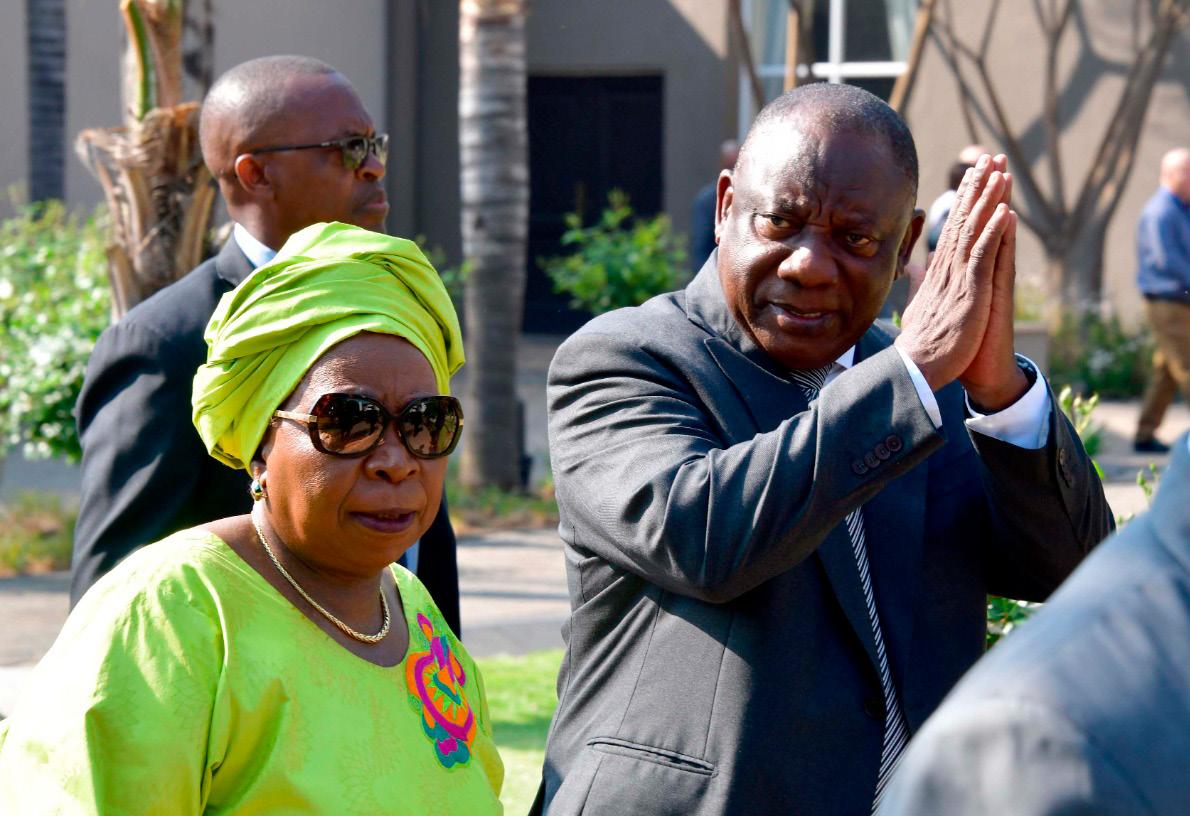
The delegates committed to turning around municipalities through the institutionalisation and implementation of the DDM.
Tell: 012 334 0600 Email: info@cogta.gov.za Web: www.cogta.gov.za
Address: 87 Hamilton Street, Arcadia, Pretoria
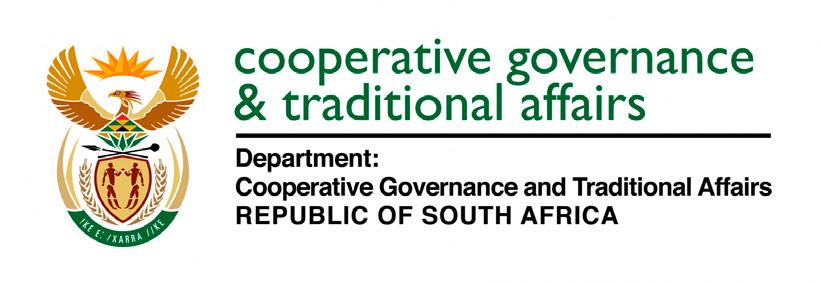
A thriving manufacturing industry creates jobs and business opportunities, enables skills development and improves our competitiveness in global markets. A first step is procuring locally manufactured goods, this has obvious benefits for national competitiveness and economic growth.
SABS’ mandate is to provide standardisation, voluntary conformity assessment, and local content verification services to enable the achievement of the country's industrial, economic, and developmental objectives. Now more than ever our industry needs Quality Assurance through standardasation! Start your Certification journey today and Contact us!
SANS/ISO 50001 Energy Management.

For organisations committed to addressing their impact, conserving resources and improving the bottom line through efficient energy management, SANS/ISO 50001was developed. Designed to support organisations in all sectors, this ISO/SANS standard provides a practical way to improve energy use, through the development of an energy management system (EnMS).

SANS/ISO 50001 is based on the management system model of continual improvement also used for other well-known standards such as SANS/ISO 9001 or SANS/ISO 14001. This makes it easier for organizations to integrate energy management into their overall efforts to improve quality and environmental management.
SABS provides services to assist the implementation of best practice solutions:
• Manage and develop South African National Standards

• Laboratory Testing Services for a diverse range of Products. Supporting of South African Manufacturing industry as well as Municipal delivery through: Testing of water quality, Testing/Certifying Water Meters, Smart Meters, and other products/systems.


• Certification of Companies to International Management System Standards such as SANS/ISO 50001, SANS/ISO 14001, SANS/ISO 45001, SANS/ISO 9001 and much more.
• Certification of Products and the Application of the SABS Mark Scheme.
• Training of Management and Employees on Implementations of SANS/ISO systems
• Local Content Verification for South African manufacturing industry
SABS a Trusted Partner in Delivering Quality Assurance.
Management of finances and investments, whether for an individual or an institution is the road to prosperity and peace of mind; and like a road it has hills and valleys, curves and speed bumps as well as potholes. To arrive safely at the destination, one needs a guide – a financial adviser.

Municipal Focus talks to Mr Buntu Bam, financial consultant at Alexforbes.
Municipal Focus (MF): How long have you been a financial adviser? And how long have you been at Alexforbes?
Buntu Bam (BB): I have been in this industry for 11 years. I started out as
an intern in the healthcare division of Alexforbes and then moved on to be an associate consultant and then a financial consultant (Adviser) two years later.
MF: How much money should one have in order to benefit from having the services of a qualified financial adviser?
BB: There is a misconception that a certain amount of money, and a lot of it is required for one to engage a financial adviser. No. At Alexforbes, members of an institution that use our services have automatic free access to individual consulting services. Cost will only arise once an individual appoints an adviser.
MF: When is it the best time to start engaging the services of a financial adviser?
BB: An individual should engage a financial adviser as soon as earning a salary. An institution should consider a financial adviser for the benefit of its employees, particularly the pension that will be provided to its employees as soon as it gets into business.
MF: Why do you think they should engage so early?
BB: I am a long-distance runner and the journey through life is like running a marathon. It needs training, discipline, commitment and focus on a faraway goal. The sooner one starts to plan for one’s financial future, the more likely it is that one will meet one’s objectives. It took me disciplined training and running in three marathons in the Eastern Cape to be ready for the Two Oceans in Cape Town. And the ultimate goal is indeed to run the Comrades and finish within the medals time. It is a sporting journey for me – but it has also taught me the discipline needed to plan long-term financially and to spend right just like eating right.

MF: Is it better to be an independent adviser or be part of an organisation like Alexforbes?
BB: As a financial consultant I am the Adviser, but I am backed by Alexforbes which provides in-depth research and holistic solutions that will be tailor-made to suit the client’s needs.

MF: What is the benefit of being attached to a company such as Alexforbes?
BB: Peace of mind for the client in knowing that you are not dealing with someone who will be here today and gone tomorrow; backing me is Alexforbes that was formed in 1935. There is an experienced research team that supports my work on the advisory – so you are not really dealing with one mind. The company also provides continuous training and development to the financial adviser which benefits the clients at the end of the day.
MF: What are the main products/ services that a client can obtain from this relationship?
BB: Critical to note is that our objective as financial adviser is a long-term relationship to manage the client’s long-term financial needs >
and plans. We are not productdriven, but relationship-driven; we want to support our clients and their members to preserve their earnings – so we assist with budgeting, saving, setting up wills, risk assessment and working towards financial goals after retirement for individuals. When clients consider products, risks and plans, we assist in reading and simplifying the ‘fine print’.
MF: Where investments are made, performance of portfolios is usually a sticky issue. How do you and Alexforbes rate yourselves in this regard?
BB: Investments are affected by markets which no individual or company can control. To ensure that there is risk mitigation and growth in favour of our client Alexforbes uses the multi-manager approach where we combine a number of single asset managers into a portfolio to ensure that the client ‘does not put all their eggs in one basket’. Of course this is backed by extensive research and continuous evaluation from our highly experienced team.
MF: There are many ‘financial advisers’ out there – many of whom offer ‘get-rich-quick’ © opportunities in these difficult financial times, how does a client choose the correct one?
BB: One should start by being sceptical about making money quickly. The client should also request the profile of the adviser and research if they are qualified or trained to do this. Then the client should check if the financial adviser is registered with the right regulatory authority.
MF: What is the biggest myth about financial advisory that you have encountered in your tenure in this industry?
BB: There is a view that financial advisers are there to sell a product, get commission and disappear. This is the behaviour of a few bad apples. We are there for the long haul, until an employee retires, and after retirement
as well. We may have to face their loved ones who remain after they pass on – so we want to give advice that will be beneficial in the long run.
At Alexforbes we want to be there at every changing stage of our client’s life: marriage, divorce, having children, educating them, retiring and your will when you pass on.
MF: What pitfalls that should be avoided have you noted in your 11 years in the industry?
BB: When employees resign or are retrenched, they withdraw all their pensions and think they want to settle debts or buy that new car or a house. This will affect them when they retire and have no income. Also at retirement people want to build or buy bigger houses and buy new cars when they should consider their age and rising medical requirements and costs. They should be scaling down instead. If they have not saved towards that new car or house, don’t buy it.
MF: Will getting a financial adviser not pin a client down to products from only one company?
BB: At Alexforbes we are not driven by particular products, but by providing holistic solutions that our members achieve their financial goals and retire debt free with good healthcare. Some of the products we may recommend are not ours. We even provide free financial planning sessions for member/employees or our clients and encourage them to use this service.
MF: In South Africa it is often said that individuals are at risk of not being able to save enough to maintain their current lifestyle at retirement age. Is there truth in this statement? How do you mitigate for it?
BB: Sadly this is true. Only 6% of South Africa’s workforce retire comfortably – at all levels, from blue to white collar. Alexforbes goal is to increase this number. Education of members and students before they start working is key. That is why
we offer free education services to institutions and corporations. I was born in Mthatha in the Eastern Cape and studied financial planning in Gqeberha. I continue to do most of my work in this province because I want to plough back by educating our community about the importance of financial planning. To quell the myth that financial planning is just a funeral cover and a stokvel. As a family man I know these two are important, but they are not everything. Alexforbes is also committed to this community’s education and has a battery of advisers available to run sessions for students and members on request.
MF: The high cost of private healthcare is one of the major concerns for most employers and individuals. How do you assist them in this area?
BB: We have a healthcare division that can assist employers and members. Our advisers will also assist in planning for healthcare at retirement, where one needs it the most.
MF: What would be the main reason why an individual or institution should engage your services and those of Alexforbes?

BB: We are committed to ‘journeying with our client’ throughout their life. The service I provide is backed by an experienced and diverse research team to ensure that a holistic but custom-made solution is provided to the client. We want our clients to meet their financial goals and for our members to retire debt-free with the level of comfort they want at that stage. It is a life-long journey.
Tell: 011 269 0000 Email: info@alexforbes.com Web: www.alexforbes.com
Address: 115 West Street, Sandton, 2196



































































As the country gradually emerges from the COVID-19 pandemic grip, what has become unambiguously and explicitly clear to all of us is the importance of a reliably effective government – a government that would have as its key defining characteristics, foresight, innovativeness, agility and flexibility to perform competitively.
W hen making landfall in early 2020, the Pandemic found South Africa having barely turned the corner after a serious economic meltdown that had the world in a tight grip, unfortunately pushing us further into an even deeper socioeconomic abyss. The end result was an unprecedented instability in many fronts, rising unemployment and subsequent poverty to name just a few.
O n the other hand, with the introduction of several stringent measures to curb the spread of the virus, several weaknesses which lay hidden in our service delivery value chain were exposed, which throttled the flow of services to citizens. Suddenly we came face-to-face with the disturbing reality of our thinly stretched government budgets and resources, and of course our public service which was visibly overwhelmed by the demands of the moment.
Paradoxically, as challenging as COVID-19 proved to be, it also presented a rare
and golden opportunity – a moment of reckoning – whereupon we had to choose to engage widely on new alternative ways of adapting to the new normality that the Pandemic presented for survival. This meant knuckling down and ruthlessly searching for new and effective ways of ensuring continuity of service delivery to citizens with minimal disruptions while also fuelling accelerated economic growth and job creation in the country. The pandemic also highlighted the critical value of strengthened intergovernmental relations to enhance integrated, collaborative and seamless service delivery.
E stablished in 2001 as a national government component within the Public Service and Administration Portfolio, the Centre for Public Service Innovation bears a strategic mandate to entrench the culture and practice of innovation in the public sector to improve service delivery.
T his is in accordance with its vision of creating an effective and efficient solution-focused public sector through innovation. This work that the CPSI carries out further resonates with the National Development Plan, (NDP), which emphasises the adoption and implementation of innovation across state, business and social sectors to specifically target improvements in public service delivery.
A s part of its contribution towards
building an effective and efficient public service through innovation, The CPSI endeavours to create an enabling environment within the public sector where innovation can thrive and is rewarded and mainstreamed to bolster capacity and development across government.
Accordingly, the CPSI continues to work collaboratively through strategic partnerships with institutions across the three spheres of government, SMME innovators and lately the youth for a wider, more diversified and rich perspective in its search for innovative solutions. Through these partnerships, the CPSI has unearthed a number of fit-for-purpose solutions that solves a number of service delivery challenges.
T he CPSI prides itself in the Digital Youth Development Programme, through which a number of solutions are developed in partnership with the wider innovation eco-system. In this regard, the CPSI works with a number of government departments to develop a number of solutions, for instance the Centre is working with the Northern cape to develop an online Thusong Centre.
A s part of its work to promote innovation in the public sector, the CPSI has been running an Annual Public Sector Innovation Awards Programme since 2003. The main objective of this Awards Programme is to unearth, recognise and reward innovation in various government institutions with the
ultimate aim of replicating, upscaling and mainstreaming innovations to ensure impartial and equitable access to quality services by all citizens.
Throughout all these years, the CPSI has continued to unearth a number of innovations through this Awards Programme
These include, amongst others:
• T he BIZPORTAL Project by the Companies and Intellectual Properties Commission (CIPC.) which was developed to provide for straight-through instant online processing of business registration documents and other many vital services;
• T he Sunward E-learning Solution that integrates several e-learning tools and content through an interactive and intelligent timetable
offering a robust online teachinglearning experience. This solution was first implemented in Gauteng and is being replicated in a number of schools Eastern Cape, North West and Free State as part of the CPSI Replication Programme;

• T he High Cataract Volume project which was first implemented in Western Cape and then replicated in a number of Gauteng hospitals;
• T he Saving Blood, Saving Lives project first implemented in KwaZulu-Natal that attracted a lot of interest from several hospital across the country.
T hese innovations coming from the public service not only point to the depth of innovation and creativity amongst public servants. Most notably, they also demonstrate the potential in innovation to transform our government into a more flexible and agile machinery that can deliver services.
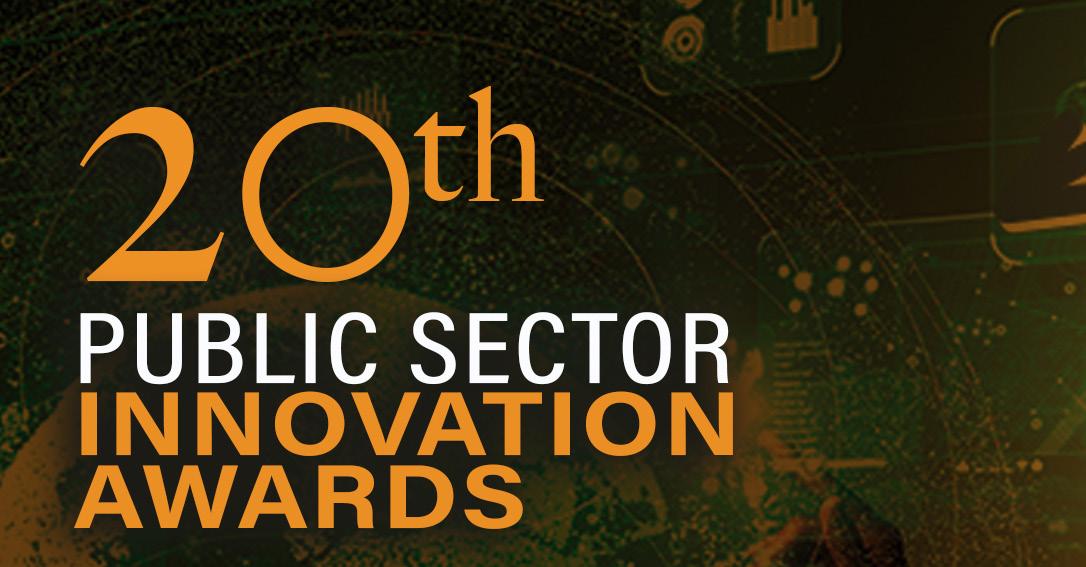
They also highlight the catalytic value of innovation in accelerating the delivery of services to improve the lives of citizens.
T he CPSI further advocates for capacity building in and adoption of 4IR and related fields - like Design Thinking in the Public Sector.
CONTACT
Tel: 012 683 2800 Fax: 012 643 0943 Web: www.cpsi.co.za

Address:
Batho Pele House, 546 Edmond Street, Arcardia, Pretoria
Incentivising and promoting innovation in the South African public sector that has improved service delivery and thus made a difference in the lives of citizens or improved the efficiency of the public sector.
Aimed at:
• government departments
• public entities
• municipalities
• public institutions
• and partners
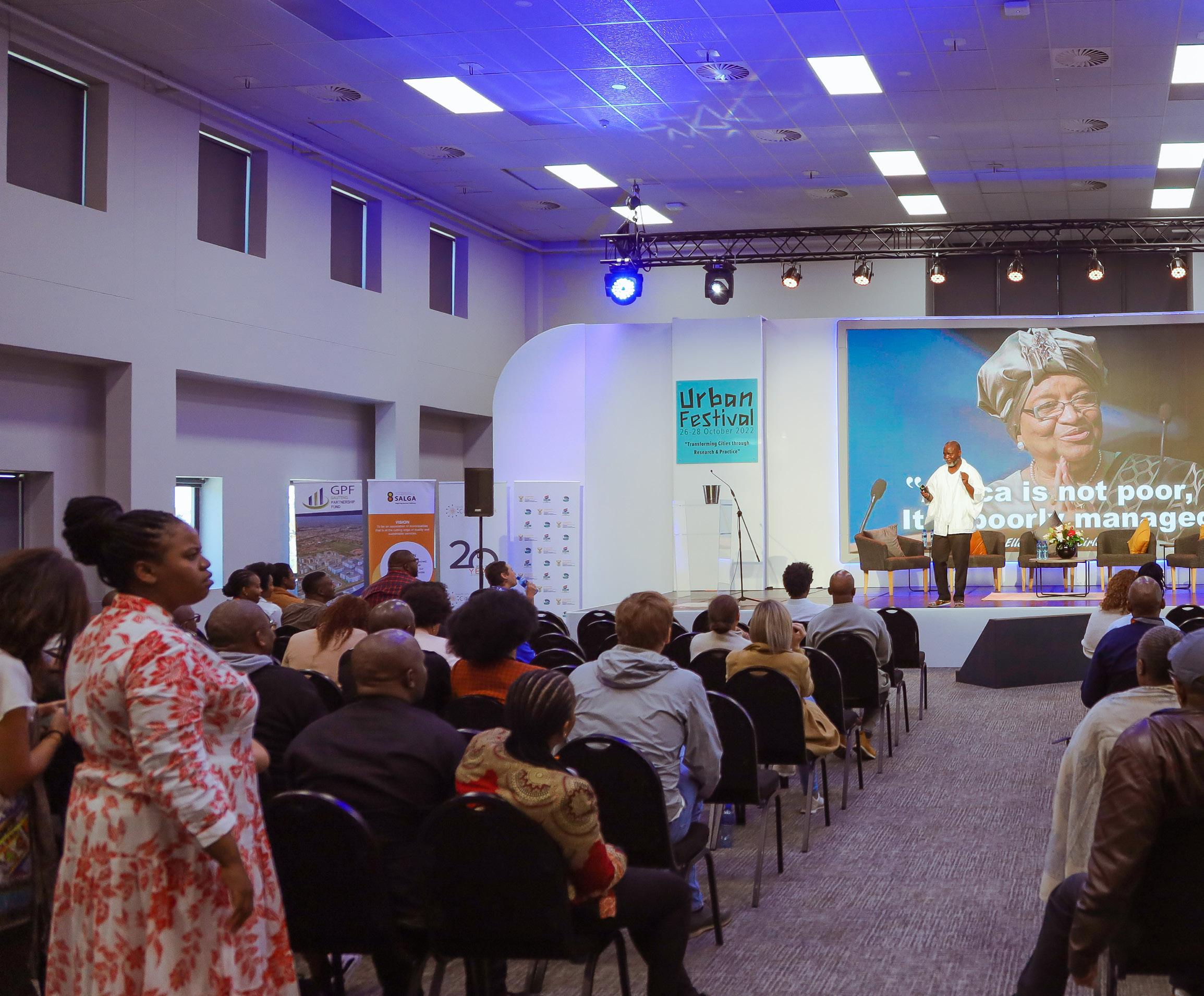
Today, more people than ever live in cities. Cities are spaces where people come together to share experiences and ideas and shape new systems. They are places of social, economic, and political opportunities and intense social interactions. In South Africa, where two-thirds of the population live in urban areas, cities are central to development and at the forefront of the country's economic, social, environmental, and cultural life.
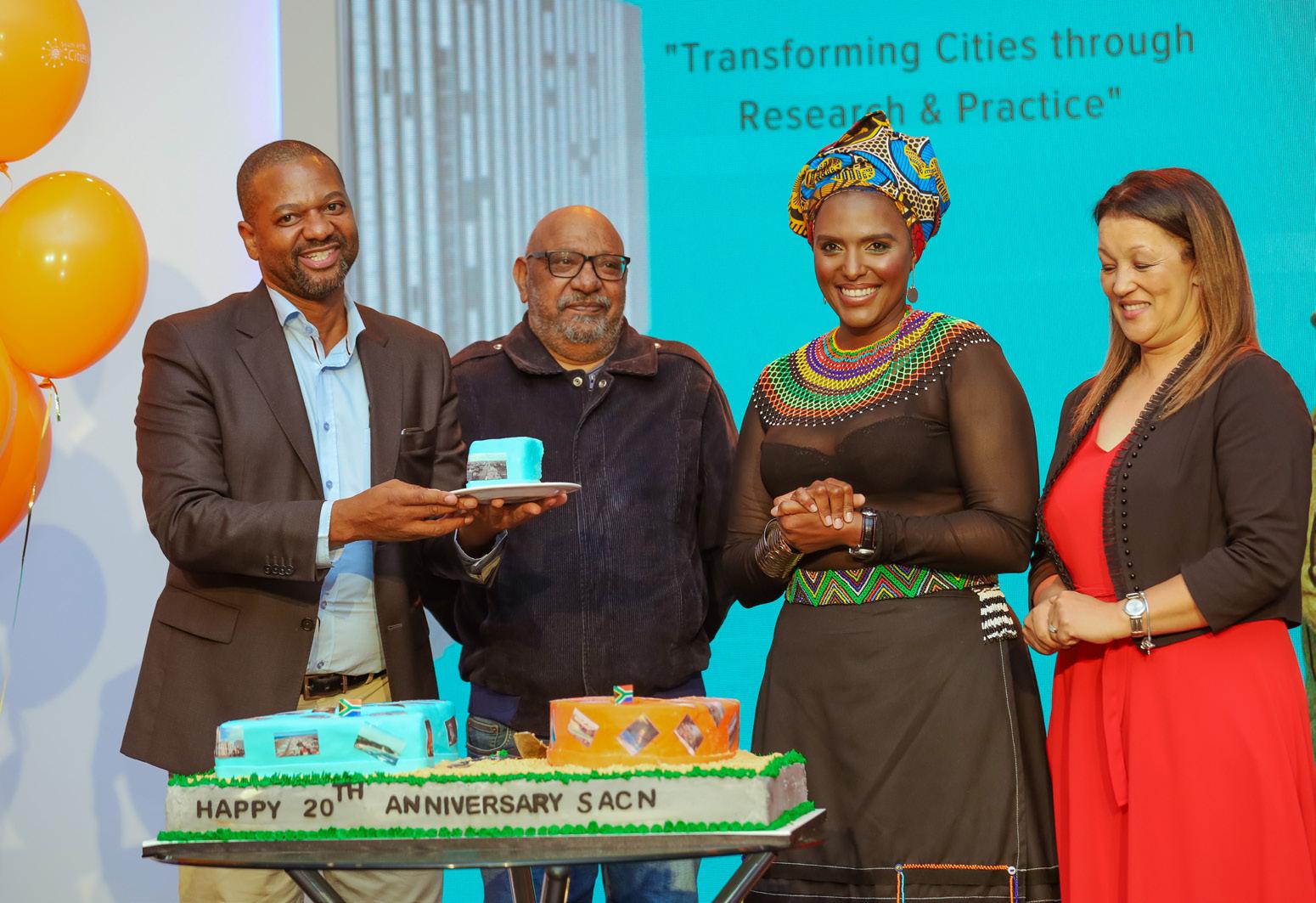
The Urban Festival 2022 hosted by the South African Cities Network (SACN) in Parktown Johannesburg, from 26 – 28 October addressed technocrats, policymakers, businesses, academia and civil society organisations on challenges facing cities. These discussions took place through several plenary sessions throughout the three days of the Urban Festival and were designed to trigger a conversation with a deliberate intention to collate valuable insights and solutions that will help us transform our cities to achieve inclusivity, sustainability, and productivity.
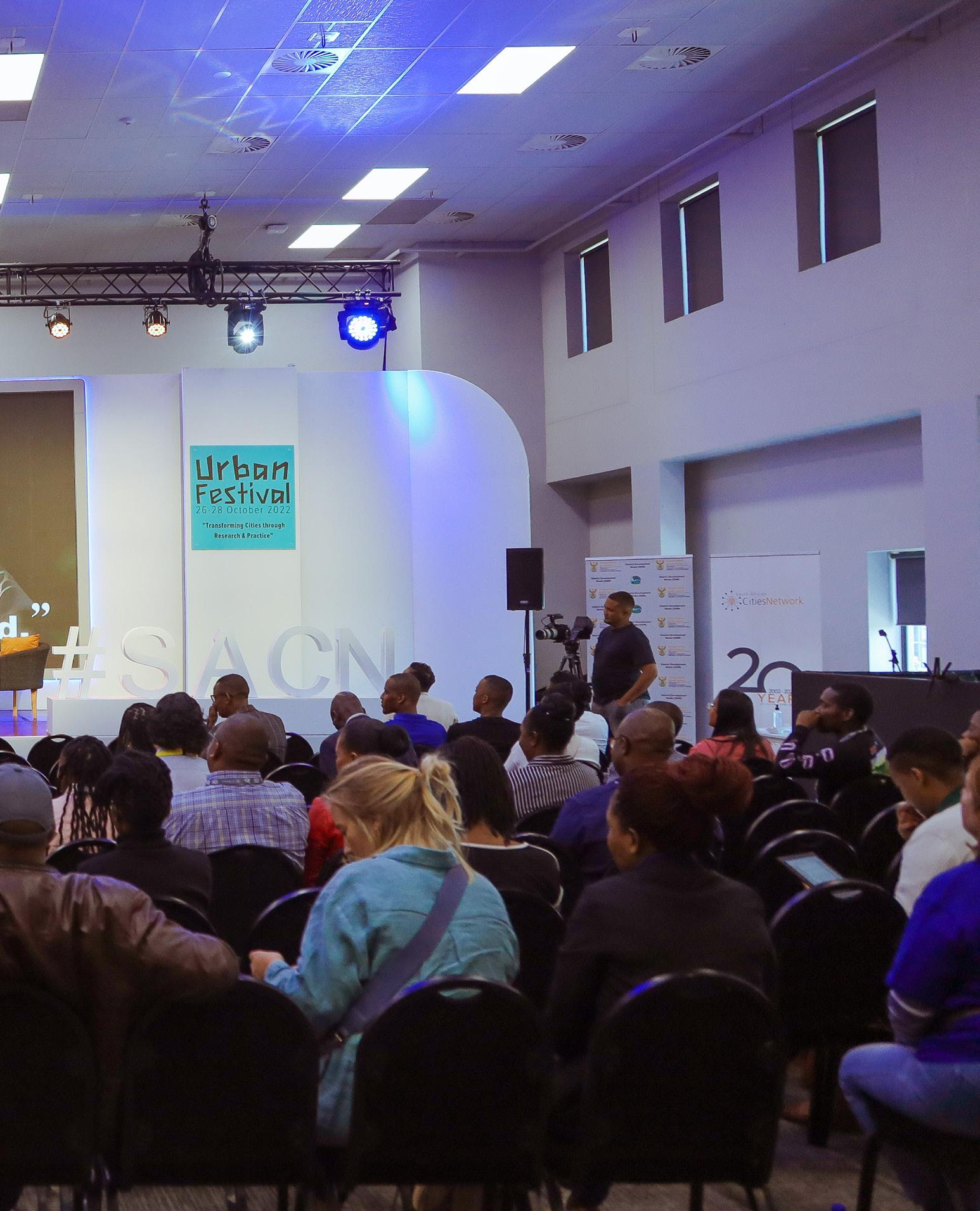
Urban October is an opportunity for people around the world to join the conversation about the challenges and opportunities created by the fast pace of change in our cities and towns.
The challenges facing cities offer an opportunity for improved collaboration and cooperation and for finding a different way of doing things. Such an opportunity requires everyone to unite around a common progressive agenda that prioritises inclusive economic growth, a closer relationship between nature and humanity, and accountable governance, where no one is left behind. The activations during the Urban Festival aim to influence the political agenda within local government.
Considering the new administration in our cities that has assumed leadership over the past few months; and is forging a new mandate committed to undoing the wrongs encountered in the last five terms of local government in South Africa. The key message they should convey in their work is the idea of local government as the true government of the people. >
This idea draws from the constitutional status of local government as the government sphere closest to the people and whose mandate remains to provide a democratic government for local communities, ensures services, and promotes social and economic development. To ensure the successful roll-out of this mandate, it is critical for our new local administration always to pledge their time, energies and their loyalties to the electorate that voted
them into leadership, and for that to happen, they would need to navigate themselves outside the sometimesnarrow political priorities successfully and to take cognisance of the bigger picture of local development and service delivery.
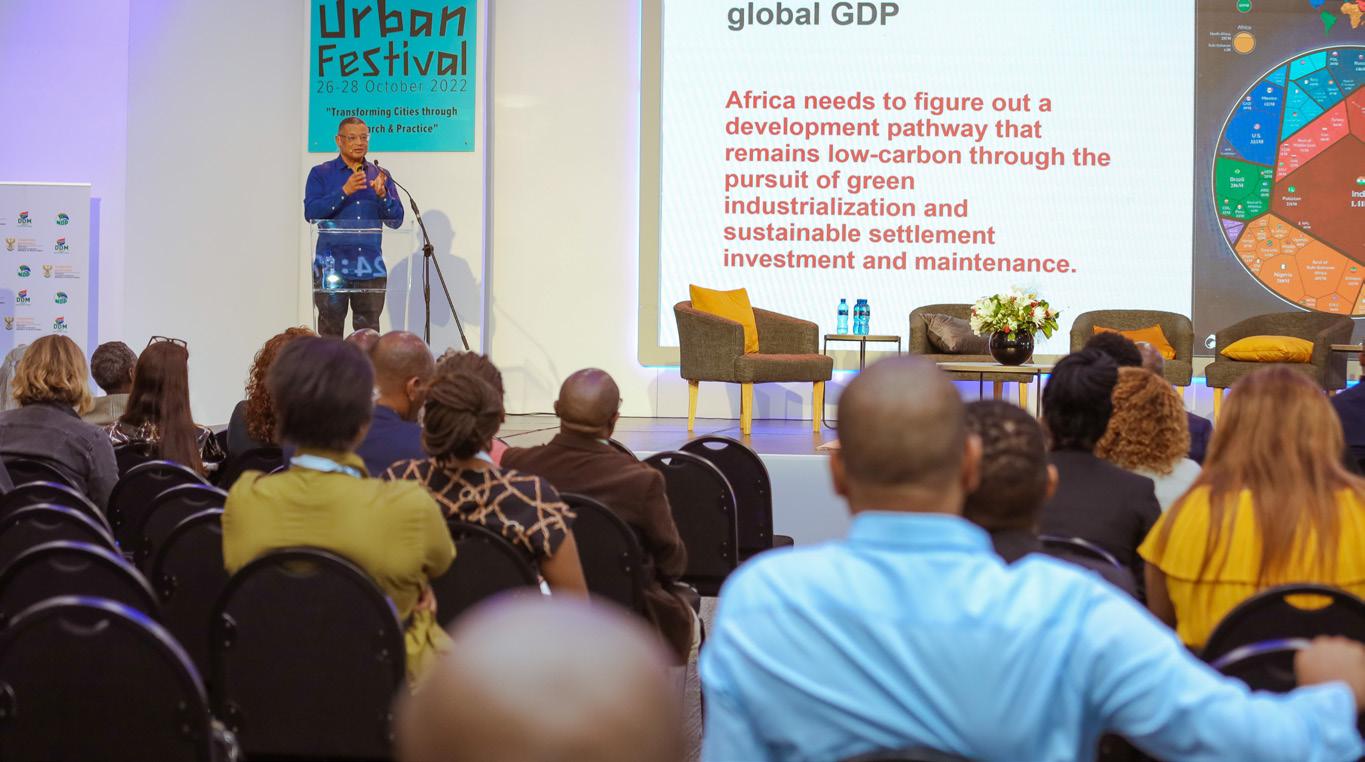
The South African Cities Network (SACN) was established to assist cities in navigating complex challenges through knowledge generation, dissemination

and facilitating shared learning among cities and partners. We set out a bold vision for the next ten years and an actionable strategic plan for the next five years to support cities. The new strategy aims to set clear and focused strategic objectives that enhance SACN's value offering to cities and make the organisation more effective, impactful, and relevant. Having reached its 20-year milestone, the SACN aims to continue a growth trajectory.
We would like to thank our partners, DCOGTA, SALGA and GPF for helping make The Urban Festival possible this year. The month of October is Urban Month, a period which concentrates on urban development programmes globally i.e., UN Habitat’s World Cities Day, which hosts a series of events for the whole month; National Transport Month; and World Urbanism/Town Planning Day, which was on the 8 November.
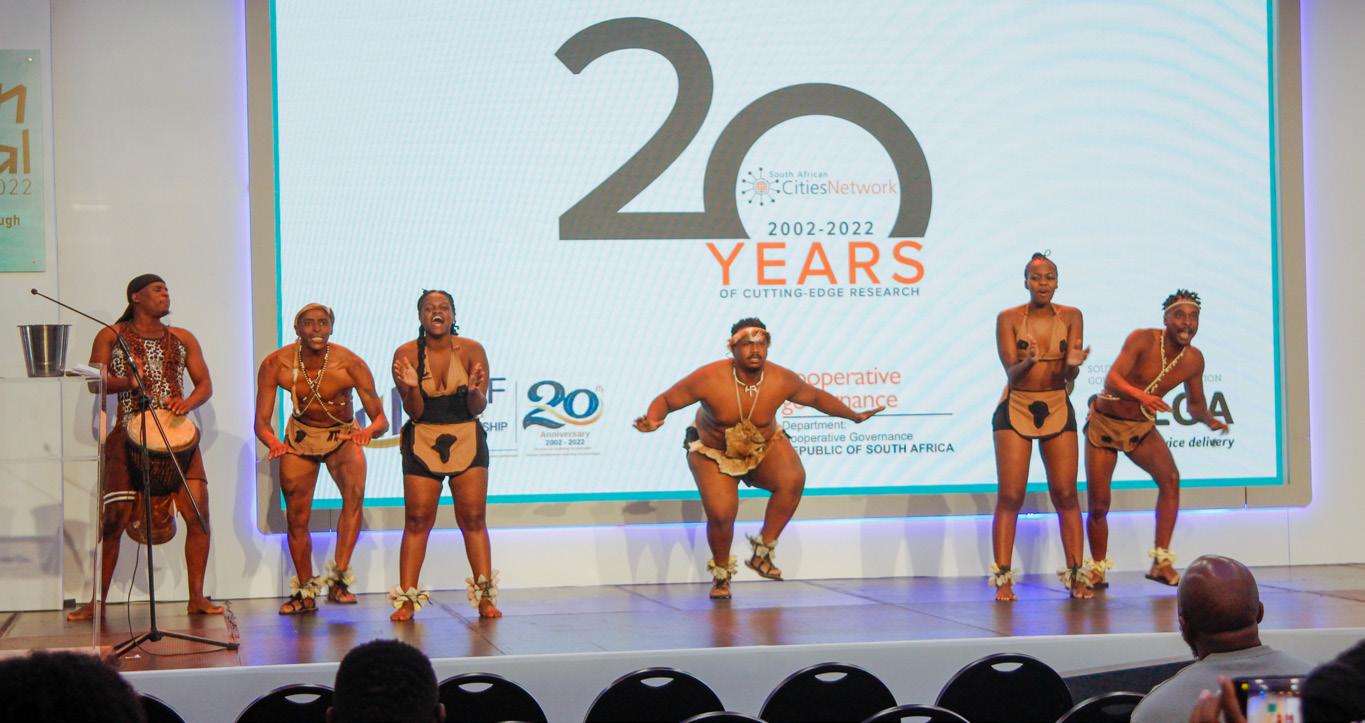
The Urban Festival has enabled the extension of conversation to a wider audience.
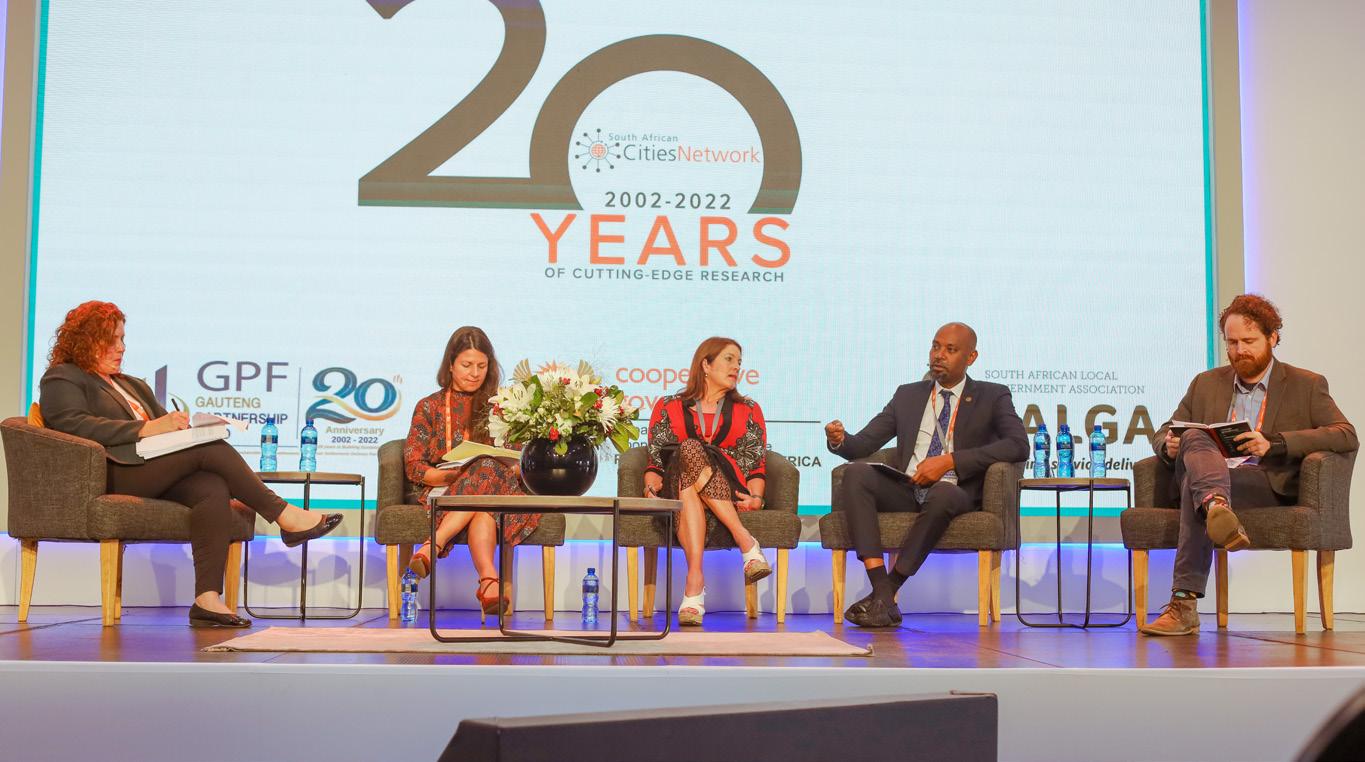
To view highlights of The Urban Festival 2022 please visit our website at https://www.sacities.net/ urban-festival-2022/
For more information about the Urban Festival 2022, press and interview requests, please contact:
Media Contact: LEBOGANG LECHUBA lebogang@sacities.net
Sponsorships and Partnership Queries: PHOLISA MAGQIBELO pholisa@sacities.net
Visit our website for more information at https://sacities.net/










Education, healthcare, and justice are three crucial cornerstones of effective governance. The importance of these pillars is echoed both in our own government’s 2030 National Development Plan (NDP) and in the globally accepted United Nations Sustainable Development Goals (SDGs). In shaping the NDP, government was guided by the idea of a ‘decent standard of living’, in which all South Africans have access to, among others, safe communities, quality education and effective healthcare. Similarly, SDG 3 calls for Good Health and Well-Being, SDG 4 drives the need for Quality Education, and SDG 16 promotes the importance of Peace, Justice, and Strong Institutions.
“Helping government digitally transform its operations for quicker, more streamlined administration and service delivery is essential for ensuring all South Africans have access to these three cornerstones,” says William Mzimba, Chief Officer of Vodacom Business. “This transformation is part of Vodacom’s own purpose-led journey to connect all for a better future in an inclusive digital society.”
Vodacom’s partnership with government is long-standing, with National Treasury continuing the telco’s 2016 mobile communication services contract for another five years in 2021. “Through this collaboration, we’ve helped government become future-ready in pursuit of its goals to bring a decent standard of living to all citizens,” highlights Mzimba.
Digitising isn’t only about connecting things, but also about connecting people and streamlining processes. This is where mobile platforms like the mySAPS app are key. The app, developed by Vodacom Business in partnership with the South African Police Service (SAPS), enables citizens to search for the nearest police station, submit a tip-off, and call a crimestop number, all in real-time.
“Mobile technology like this has really helped to actively engage members of the community in a collective effort with the SAPS to clamp down on crime,” notes Mzimba. “Since the launch of mySAPS in
2019, the app has gathered momentum, with over 6 700 tip-offs shared by over 124 000 active app users.”
Just as it proven useful in law-enforcement efforts, mobile technology has been effectively leveraged as a solution for improving critical access to healthcare in Gauteng. This solution came in the form of Mpilo, a healthcare app launched in 2019 by Vodacom Business in partnership with the Gauteng Department of Health. It’s a smart and interactive platform that allows users to report several issues that could impact quality of service, from waiting times in facilities, to safety issues, staff attitudes, and facility cleanliness.
Recently, this popular app was updated to include an ambulance-request capability available to users in emergency situations, with Mpilo accurately detecting users' geolocation. “We also integrated our Fleet Management solution into the Health Department’s ambulance service, making it easier to digitally locate and assign ambulances for faster response times that could save lives,” adds Mzimba.
Aside from public-facing uses, apps can also strengthen stock-level monitoring and administration by healthcare facilities to deliver greater efficiency and medicationdispensing responses. The secure, cloud-based Stock Visibility Solution (SVS) by Vodacom Business provides real-time access to healthcare facilities on stocklevel information from their medicine dispensaries. This allows low-stock clinics to be proactively replenished and out-ofstock facilities to receive priority attention, ensuring that patient care isn’t delayed. Since the SVS rollout in 2014, 14 million stock updates have been made by 3 260 public health facilities, highlighting the need for such a solution.
In 2020, with the pandemic forcing education to be taken online, Stats SA highlighted an alarming statistic: only 11,7% of schools were offering remote learning. Clearly, this put a huge number of learners at a disadvantage, with many
dropping out of schooling or falling behind, which disproportionately affected those from rural communities. “While the pandemic shone a spotlight on the digital divide, the gap between online haves and have-nots already existed, and will continue to grow unless measures are put in place,” stresses Mzimba. “Our purpose is to connect everyone is incredibly important in the education arena: our economy depends on our youth being equipped for a digital-first future.”
In partnership with the Department of Basic Education, Vodacom Business tackled this digital divide within six rural schools across three provinces at the start of the year. The partnership saw the implementation of the Virtual Classroom Solution, which entails setting up Wi-Fi at schools over a secure cloud-based SD-WAN network, providing students and educators with devices, and training educators to ensure learners benefit from the newly enabled connectivity. “These classrooms of the future will democratise access to education, while equipping learners with the necessary digital literacy and skills for future jobs,” adds Mzimba.
“Leveraging the power of technology to digitally transform the way we deliver services and meet citizen needs will unlock greater efficiency and effectiveness,” Mzimba concludes. “At Vodacom, we’re acutely aware of the transformative power of the digital world and will continue to uplift society through it. This collaboration with government is one example of the many applications of mobile technology, and its ability to drive the decent standard of living we all deserve.”
Tel: 011 653 5000 Web: www.vodacombusiness.co.za or contact your account manager
Address: 082 Vodacom Boulevard, Midrand, 1685



Force4Techology provides valuable insights to Accounting Officers, CFOs, Auditors and Municipal Managers on improving the submission of the Financial Management Capability Maturity Model (FMCMM) assessments and the Audit Action Plans to Provincial and National Treasuries. The impact of which are covered in the recently published MFMA Circulars 113 and 114. These tools, the Audit Action Plans, FMCMM, and Financial Ratios were developed by the MFMA Implementation Unit at National Treasury, and the web-enablement architecture was designed by the
Force4Technology, which was sponsored by international funders. Force4Technology was tasked with the digital transformation of the Microsoft Excel-based assessments into a web-enabled platform.
This milestone ushers-in a new digital era in financial management enabling adherence to the MFMA with a modernised approach saving time and simplifying the assessment processes to determine potential gaps within an institute’s financial management system. The foundation is built on an integrated platform that allows all relevant stakeholders from local municipalities, municipal entities, Provincial Treasuries to National Treasury to participate.
The recently published MFMA Circulars 113 and 114 issued by National Treasury have a clear intent: utilization of the new web-enabled tools is of paramount importance. The web platform has been created where municipalities can undertake financial management online assessments, upload results and extract user-friendly reports.
Furthermore, the platform includes the web-based financial ratio templates for pre-audited, audited, restated outcomes and future projections which occur yearly, and an action plan monitoring system based on the results from the FMCMM and financial ratios specifically on the areas where the responses to questions are in the negative or outside the norm.
Municipalities are required to utilize the new web-enabled tools to their advantage to improve their respective financial management performance. Training of all public officials especially at municipal level must be the top priority if we want to progress as a country. The positive and far-reaching impact of these tools cannot be overstated but it >
“The web-enabled platform is a game changer from the current mode of engagement ensuring greater transparency and accountability. The platform enables better collaboration and communication between all parties,” says Thiloshnee Sukdeo, Director, MFMA Implementation – National Treasury
will require a collective effort by all to reap the benefits of the platform across all 3 spheres of government. The prevailing methods of completing & submitting financial assessments via Microsoft Excel and emails or couriering spreadsheets on flashdrives to National Treasury will soon be a distant memory!
Despite the prevailing situation, we all have a responsibility to envision a brighter future in the areas of fiscal management in municipalities of which directly affects service delivery to citizens.
We offer Training and Support for you to gain professional handson experience in the usage of the web-enabled Audit Action Plan and FMCCCM tools.
Our Public Sector Practice have successfully delivered on many digitalization projects. Whether it’s manual, paper-based processes or process automation, our highly experienced team can assist you on your digital transformation

journey with the aim of delivering world-class solutions in alignment with your strategy. Our advisory services ensures your return on investment is achieved through industry-recognised best practices.
We help you answer important questions such as “What is our technology capable of, and how can we adapt our organization and processes to make the most of our technology investments? We utilize the latest cutting-edge technologies such as Artificial Intelligence (AI), Machine Learning (ML), Natural Language Processing (NLP) and Data Analytics to take service delivery to the next level in the public sector with citizens at centre stage.
In our engagements with municipalities, the Internal Audit Action Plans are generally controlled by manually-driven processes. Force4Technology can directly add-value to efficiently manage the Internal Audit Action Plan by provisioning a world-class solution to digitally transform the manual processes into a robust, user-friendly, and secured web-enabled platform.
Force4Technology is a professional services company comprising six areas of business: Strategic IT Solutions, Applications Development, Mobile Development, Business Intelligence, Systems Integration and Training. We are at the forefront driving innovation to improve the way organizations work. We provide a broad range of services and solutions. We help organisations to reinvent themselves. We inspire them to imagine grand futures through implementing transformational outcomes for a demanding new digital world.
Tel: 041 451 0811 Website: www.force4technology.com Address: 1st Floor, RKA Industrial Park 4, Bedford Street, Korsten Nelson Mandela Bay, 6020

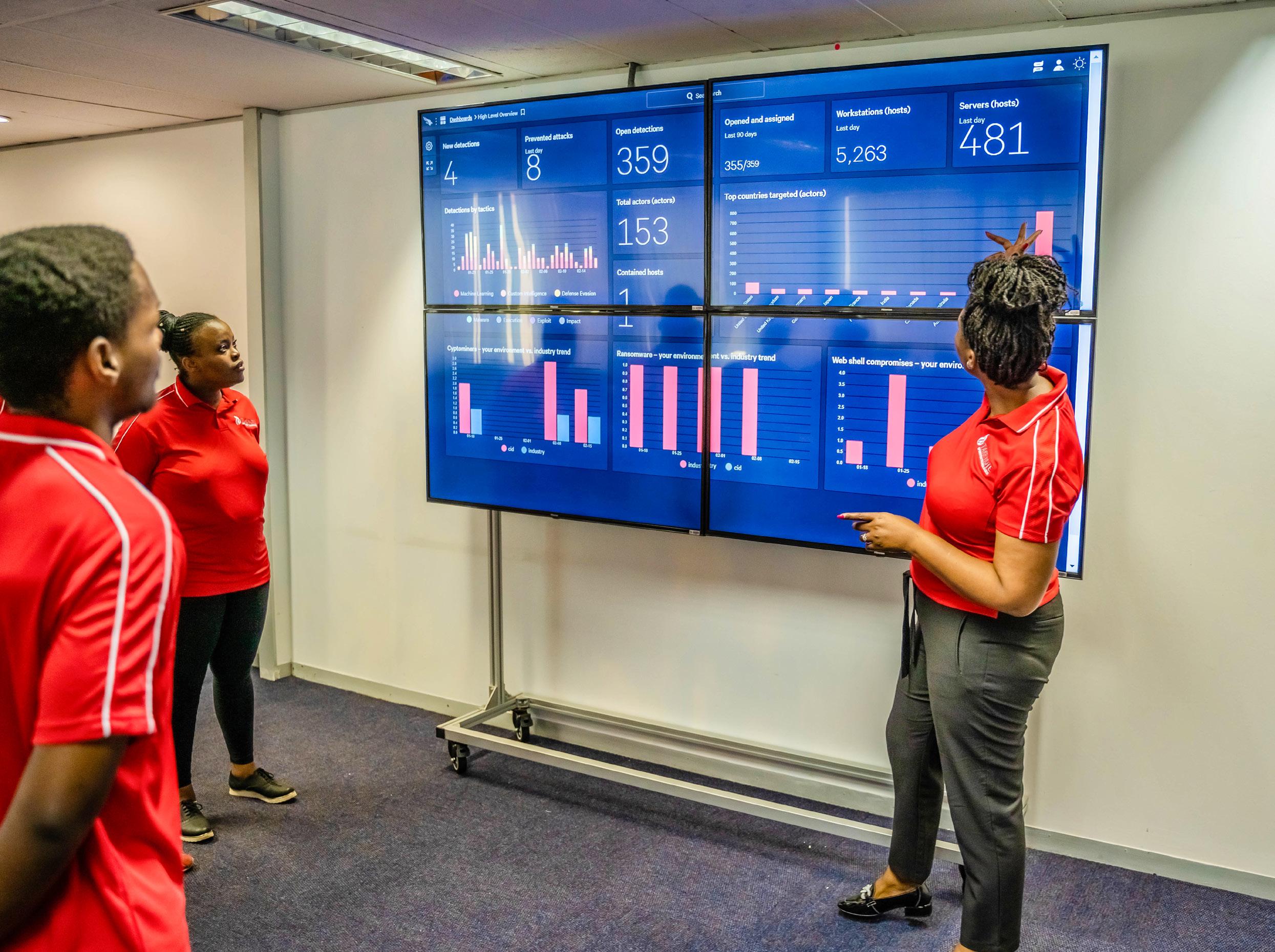
management, service delivery and value creation remain at the centre. Professionals continue to advance the challenging task of balancing and linking reporting standards with service delivery, an important consideration as they manage scarce resources.
On 10 October 2022, the South African Institute of Chartered Accountants (SAICA) and the Chartered Institute of Government Finance Audit and Risk Officers (CIGFARO) signed a renewed Memorandum of Understanding (MoU), to recommit to making a greater impact on the public sector for the benefit of all South African citizens.
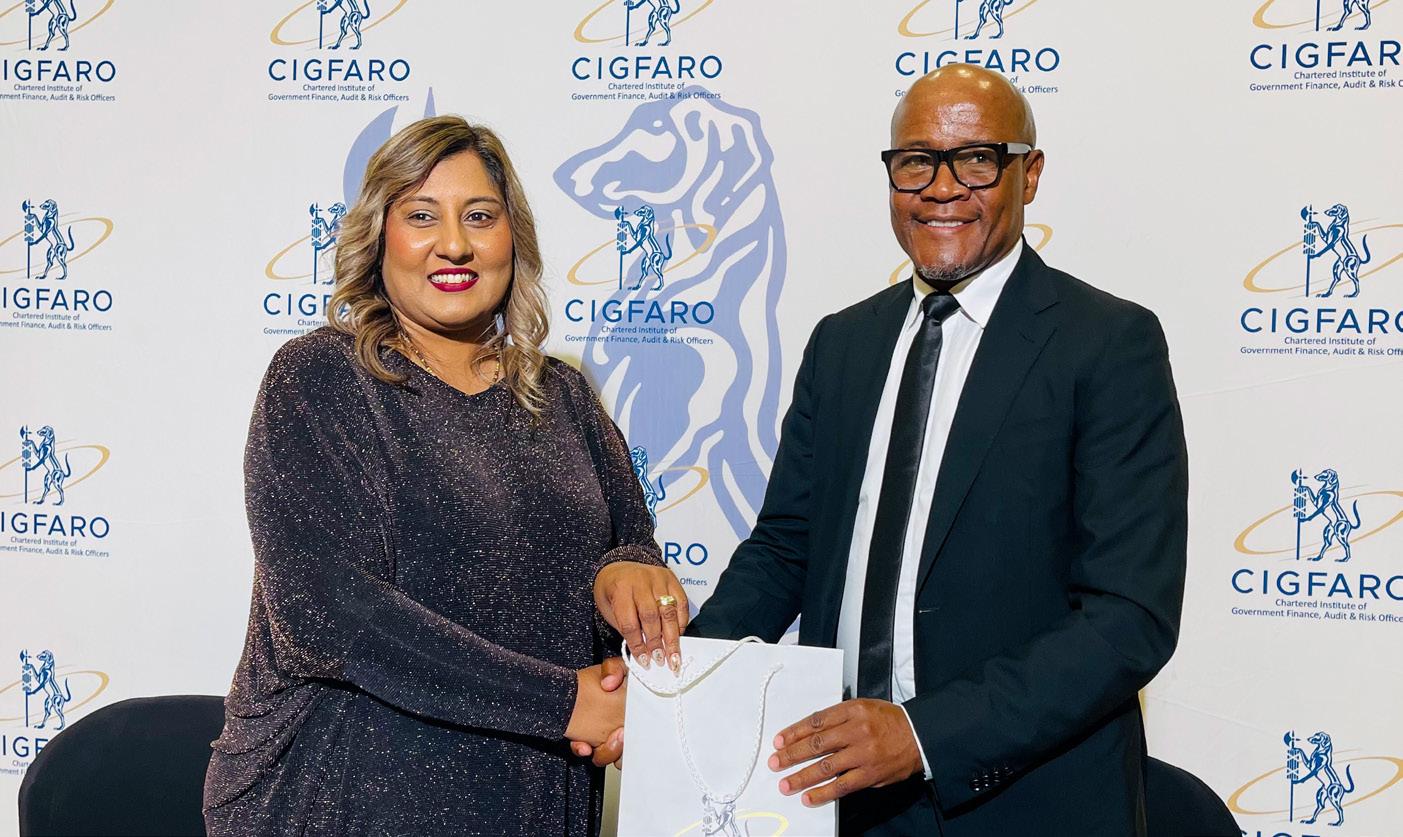
The signing of this MoU will see the realisation of a more collaborative approach for the benefit of the membership and the public sector. The institutes will use their strengths and specialised knowledge (including that of their members) to expand their reach, provide support and enhance professional development, and collaborate on advocacy initiatives that improve the work of the public sector. The strategic partnership will also contribute to professionalising public service and other government initiatives that will assist with ongoing improvements in the profession. This MoU paves the way for both institutes’ members to access courses, seminars, training, and events hosted by either
institute. Welcoming the signing of the MoU, Freeman Nomvalo, CEO at SAICA stated that such a collaboration would lead to several synergies being realised, and the redirection of resources towards other initiatives in the public interest.
“If you are a finance professional in a municipality or government department, you serve an important role in ensuring that people receive services. As the institutes sign this MoU, they commit to working together to ensure that members are supported, willing, able, and capable of doing their work accordingly,” explained Nomvalo.
Ms Cheryl Reddy, the President of CIGFARO, emphasised that public finance professionals combine complex accountancy and reporting requirements, the need to deliver services, rigorous and extensive legislative requirements, political and at times difficult operating environments in order to deliver on their mandate to serve the public.
While the profession is responsible for the implementation of the best available standards and practices in public finance
Through their work, professionals enable transparency and accountability, and are fundamental to the creation of sustainable value by government through effective stewardship of public finances. Nomvalo emphasised the notion that the information provided by professionals is not because thereis a standard that requires its presentation and disclosure, but because the information is important for decision making and serving people.
“The concept of 'a clean audit’ was coined precisely because the profession cares about the impact it has on people and understands the important role it can play in enabling this. The significant role of reliable reporting and clean administration should enhance the mandate of serving society, not take away from it,” says Nomvalo.
Professionals have a responsibility not only to act ethically and in the public interest but also to influence the entirety of the public service to adopt this mandate and to contribute to the professionalisation of the public service. As a dynamic and wellestablished profession, the accountancy profession is well-positioned to use its wealth of knowledge and experience to advance the professionalisation of public service.
A professionalised public service would not only create a conducive environment for professionals to operate, but also revolutionise service delivery to citizens.
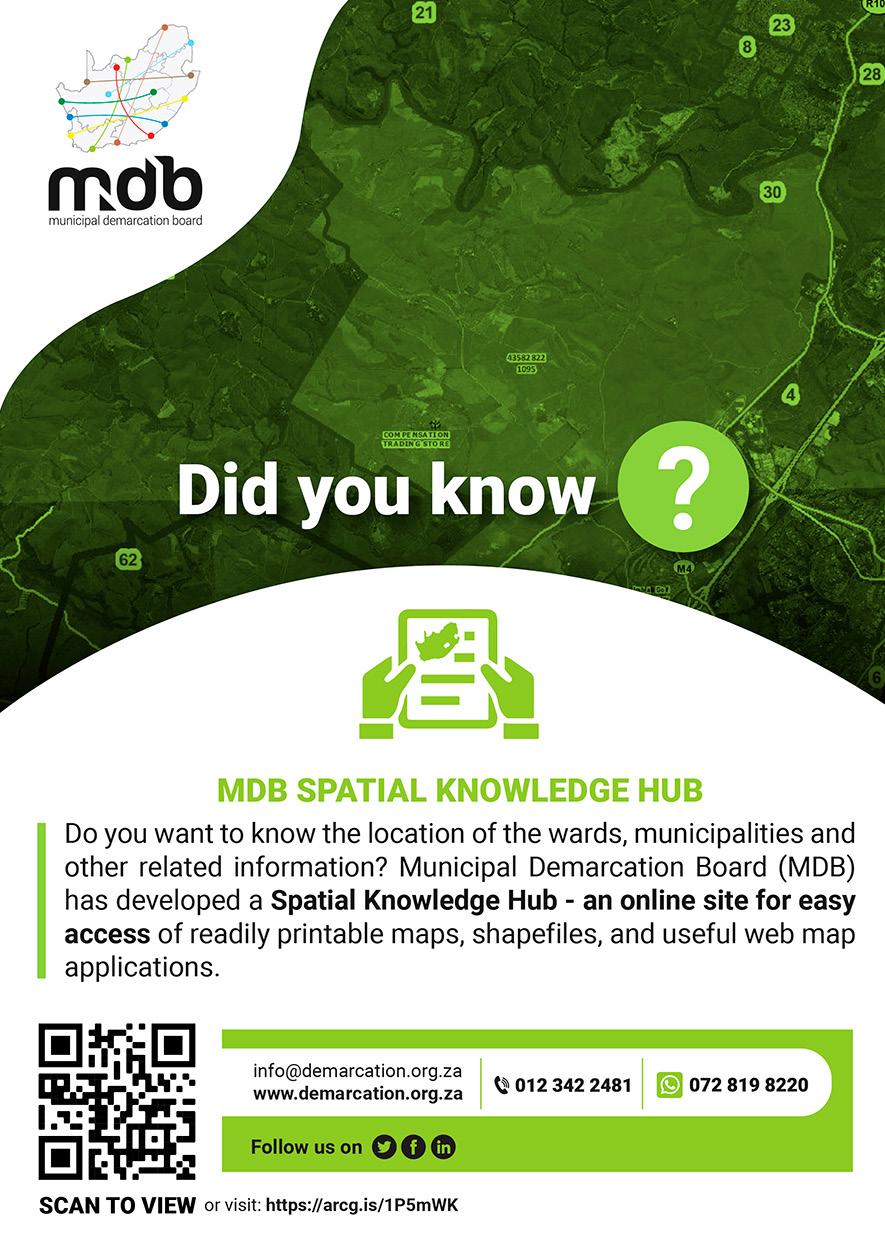
CLASS 2, Consolidation and Annexations-
This is a medium scale boundary redetermination that may impact on a sizable geographic area, and number of voters in one or all the municipalities affected. This type of determination may impact on ward arrangements but will not materially impact on the capacities of the affected municipalities to deliver services.
CLASS 3, Amalgamations-
This type of re-determination entails a major and large scale municipal boundary re-determination which will have a significant impact on the geographic areas, the number of voters, and the capacities of the affected municipalities, the redetermination includes the merging of adjacent municipalities or the splitting of municipal areas to create other municipal areas.
CLASS 4, Categorization-
The MDB is currently implementing the municipal outer boundary process. The determination of municipal boundaries has been a recurrent feature every 5 years before the National Elections.
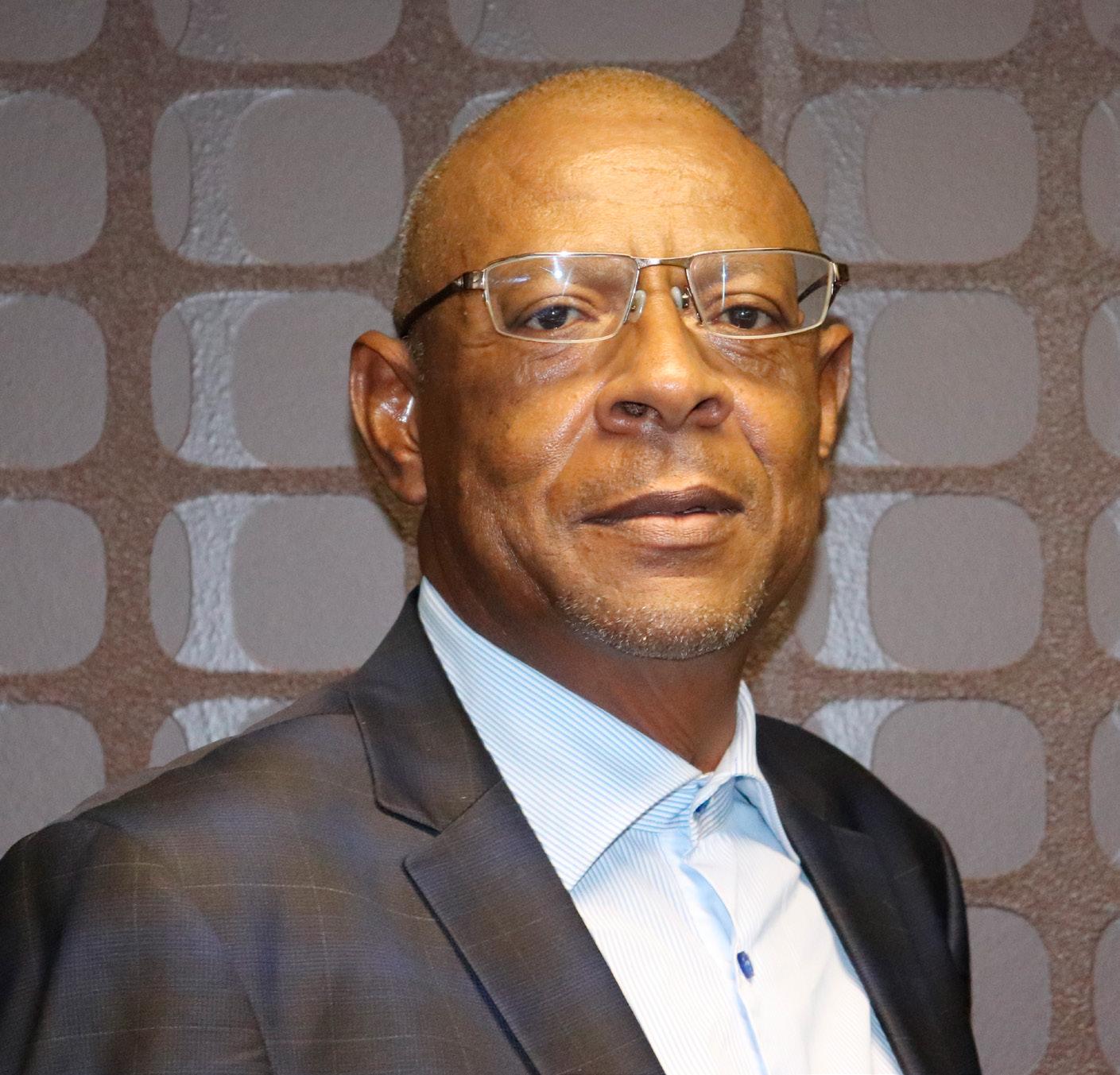
The MDB opened the outer boundary redetermination process for proposals immediately after the Local Government Elections in November 2021. The period for the public to submit proposals opened in November 2021 and closed on 31 March 2022. Proposals submitted must be motivated in terms of section 24 and 25 of the Municipal Demarcation Act (MDA) and
section 2 of the Municipal Structures Act (MSA) for re-categorization of municipalities.
The proposals received are currently being analysed and will be placed in the following classes for further processing:
CLASS 1, Technical and minor boundary re-determinationsThis re-determination entails a smallscale boundary adjustment and alignment with a minor impact on the geographic area, a negligible or no impact on the number of voters and no impact on the capacity of the effected municipalities.
This is a type of re-determination that involves the categorisation of any new Category A Metropolitan, Category C District and Category B Local municipalities with or without boundary changes; Category A must satisfy Section 2 of the MSA and Section 24 and 25 of the Act respectively; the Board will categorise an area that qualify to be a category A municipalities after consultation with National Minister responsible for local government, the MEC for local government in the provinces concerned, and South African Local Government Association (SALGA).
Updates on the process can be obtained on the MDB website, www.demarcation.org.za
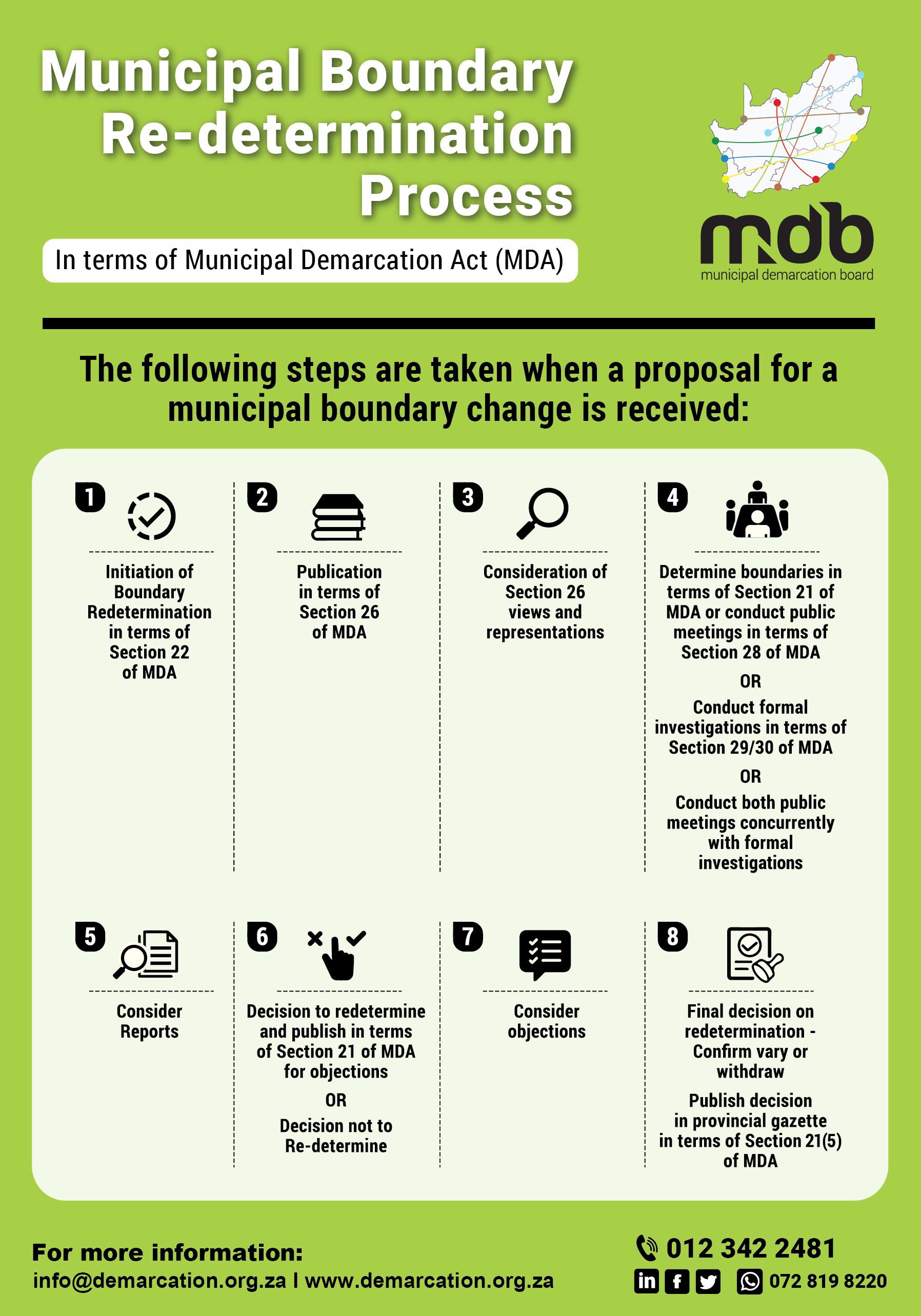

The Council for Scientific and Industrial Research (CSIR), which strives to help grow the SA economy through leading innovation and finding knowledge solutions, has achieved 81% of its targets in the last financial year.
This was revealed by the CSIR’s Chief Executive Officer, Dr Thulani Dlamini, when he recently presented the organisation’s annual report for the 2021/2022 financial year.
The achievement came despite operating in an environment where most initiatives and programmes in various industries have been negatively impacted by the effects of the Covid-19 pandemic.
The CSIR, a national research organisation which was established in terms of the Scientific Research Council Act (No. 33 of 1945) of the Parliament of the Union of South Africa, is a world-class African research and development organisation that undertakes directed, multidisciplinary research and technological innovation that contributes to the improved quality of life of South Africans.

In 2019, the organisation adopted a new strategy which is aimed at supporting industrial development in the country and to ensure that it makes a greater impact when building and growing industries in the South African economy.
Five key strategic objectives:
Dlamini announced how the CSIR has managed to score achievements in its key five strategic objectives despite operating in a difficult environment due to the pandemic.
The five strategic objectives include:
• Conducting research, development and innovation of transformative technologies and accelerate their diffusion;
• Improving the competitiveness of high-impact industries to support South Africa’s re-industrialisation by collaboratively developing, localising and implementing technology;
• Driving the socio-economic transformation through Research, Development & Innovation (RD&I) which supports the development of a capable state;
• Building and transforming human capital and infrastructure; and
• Diversifying income, maintaining financial sustainability and good governance.
that the CSIR has helped to localise.
“Here we talk about work where technologies solutions that were imported in the past but now get produced locally in South Africa,” Dlamini said.
He also stated that joint technology agreements that have been signed with industry show a steady increase in terms of the contribution made by the CSIR with 25 agreements signed in the last financial year.
Dlamini said though their support to Small, Medium and Micro Enterprises (SMMEs) saw a slight decrease in the last three years, the organisation is now beginning to see an increase in the number of SMMEs that are now being supported.
The CSIR saw a major advancement on strategic objective number two relating to improving the competitiveness of high-impact industries to support South Africa’s re-industrialisation by collaboratively developing, localising and implementing technology. The organisation scored an impressive 100% achievement of targets set.
This was an improvement considering that in the 2020/21 financial year, on this objective, the organisation had achieved a 67% achievement. Dlamini stated that there has been a steady increase in the technologies
On the strategic objective number three, which speaks about driving the socio-economic transformation through research, development and innovation which supports the development of a capable state, the CSIR also outdid itself by achieving 100% of the targets set for this objective.
Dlamini said the work that the CSIR has done in the past year showed its relevance in supporting various government initiatives and has seen a “significant increase” in terms of the organisation’s contribution in helping to create a capable state.
Speaking on the CSIR’s national response during Covid-19 Dlamini said that the CSIR partnered with the Department of Health and played an integral role in the development of the digital Covid-19 vaccination certificate.
“There has been a positive trajectory in terms of the percentage of the set base which is black and as well as the percentage of the set base which is female,” Dlamini said.
On the fourth strategic objective which speaks to building and transforming human capital and infrastructure, the organisation scored 75% of its targets.
“One of the issues that we had to address is to grow the set base in the organisation as a result of the decline we saw when we implemented our new strategy. There’s a very positive trajectory in terms of the set base within the CSIR,” Dlamini said. He stated that they have improved or retained their performance with regards to transformation within the organisation and that the CSIR now appoints 2200 employees of which 78% are black and 38% female, after having added 118 new employees in the last financial year.
Dlamini said they have to come up with strategic and creative ways in an attempt to hold on to and increase the number of highly sought-after chief researchers. He said that holding on to this cohort of colleagues is a struggle because they are very attractive to higher education institutions as well as the private sector. “It’s a very competitive space, you are competing with the private sector which can offer financial incentives which we cannot compete with being a public research organisation,” Dlamini said. Despite this the CSIR has managed to increase these
numbers over the last financial year. He said beyond the financial incentives, the CSIR offers other benefits which speak to career growth, personal development and other opportunities that the organisation tries to make available to its scientists including building their profiles as researchers.
“We try to create an environment that will try to make us attractive to the researchers and the scientists that we have beyond financial benefits. In an environment like ours, it also affords researchers the opportunity to think creatively as they are not confined. We leave it up to the researcher’s themselves to define which areas of research they wish to pursue as long as it’s aligned with our strategy,” Dlamini said.
He said the CSIR regards its cohort of principal and chief researchers as an important indicator of its capacity to fulfil its mandate and retain its status as a distinguished research organisation on the African continent.
Dlamini said in 2021, they proudly welcomed the advancement of five new chief researchers with two of them being black South African, and a total of 28 principal researchers with 17 being black and 10 being female South Africans. Nine black South
Africans are currently being supported for chief researcher positions under this programme which seeks to ensure that chief researchers are being continuously produced.
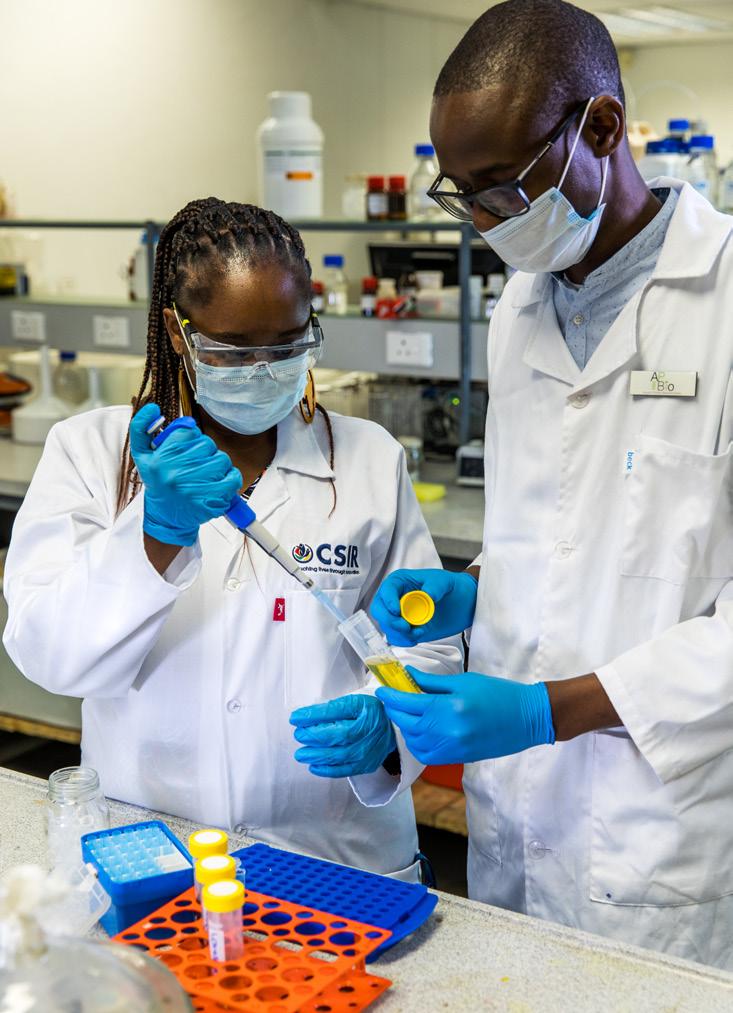

Dlamini stated that the CSIR saw a decline in strategic objective number 1 related to conducting research, the development and innovation of transformative technology and accelerating their diffusion. The organisation achieved 60% of its targets which reflected a drop from an impressive 80% achieved in the 2020/2021 financial year.
“If you look at the number of patents granted, this shows a slight decrease over the past three years with an increase in 2021. We find that this figure in terms of patents is a very different number to project because this is, to a large extent, a result of what sits in the pipeline in terms of priority patents we’ve filed in previous years,” Dlamini said, while adding that they have very little control in terms of when the patents get granted in various jurisdictions.
Dlamini said in terms of licence agreements signed with the CSIR’s partners in the last three years, a 140% growth has been recorded in the period. “This is work where we are licensing the intellectual
property produced by the CSIR for commercial exploitation with our partners. Again, this is an indication of the contribution that we are making in terms of supporting the creation of new enterprises or the sustainability of existing enterprises,” Dlamini said.
On the objective that speaks to diversifying income and maintaining financial sustainability and good governance, Dlamini said that despite income decreases during Covid-19, the organisation has started to recover and among others, recorded a 50% growth in international income over the past three years.
He said the organisation is now in a very strong financial position with income from the private sector also growing by 32%. The CSIR receives 25% of its funding from the state and generates the rest from other income streams. “These two (income streams) are a very good indicator of the realization of our strategy in terms of our focus on industrial development,” Dlamini said.
Other executives also highlighted some of the achievements of the CSIR in various fields and sectors including agriculture, defence and mining, among others.
CSIR Group Executive: Advanced Production and Security, Dr Motodi Maserumule, spoke about the 3D modelling technology which is being introduced in mining to minimise harm to miners to zero.
He said they have developed “a digital twin to simulate and optimise trackless mobile machinery operations as well as the design and configuration of collision avoidance systems in mines.”
Maserumule added that the CSIR has developed a custom, handheld fingerprint device to assist the Department of Correctional Services (DCS) with offender recognition and that this will be able to assist the department in tracking the offenders through the system.
He said the device with its novel fingerprint imaging technology is able to ensure, among other things, ease of verification of an offender between conviction in court, admission to a correctional facility and other rollcall activities during confinement.
Dr Rachel Chikwamba, CSIR Group Executive for Advanced Chemistry and Life Sciences, spoke about initiatives that the organisation was involved in, including the detection of diseases in

the aquaculture industry. Chikwamba said the aquaculture industry is an emerging industry that is vital as alternative sources of proteins are being sought in rural communities.
The CSIR has already done work with the CSIR Water Institute in Ghana in which field trials were conducted to detect pathogens that affect the continent’s aquaculture.
“What we are trying to do is to develop a method, at the site of work where you do the aquaculture, to be able to detect if you’ve got a disease in your water and you are able to take control measures before your whole crop is lost or destroyed,” Chikwamba said.
She said linked to the field trials is work that is being done in an effort to find vaccines that could be delivered to support aquaculture.
Chikwamba spoke of a partnership with FarmSol Holdings, a South African Breweries partner and agricultural services company, that has seeded 982 emerging farmers across nine provinces, to deploy the fourth industrial revolution technologies to transform its maize farming extension services by using unmanned aerial vehicles, satellite technologies and big data analytics.
Dlamini said the positive performance that the CSIR had over the past year gives them confidence that the organisation is well on track to achieve its objective of supporting the creation of a very capable state and supporting industrial development.
Tel:
841 2911
Limpopo’s newly appointed MEC for Economic Development Environment and Tourism Rodgers Monama, in his first interaction with Limpopo Economic Development Agency, promised that his department would be steadfast at changing the status of the provincial economy and improving the development of Small Medium Enterprises and Cooperatives.
A few days after assuming office, Monama visited all the department’s parastatals (Limpopo Gambling Board, Limpopo Tourism Agency, Limpopo Economic Development Agency, Great North Transport and Limpopo Connexion) and emphasized mainly on the issue of ‘working together’ for the benefit of the people of Limpopo.
He said his department, is faced with a mammoth task of creating employment and reducing poverty in the Limpopo Province, and his immediate challenge is to respond effectively to the province’s economic situation.
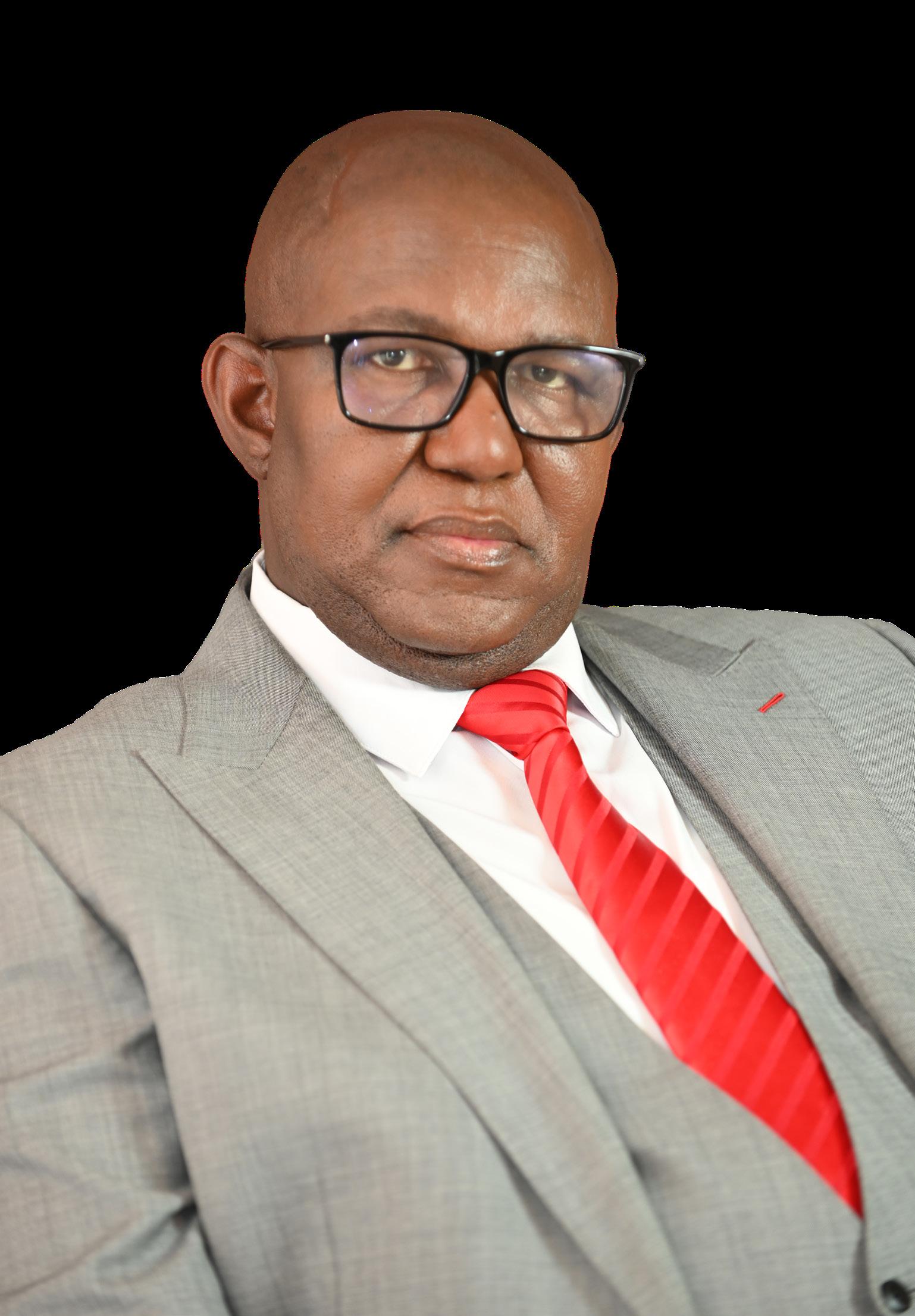
Monama is a seasoned politician who served in different portfolios at the Legislature, including chairing the Standing Committee on Public Accounts. He said he was grateful to be part of a committed and enthusiastic team that is focused on bringing economic stability to the province of Limpopo.
He further promised to confront the profound economic challenges with compassion and lead a department on issues of accountability and integrity.
The appointment of Monama came at the time when the national economy is on a recovery course due to the Covid-19 pandemic which has been extremely disruptive, unpleasant, and aggressive to our economy.
Nevertheless, Monama is confident that he will carry out his duties diligently and urgently.
One of the critical tasks that Monama promised to focus on, is the acceleration of the much talked about, Special Economic Zones (SEZs) programmes, which is anticipated to bring opportunities to thousands across the province. The SEZ programme is the core of the reimagined industrial strategy
which is purportedly structured to stimulate local and foreign direct investment, promoting industrialisation and creating jobs in key areas of Limpopo to achieve the province’s sustainable economic growth.
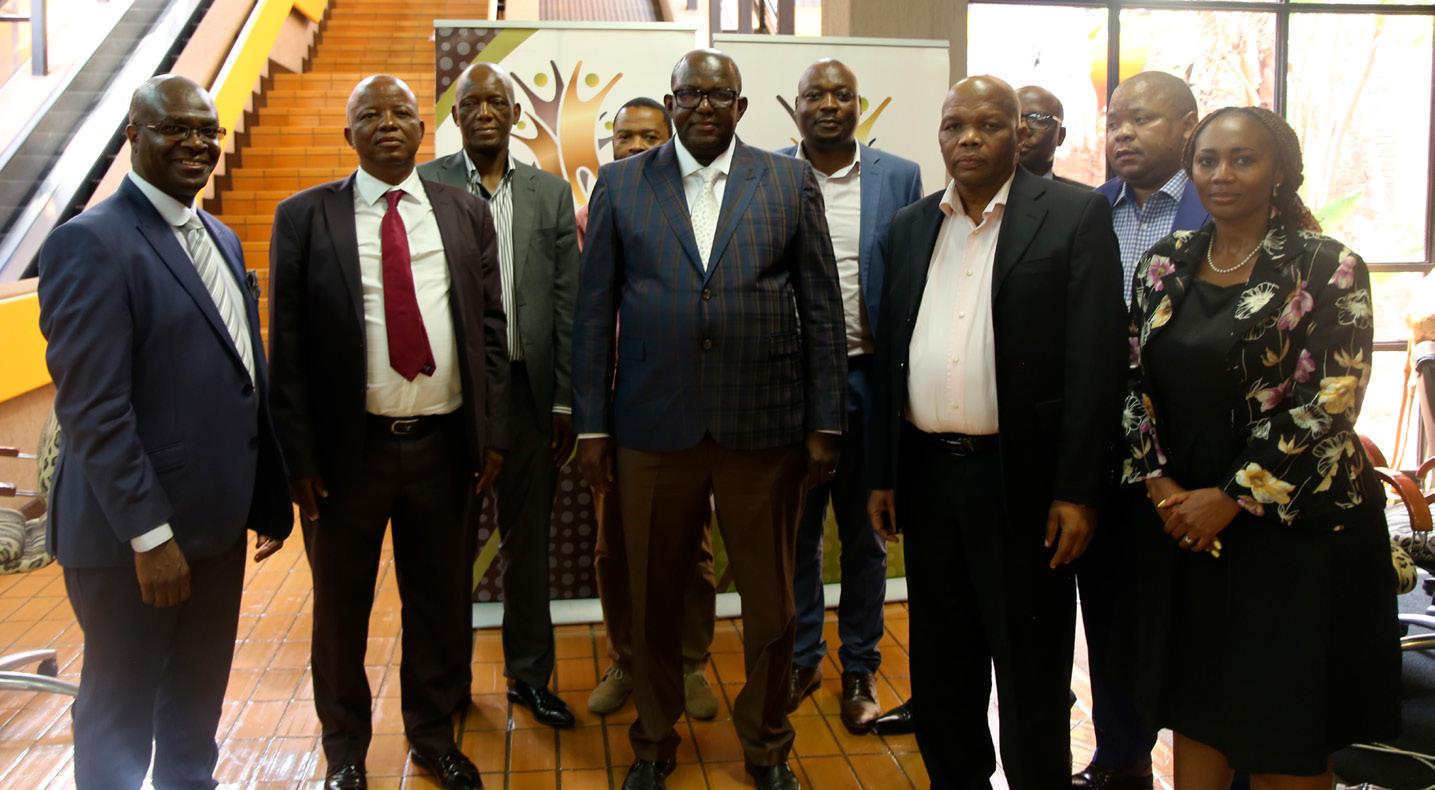
The SEZ programme is at a full implementation phase as the province continues with its endeavour to accelerate economic growth, promote regional development, and fight poverty and underdevelopment.
Musina/Makhado SEZ is made up of two strategic sites, the northern site located at the Antonvilla Farm within the Musina Local Municipality. This site is designed for light to medium industrial activities focusing on manufacturing, agro-processing, and logistics sectors.
The second site is designed for a heavy industrial park focusing on renewable energy and metallurgy. This site is located at the border of Musina and Makhado.
Monama also promised to
accelerate the implementation of the province’s broadband programme, which will enable various communities of the province to access reliable, affordable, high-speed internet. Broadband is a critical programme designed to empower local communities with access to knowledge and information on skills and innovation.
The province, through Limpopo Connexion (a subsidiary of LEDA), is now deploying fibre broadband networks in the region to fuel digital-led economic growth. As the province builds network structures to enable its digital transformation, it will also need to transform its network management tools.
“It is critical for our people to have access to the internet in order to search online information, study, research, connect and communicate – therefore the implementation of this programme is of mammoth importance,” said Monama.
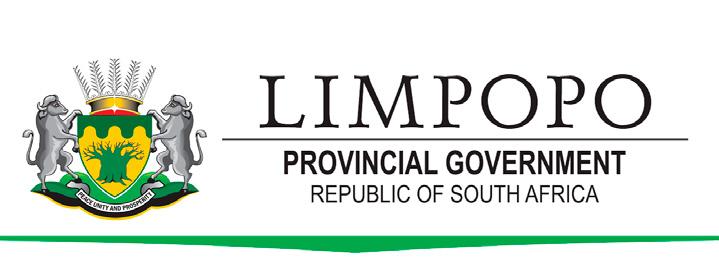
Promoting industrialisation and creating jobs is key to achieving the province’s sustainable economic growth
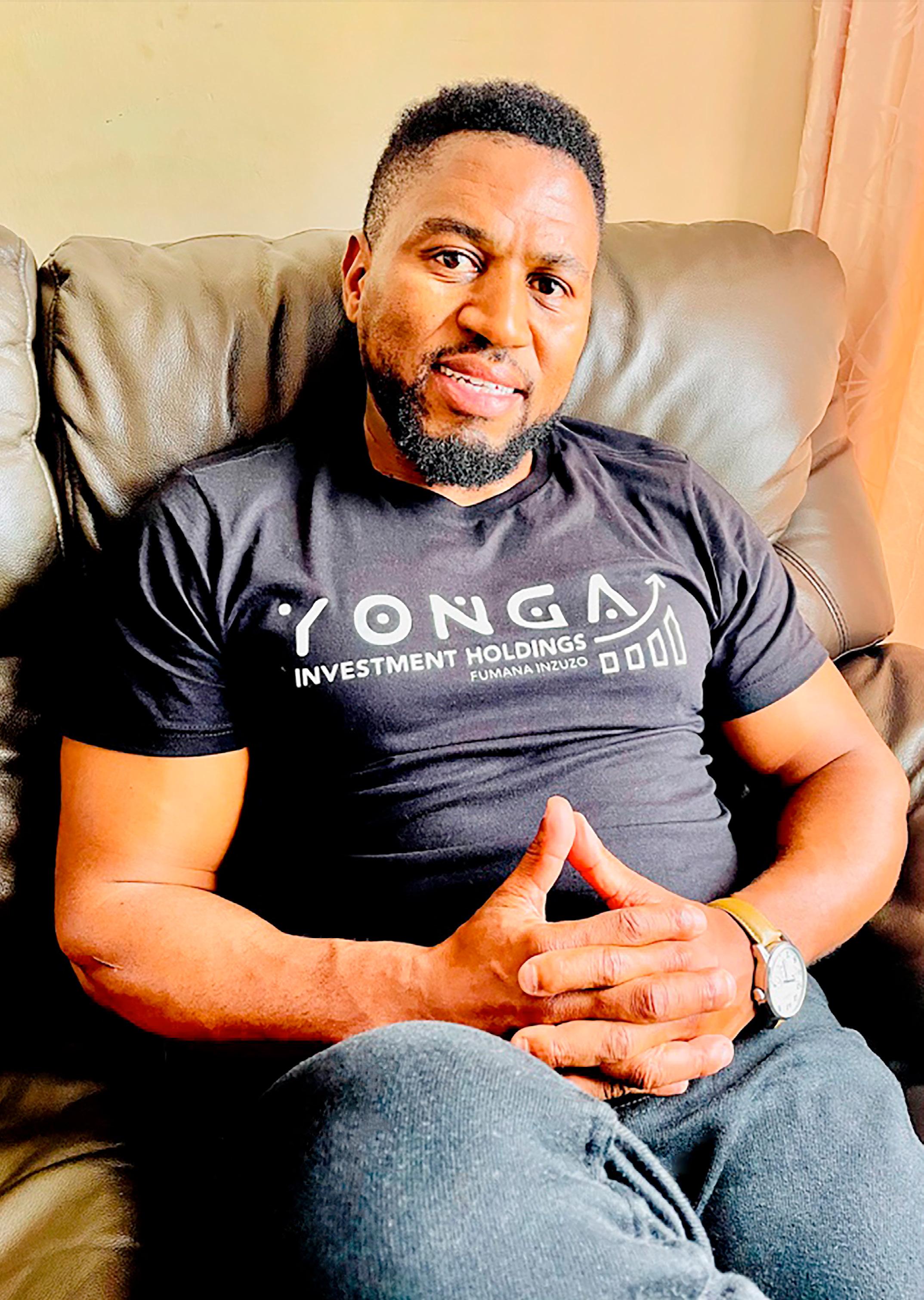
Having started my business at Shanduka Black Umbrellas 12 years ago, I acquired a considerable amount of business knowledge from that incubation. I went on to run various kinds of businesses including Distribution, Retail, Technology and Construction.
Being involved in these businesses, one would think I would have acquired enough knowledge, and yes to a greater degree I did, however, there was a serious gap that I hadn’t considered – that of financial management and financial literacy. Without these competencies I was unable to improve the profitability of my businesses; increase the overall value of the companies, and provide the necessary economic stability required while taking calculated risks and growing.
It came to a stage when my businesses were hugely affected and I personally could not do much to aid them and I decided to enroll in an Entrepreneurship Course in an institution of higher learning, where I had to learn how to run a business professionally as well as efficiently.
As I was studying, my behavior slowly changed as far as money matters and financial management was concerned. I was able to account, and my business practice was way better than before. I thoroughly enjoyed adopting best business practice and accountability.
With my acquired knowledge “YONGA” meaning “Save” or “Preserve” was formed, offering skills development and
training in the business environment to unskilled, semi-skilled, professional and entrepreneurial youth. The training I received had saved my entrepreneurial life and I saw the need to help develop potential and transform communities by teaching youth, professionals and unemployed graduates how to overcome poverty and create wealth through financial literacy.
At YONGA we deal with the ethical dimension in an entrepreneur and make them believe in themselves –we motivate, encourage and instill a winning attitude as a first phase of approach in our tailor-made programs.
After all, your attitude determines your altitude – as Zig Ziglar aptly puts it. Equally important, we address the gap between professionals and entrepreneurs, facilitating a common ground of synergies. Taking from my bad experience of lack of financial literacy, we have launched entrepreneurship and financial literacy training in the small towns and municipalities like King Sabata Dalindyebo (KSD) in Mthatha. This is where we have several township and rural business owners and professionals attending our entrepreneurship program to gain business knowledge. >
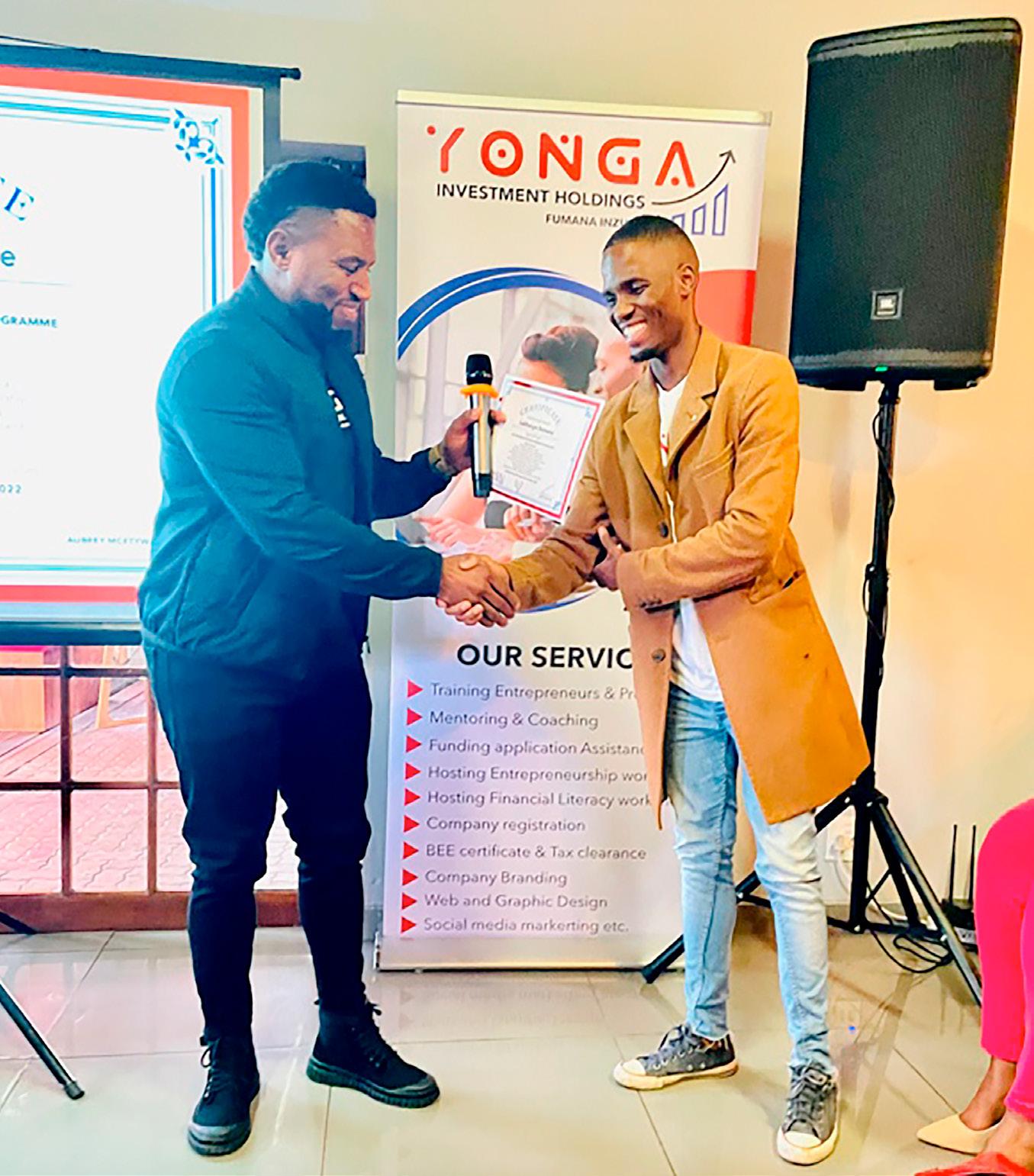
On that note we would like to thank SANTAM and ABSA who have been our partners in various programs that empower and equip our people, especially with our national rollout of

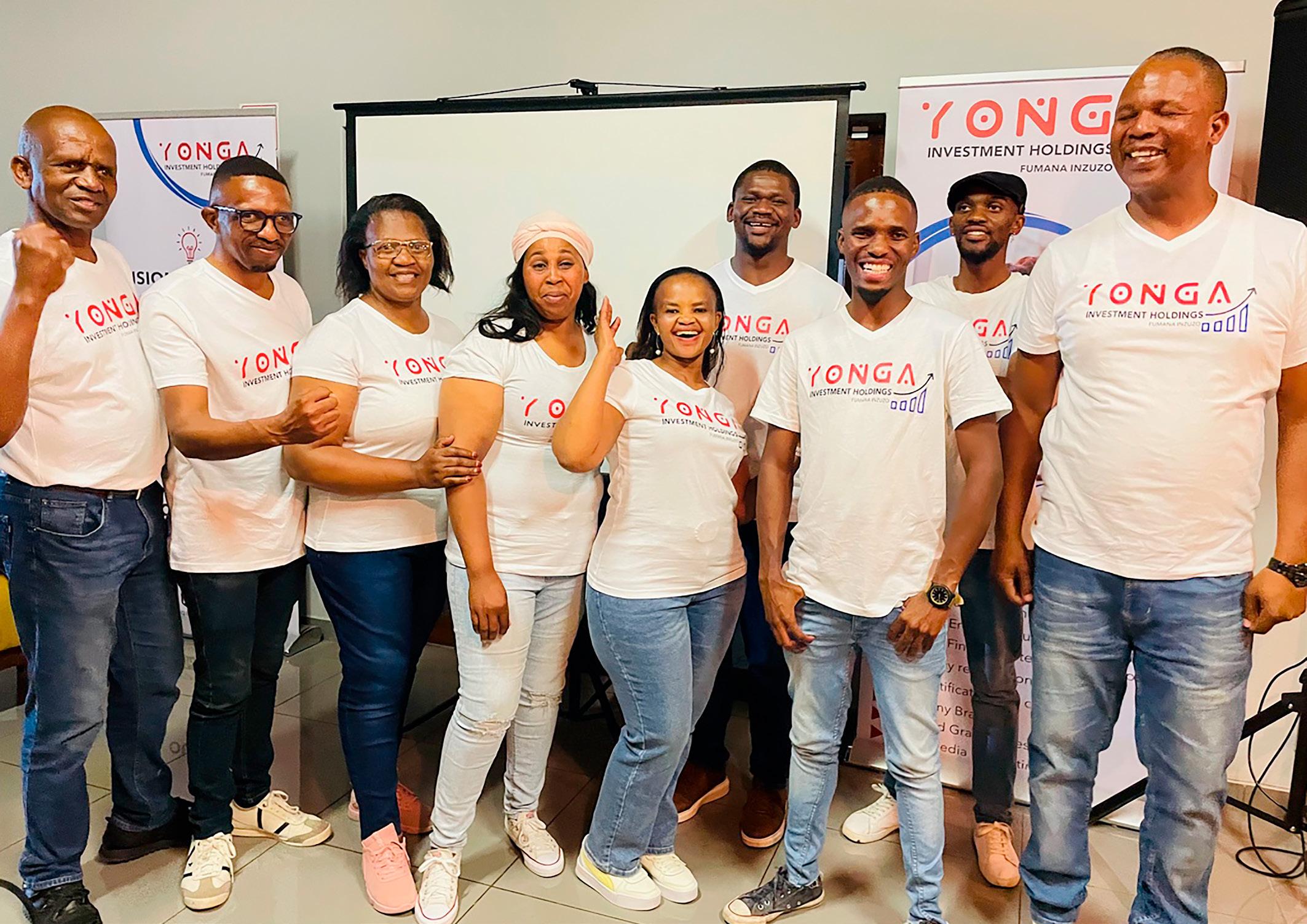
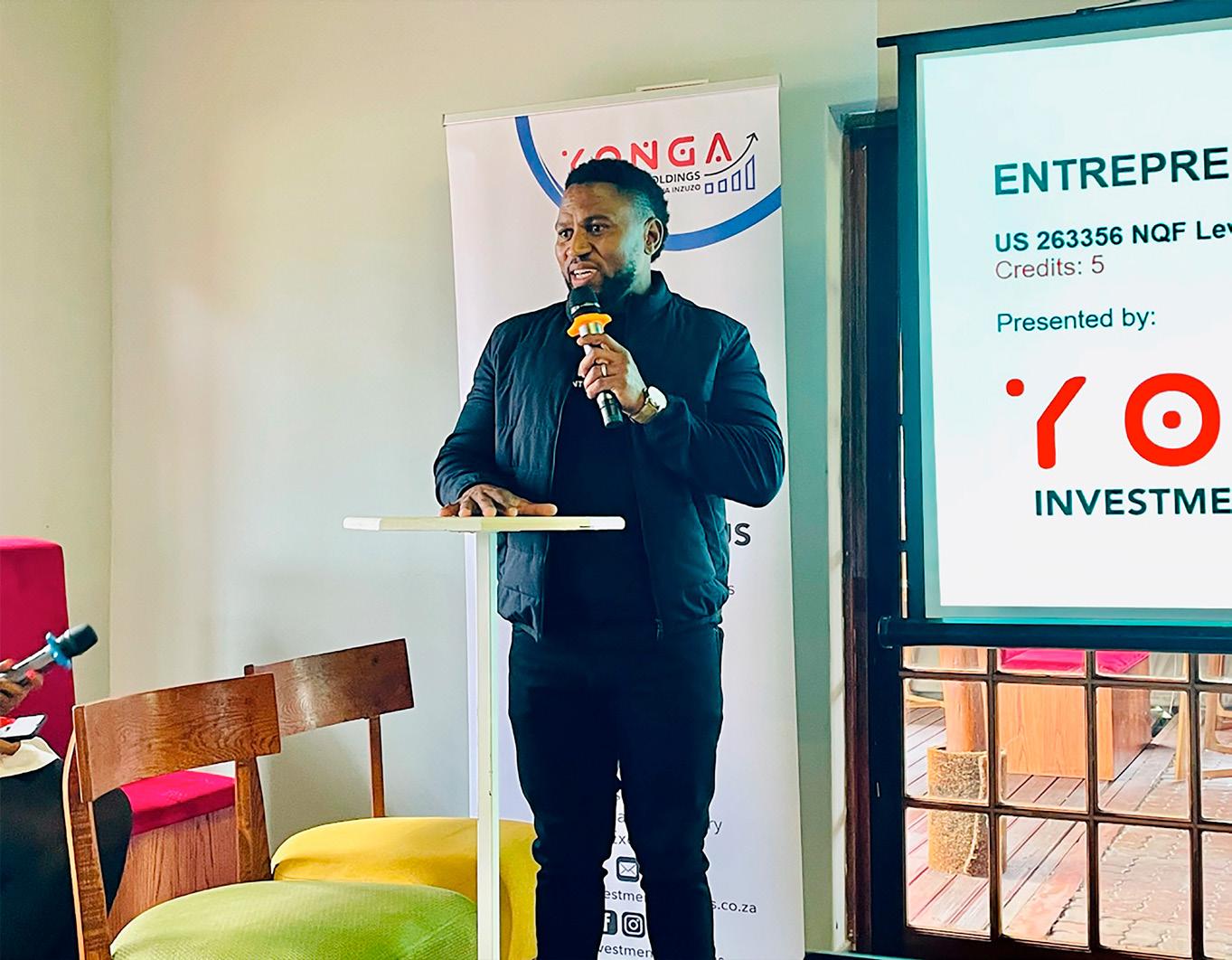
financial training and workshops called “Knowledge is Power”. We often say the difference between people/businesses in terms of their progress, is the kind and amount of knowledge they have acquired in the process.
Our training and business skills development programs are being expanded to municipalities across all provinces to reach professionals, entrepreneurs, unemployed youth and unemployed graduates. We urge private businesses and government to partner with us to ensure that we can equip these communities, and alleviate the triple threat of poverty, unemployment and inequality.



OR Tambo School of Leadership builds AGENTS OF CHANGE with a well-rounded worldview. This political school is an autonomous educational institution that builds the ideological, intellectual and organizational capacity of the African National Congress, broader progressive and democratic movement as well as interested members of the public.
The OR Tambo School of Leadership amended the certification structure of its Prerequisite Course so as to streamline its offerings. This follows an assessment of the school’s courses and an effort aimed at most appropriate packaging.
Currently there are four modules in the Prerequisite Course. These being:
• Mod 1: History of South Africa and the ANC

• Mod 2: Building the ANC Organisation
• Mod 3: Government
• Mod 4: Economic Development
These foundational modules serve as a precondition to advance to the next stage of the learning pathway, which is the Strategic Courses. Participants received a certificate for each
completed module. Henceforth, only one certificate will be issued titled Introduction to Political Studies upon completion of all four modules. An additional change is that the timeframe within which to complete the Introduction to Political Studies is now capped at three months. Previously no time limits were set, regrettably leading to a number of modules remaining incomplete for lengthy periods.
Participants are urged to complete the course within the stipulated timeframe. Failure to do so will result in deregistration from the course.
The four prerequisite certificates already awarded remains valid and has the same effect as the Introduction to Political Studies course. Participants currently completing the Prerequisite Course will
now be awarded a single certificate of Introduction to Political Studies in line with the new arrangements mentioned.
On the school’s website (www.ortamboschool.org.za) the course will be depicted as Introduction to Political Studies (Pre-Requisite Course).

Facebook: ORTamboSchool/ Twitter: ORTamboSchool Instagram: ortamboschoolofleadership Website: www.ortamboschool.org.za
Mhlobiso Group of companies founded by CEO Mr Tando Mhlobiso in 2009, is streamlined mainly around offering turnkey solutions for the construction industry.

ENGINEERING CONSTRUCTION PLANT HIRE BULK TRANSPORT ASPHALTING MANUFACTURE AND SUPPLY OF READY-MIX CONCRETE
We strive for the highest compliance to the Occupation, Health and Safety Act, protecting the well-being of both Mhlobiso Group's employees and the communities in the areas we operate.
We service clients in both the private and public sector and have recently added Mhlobiso Concrete to the existing array of businesses that include: Mantishe Construction, Mhlobiso Plant Hire, Mhlobiso Asphalt, Mhlobiso Transport and Mhlobiso Properties.
Mhlobiso Group was from inception, built on a deeply rooted ethos that speaks to the company’s continuous investment in all its employees, and their full commitment to the work at hand. The CEO instils values that ensure the company is always treating its workforce fairly and with respect.


Our all-in-1 solution means less time, effort, admin and resources spread broadly.
Cost savings can translate to greater profit margins for clients.
Optimised time translates to faster turn-around on projects.
De livering his speech at the launch, MEC for Education in Mpumalanga, Bonakele Majuba, said it’s an exciting day for the Department of Education, Ehlanzeni TVET College and its stakeholders.
The MEC said that the Minister of Higher Education and the Department took seriously the line of march from the President and worked collaboratively with the ETDP SETA to roll out the 4IR concept at TVET Colleges in the country.
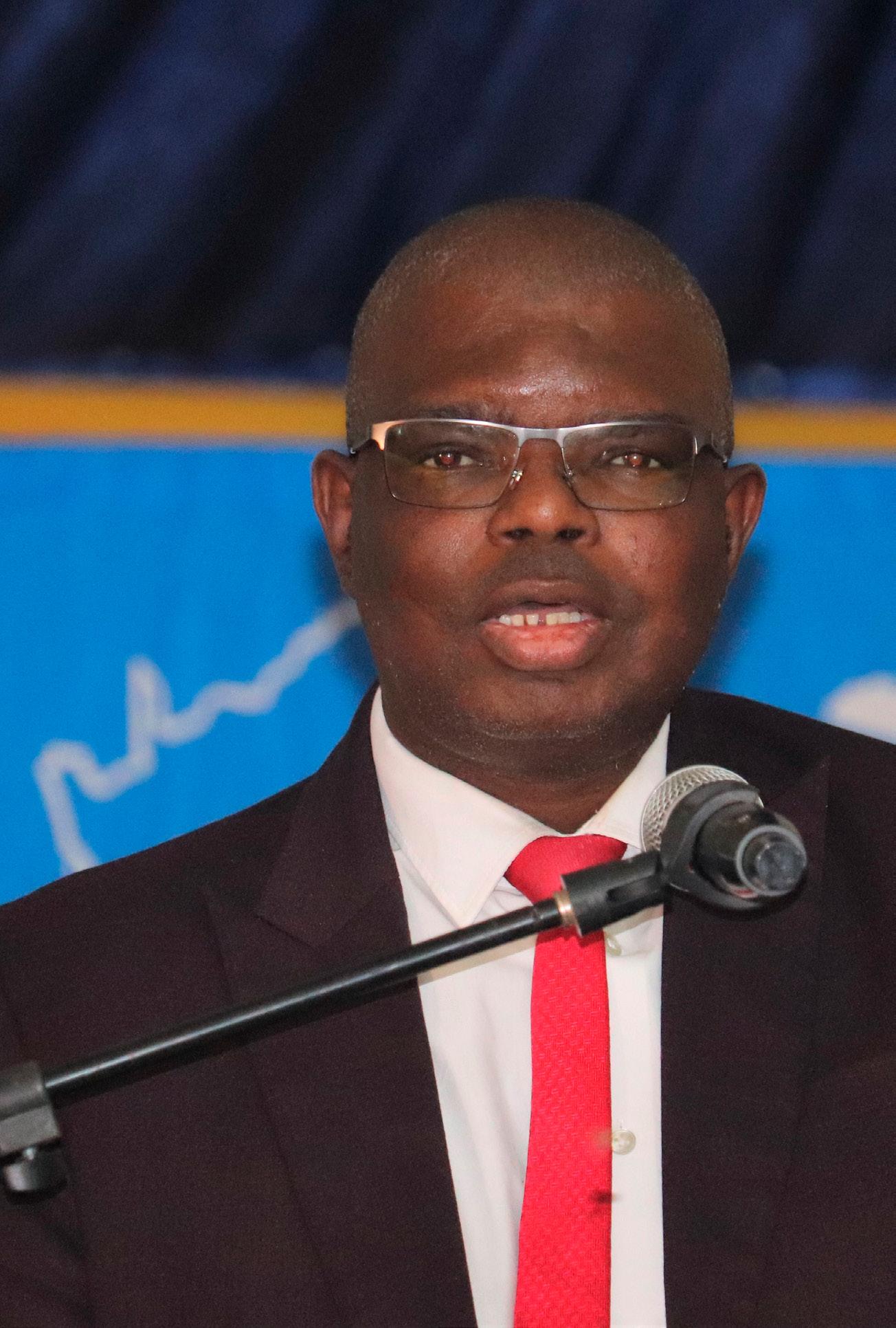
The developments at the Mlumati Campus in KaMhlushwa, Nkomazi, signals the second launch of 4IR projects for TVET Colleges funded by the ETDP SETA – with the Ehlanzeni TVET College proving to be a leader in tertiary education and training.
Majuba said the drive towards the digital industrial revolution will be underpinned by the availability of efficient networks. “We urgently need to develop our capabilities in the areas of science, technology, and innovation. We will soon establish a Digital Industrial Revolution Commission, which will include the private sector and civil society, to ensure that our country is in a position to seize the opportunities and manage the challenges of rapid advances in information and communication technology”, said the MEC. He stated that, “This constructive action by
the DHET and ETDP SETA has its basis on the conviction that 4IR represents a fundamental change in the way we live, work and relate to each other. It is inevitable that, as with any revolution, it will effect change in desirable and undesirable ways.”
The MEC said the nature of the labour market requirements is likely to be more skill-intensive, “which could exacerbate the structural unemployment due to skills mismatch prevalent in South Africa.” It is anticipated that a wide range of occupations will require a higher degree of cognitive abilities, such as creativity, logical reasoning, and problem solving, as part of their core skills.
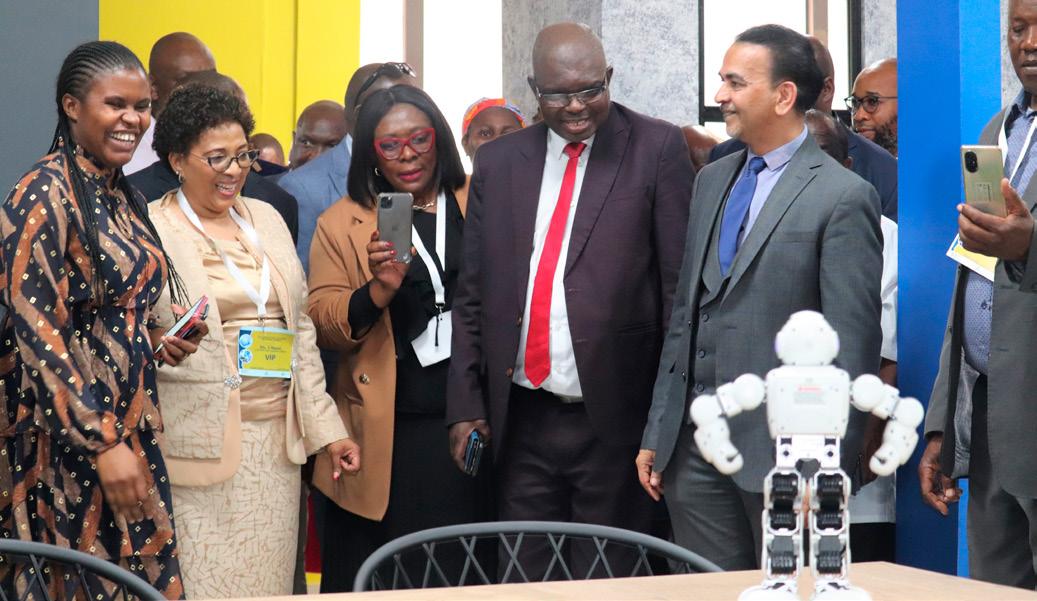
The World Bank has estimated that, 65% of children entering primary school today will ultimately end up working in completely new jobs that don’t exist yet. The same applies to TVET Colleges and universities.
“The 4IR is all about new solutions and new technologies that can provide new, better, and faster solutions,” Majuba said. – pull quote “Consequently, as a department, we support projects such
as these between the ETDP SETA and the ten identified colleges. We are confident that Ehlanzeni TVET College will optimally utilize the infrastructure and training of lecturers that this project has delivered for the benefit of our students.”
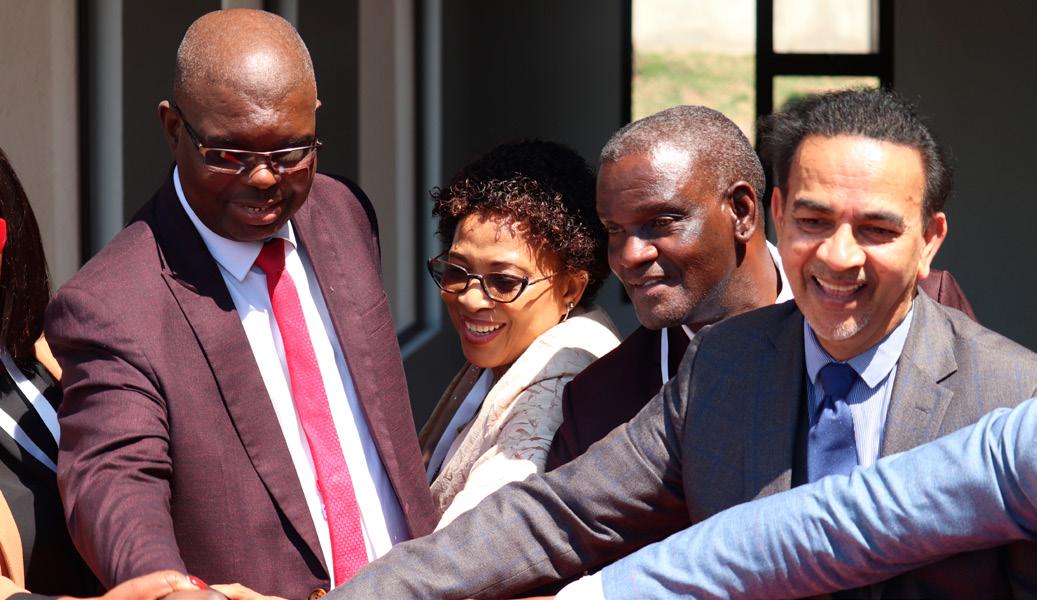
“We need students that will be able to compete with the best in the world. The Mpumalanga Department of Education, in line with the 4IR, has introduced a pilot project on coding and robotics starting with 17 schools for Grade R-3 and 111 schools for Grade 7. This will be incrementally introduced to other grades until grade 9 in 2024. This Centre, therefore, truly resonates with our current plan of action,” stated the MEC. – possible pull quote The principal of Mlumati Campus, Elias Mbuyane, said he was happy that the work that started in 2020, was now bearing fruits.
He also outlined plans to revolutionise teaching and learning at the college by recording lessons so that the lessons can also be presented to three or more different campuses at the same time. This programme was not initially part of the 4IR, but we realised that it complemented it well, and we decided to go with it,” said Mbuyane.
The reason why they chose Mlumati Campus for this special project, was the fact that they wanted all their campuses to have something unique. “We identified a centre that was becoming dilapidated. Because of this project, we had to focus
our energies in revitalising this campus, and I am happy that in the end, we made it work,” Mbuyane said.
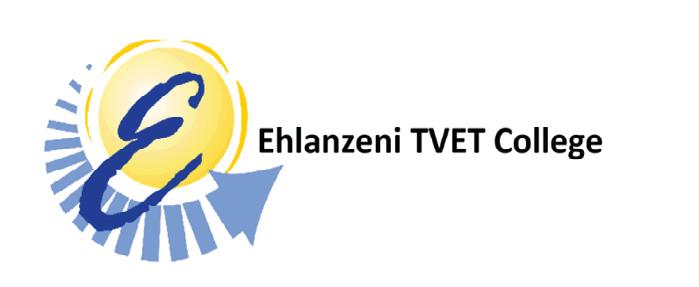
Mlumati Campus is situated in a rural area called Kamhlushwa about 35 kilometers from Malelane. It was named after the Mlumati river which passes near the township.
The Campus was built in 1979. The first students were admitted in 1980. Only Engineering studies were offered. The first Manager who was then called the rector was Mr. H Human, his deputy was Mr. K Van Der Merwe and there were five staff members. In 1982 Mr. K Van Der Merwe succeeded Mr. Human as the Manager of the campus.
Business studies were introduced and in 1983 the staff increased to 11 staff members. Dr. S.P Qwabe took over as the Manager in 1994.
In July 2004 Dr. G.M Sibiya was appointed Campus Manager .
Currently, the Campus has a total of 1276 students.
Motto: “To make Mlumati a Centre of Excellence, providing education and training opportunities of world-class quality”.
“The 4IR is all about new solutions and new technologies that can provide new, better, and faster solutions,” Majuba said.Mrs I Mkhatshwa (E-Learning HOD), Mr S Nxesi (CEO,ETDP SETA), Dr F Yende (College Council Chairperson), Mr Bonakele Majuba (Honourable MEC, Mpumalanga Department of Education), Dr P Balkrishen (Mpumalanga & North West DHET Regional Manager) Mr Bonakele Majuba (Honourable MEC, Mpumalanga Department of Education), Ms S Nxesi (CEO, ETDP SETA), Mr EM Mbuyane (College Principal) and Dr P Balkrishen (Mpumalanga & North West DHET Regional Manager)
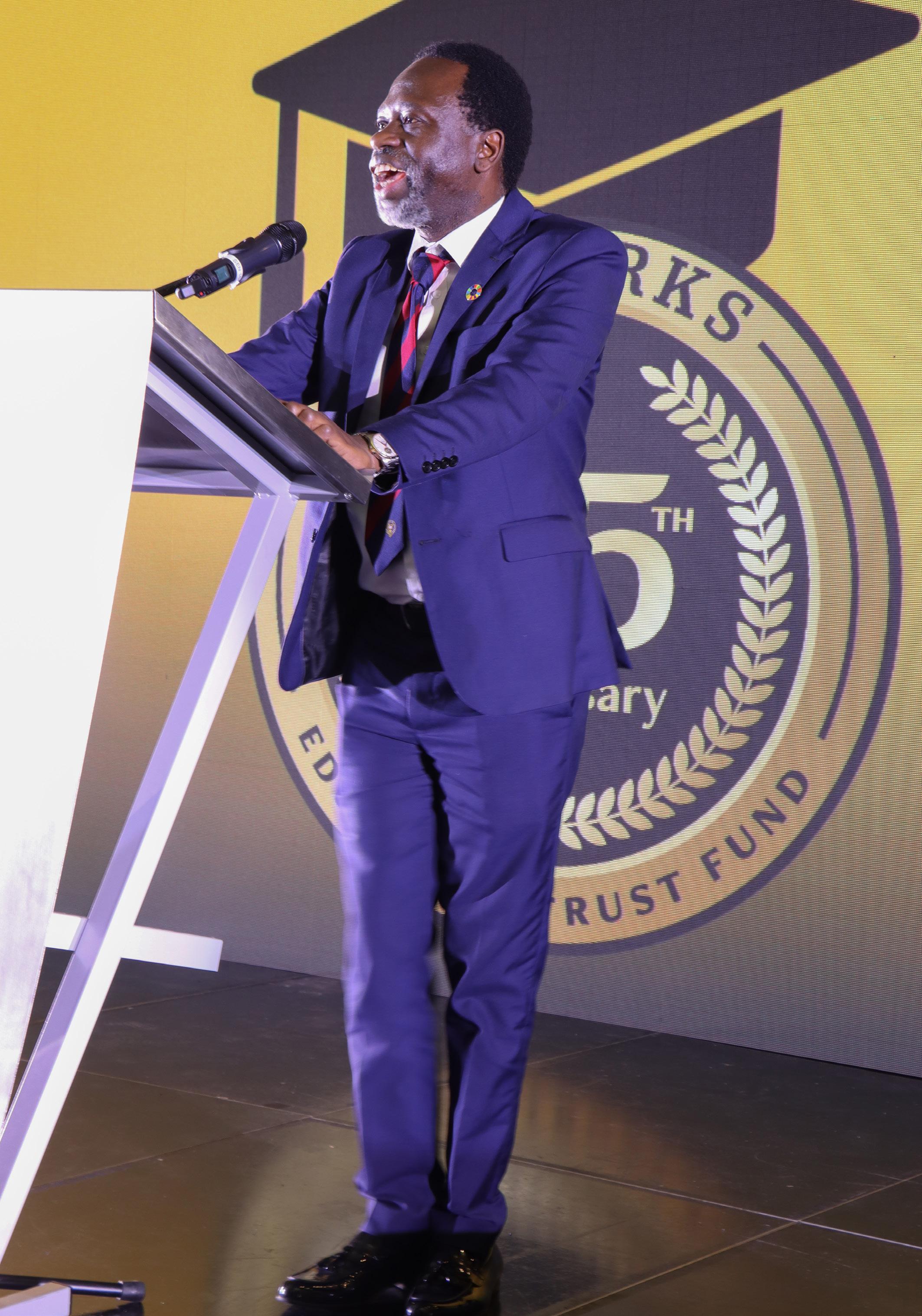
The JB Marks Education Trust Fund was founded in 1997 by The National Union of Mineworkers (NUM) and named after its first president of the African Miners Union, JB Marks.
Over the past two decades, JB Marks Education Trust Fund has provided bursaries for members of the NUM and their families; ultimately enabling 1,717 bursars to graduate with mainstream qualifications (including 24 medical doctors and 4 pilots).
This year, and marking its 25th Anniversary, the National Union of Mineworkers (NUM) together with the JB Marks Education Trust Fund once again honoured 379 graduates at its prestigious 11th Annual JB Marks Graduates Awards Ceremony, that took place on the 19th August 2022 at Emperors Palace in Kempton Park.
For this year’s graduation ceremony, the main speaker was Professor Tshilidzi Marwala who was recently appointed the rector of the United Nations University (UNU) in Japan. "The Class of 2019, 2020 and 2021 produced 379 graduates, the
highest three-year throughput since the Trust’s inception 25 years ago,” said Jako Mokgosi, JB Marks Education Trust Fund Principal Officer. He noted that by numbers: a total of 1,717 graduates by a private Trust, over 130 postgraduates with one Ph.D. candidate, a functional Alumni and R600m paid by the Trust for over 3010 beneficiaries over this period - the past 25 years has been a resounding success.
“We salute the NUM for its visionary leadership in establishing such a Trust for its members. The NUM is a revolutionary giant union that is changing the lives of its members and their dependents. It will continue to empower and educate its members and their dependents," he says.
The 379 graduates have qualified in various fields of study including Law, Health, Engineering, Aviation and Science - a collective achievement, which shows the efficacy of the JB Marks bursary programme, a programme initiated under the auspices of Mineworkers Investment Trust (MIT) whose interest in the needs of the

community led to the formation of Mineworkers Investment Company (MIC) to provide funds for the JB Marks Education Trust Fund and Awards Programmes.
Educating and empowering young Southern Africans is the centrepiece of the NUM strategy meant to break the yoke of the triple evils of poverty, unemployment, and inequality.
These bursaries are an effort of educating and empowering the dependents of NUM members. Education of an individual is by definition education of a society.
The NUM through the JB Marks Education Trust Fund will continue to educate its members and their dependents.
Educating and empowering young Southern Africans is the centrepiece of the NUM strategy meant to break the yoke of the triple evils of poverty, unemployment, and inequality.
People with Disabilities,
At the launch of Disability Rights Awareness Month themed DRAM - “Empowering persons with disabilities through resourceful, sustainable and safe environments” - Minister in the Presidency for Women, Youth and Persons with Disabilities, Maite Nkoana-Mashabane, reiterated the Department’s commitment to the unique needs, experiences, and expertise of persons with disabilities, premised on international, regional and national frameworks.
This year’s national launch is in line with the International Day of Persons with Disabilities (IDPD), under the theme “Not All Disabilities are Visible.” The Department’s approach to DRAM is

The Department of Women, Youth and
in the Presidency, is responsible for driving the government’s equity, equality and empowerment agenda in terms of those living with disabilities.
informed by a series of wide consultations with the disability rights sector and government departments and grounded in the principle of “Nothing for us, without us”.
At an international level, South Africa ratified the UN Convention on the Rights of Persons with Disabilities (UNCRPD) and its Optional Protocol without reservation in 2007. In 2013 Cabinet approved the Disability Rights Awareness Month starting from the 3 November to –3 December. A critical moment and true display of political commitment was in the publishing of the White Paper on the Rights of Persons with Disabilities in December 2015.
The Minister stated that, “we have the necessary policy frameworks and legislation, we now need to move into implementation, and we must move forward in terms of introducing specific priorities and achievable targets to ensure the progressive realisation of the rights of persons with disabilities in South Africa”.
The Honourable Minister shared the 2022 calendar of events for DRAM saying, “This year’s overall theme is shaped by the priorities of the State and introduces the Mid Term Strategic Framework targets”. She stated that over the past year the Department had worked on the priorities of the Presidential Working Group on Disabilities and had seen reasonable progress on these priorities.
Capacitating the disability coordination function at the epicentre of all spheres of government.
Accelerating domestication of the UNCRPD. This includes the ratification and domestication of the AU Protocol on the Rights of Persons with Disabilities and the Marrakesh Treaty to be ratified on Access to Print Materials for Persons with Print
Disabilities. As well as taking the White Paper on the Rights of Persons with Disabilities into law.
Transformation and strengthening of the National Disability Rights Machinery as a meaningful platform for strategic engagement and collaboration needs to be fast-tracked.
The creation of a sustainable funding mechanism for the sector to increase footprint and impact of programmes of national organisations.
Strengthening the extent of selfrepresentation by persons with disabilities across strategic institutions. This includes their representation in governance structures, and strengthening meaningful involvement of representative organisations in the design and conceptualisation phase of policies and services and monitoring processes.
Accelerating the pace of providing access to quality inclusive education for children with disabilities out of school. This entails improving and strengthening reasonable accommodation support measures for learners in both special and ordinary schools. In addition, we must advocate to mainstream persons with disabilities in ordinary schools ensuring all learning materials are accessible, regardless of where the learner is located.
Accelerating the pace of meaningful and sustainable economic liberation of persons with disabilities. This includes reversing bthe trend of learnerships replacing decent work opportunities, promoting SMME development, and public sector procurement.
Strengthening community based independent living support services through the development of personal assistance services, among others. Finding sustainable solutions for the huge backlogs in the rovisioning of assistive devices. This deprives
children with disabilities from effective development and learning that reduces their potential economic activity.
Accelerating access to the right of autonomy and legal capacity for persons with psychosocial and intellectual disabilities, inclusive of review of the Mental Health Care Act, quality of care in mental health institutions and developing community-based services as alternatives to institutional care.
Accelerating the recognition of South African Sign Language as an official language.
The Minister stated that the Department is in the process of developing an overarching legislation on disability rights as mentioned above and that South Africa will soon ratify the protocol on the African Human and People’s Rights Charter for Persons with Disabilities in Africa.

She further stated that the Department is investigating the possibility of legislating these frameworks into the Disability Rights Act.
The Minister called on all government departments to be involved in the process of developing the National Disability Rights Agenda as required by the Mid Term Strategic Framework (MTSF) targets, expressing the need for more government departments to participate in the activities and events during Disability Rights Awareness Month as part of their commitment to integration of persons with disabilities.
women, youth & persons with disabilities
Department: Women, Youth and Persons with Disabilities REPUBLIC OF SOUTH AFRICA
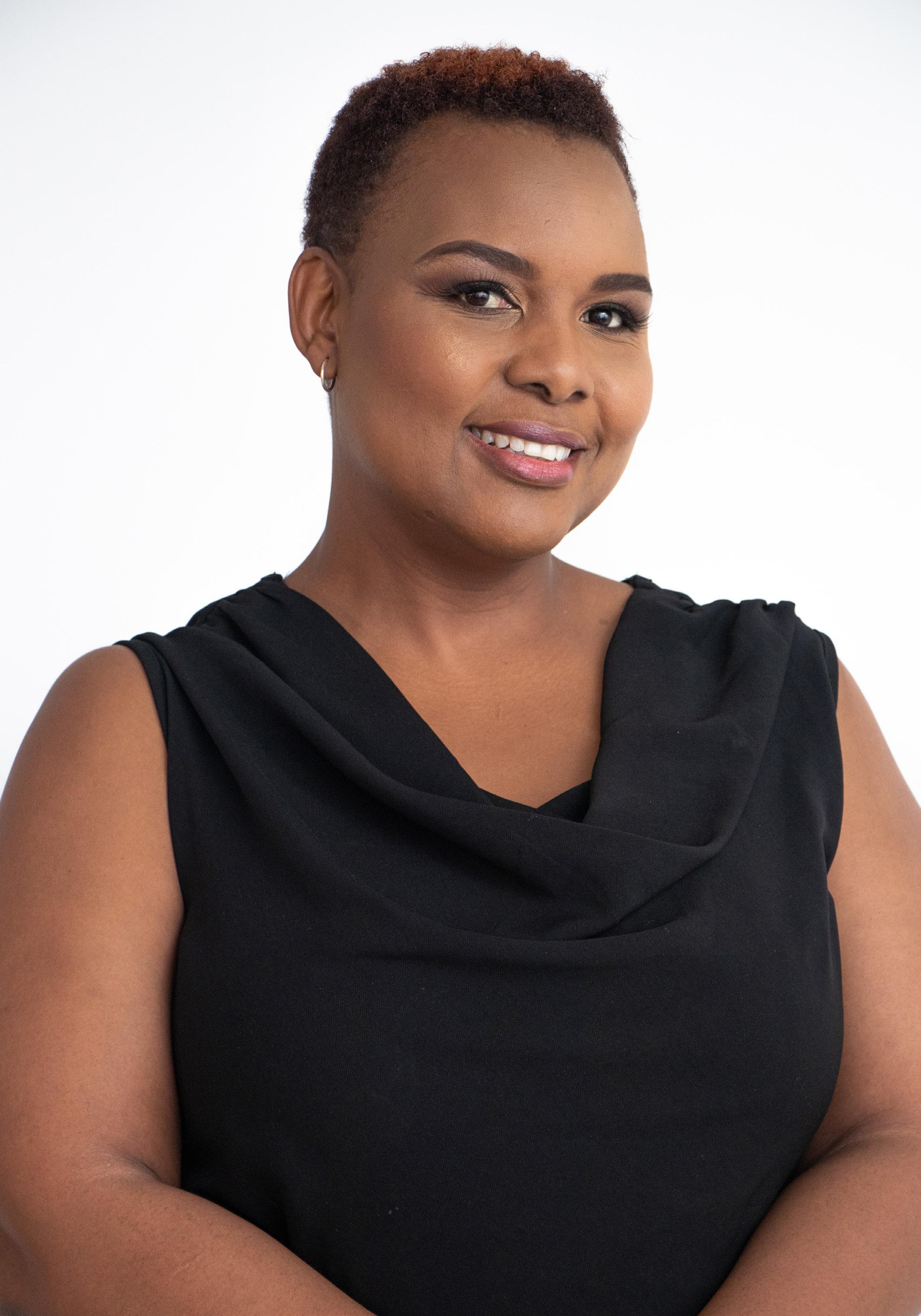
The rates and incidences of gender-based violence (GBV) in South Africa are staggering. It’s become normal to see headlines of yet another child, woman and LGBTQI+ person who has been raped, assaulted or even killed by a man — in most cases, by a man they know and one they’ve had a relationship with. Horrifically, South Africa’s rate of femicide – murdering women on the basis of their gender – is more than five times the world average. In most cases, it is not faceless perpetrators lurking in dark corners who are committing these murders, it is primarily intimate partners or people close to the victims.
According to the author of Femicide in South Africa Dr Nechama Brodie, close to 3000 women are murdered in South Africa each year, an average of eight femicides every single day.
South Africa, we have an emergency on our hands, a crisis that has existed for decades but has only been taken seriously and thrust into the public sphere in the last 20 years. Men are commonly the perpetrators of femicide and GBV, a clear indication of the significant role patriarchal
societal norms play in these crimes. Patriarchy is a manifestation of the intersectionality of power and social disconnectedness. There continues to be an interplay between poverty, patriarchy, racism, homophobia and heteronormativity which puts children, women and LGBTQI+ persons at a higher risk of violence. Dismantling patriarchy should then be at the centred of GBV and femicide prevention. We cannot prevent GBV without grounding our efforts in feminist principles that recognise patriarchy as a system of power and work towards dismantling it. There are many forms of feminism, but they all share a common understanding – the idea that there are systems of power in our society that systematically oppress women.
It is this patriarchal power that keeps women oppressed and continues the cycle of GBV and femicide. The majority of black women in our country suffer triple oppression, them being women, black and poor. We must confront it at a political, social, cultural and religious level. Having been exposed to this oppression in my own life in one way or another, I find myself drawn to contribute to dismantling the
system. The work we do at Soul City Institute also contributes to this disruption.
This year, we launched the Feminist Leadership and Activism Centre (FLAC), a learning and co-creation space promoting decolonial feminist consciousness. The centre is born out of the urgency to create a generation of young feminists by providing education as a communal space of learning, sharing and connection that aims to explore social realities that affect the quality of women’s lives.
It is inspired by our new radicalised vision that acknowledges that “the empowerment” of young women and girls does not go far enough to achieve gender equity but putting intersectional feminism at the forefront of movement building ensures a just world for all girls and women.
We officially launched at an opportune time, just two days after the Presidential Summit on GBVF concludes. Feminist organising >
is central to the prevention of GBVF and the full realisation and implementation of the National Strategic Plan Gender-based Violence and Femicide, South Africa’s 10year roadmap for responding to the scourge.
Feminist movement building is an essential catalyst for political and social change and plays a crucial role in advocating for and changing laws, attitudes, behaviours, norms, and practices that prevent and respond to GBV and Femicide. FLAC is one of the many programmes the Institute contribution to equipping the next generation of feminists who can achieve success despite the lack of an enabling environment, both political and financial.
FLAC is one of the many ways the institute is building organisational resilience and advancing the feminist struggle. It is a step forward towards cementing our intersectional feminist identity and agenda.
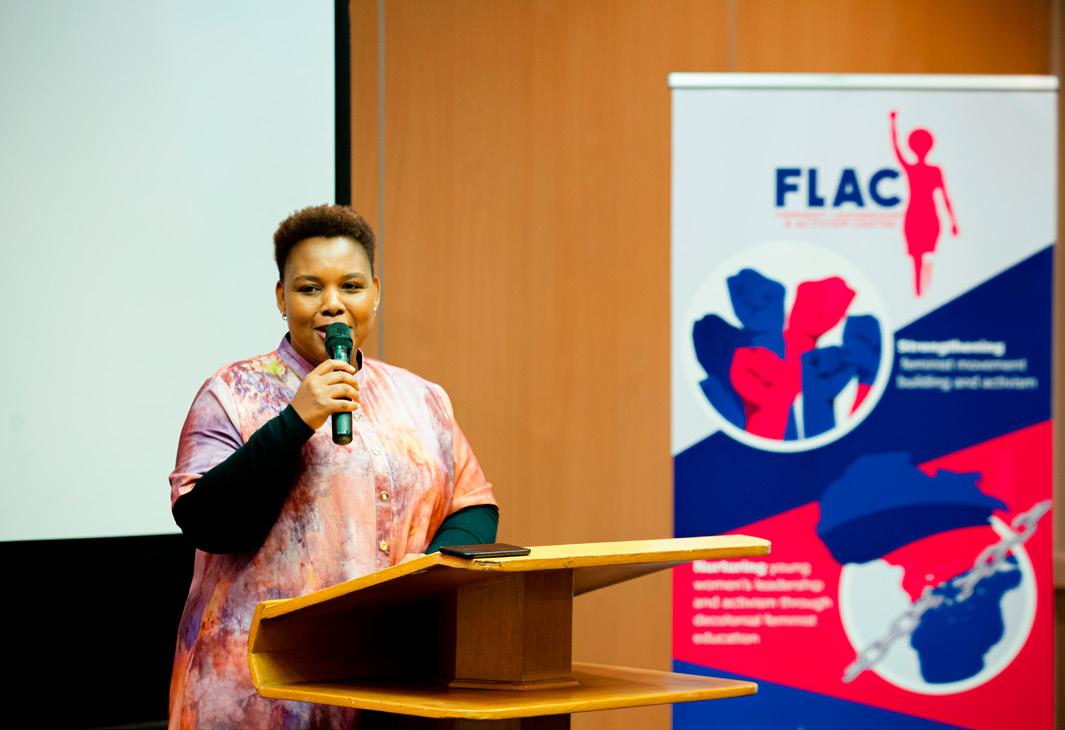
This November has been a pivotal month for GBV. The Presidential Summit on GBV and Femicide took place on the first two days of the month and it will end with the annual commemoration of the 16 Days of Activism against GenderBased Violence. Soul City Institute
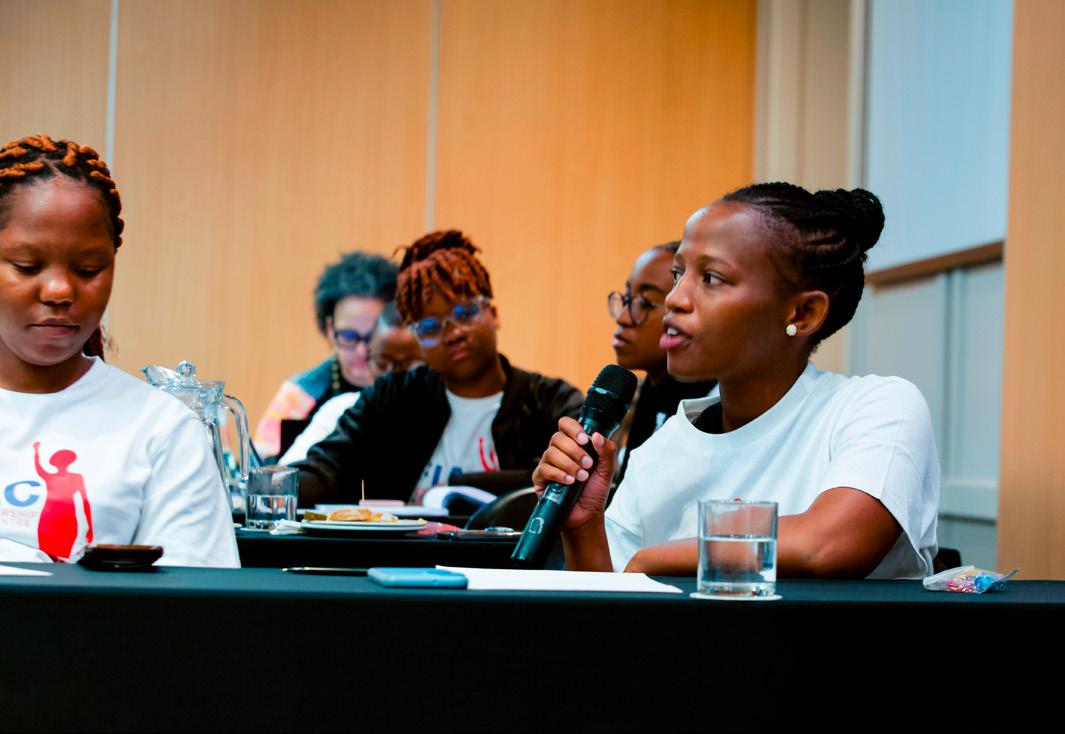
was part of the planning and preparation of the summit in its capacity as a member of the Call to Action Collection, a coalition of organisations working on ending GBV and femicide and building an autonomous feminist movement in South Africa.
In 2020, we launched the Kgalemelang campaign, our call to action to move from awareness to accountability, 365 days of holding ourselves and everyone else accountable for playing a part in ending gender-based violence. Through this campaign, we focus on influencing and advocating as an organisation and in collaboration with others through media and other platforms, providing thought leadership and setting the agenda.
‘Kgalemelang’ is a Sesotho and Setswana word that means to ‘call to order’, ‘rebuke’, or ‘challenge’ the status quo, and we plan to continue doing just that. This year’s campaign involves working and equipping community policing forums to incorporate GBV prevention in their work and hosting workshops that help men unlearn toxic masculinity and patriarchal norms.
November is not only the start of the 16 Days, but it is also Disability
Rights and Awareness Month in South Africa. While the odds are stacked against South African women as a whole, persons with disabilities face even more violence. In a study conducted by the United Nations Population Fund (UNFPA), girls and boys with disabilities are mostly excluded from education and health services, discriminated against in their communities and trapped in a cycle of poverty and violence. Girls and women with disabilities bear the brunt of these violations, as they face up to 10 times more genderbased violence than those without disabilities. Those with intellectual disabilities are particularly vulnerable to sexual violence.
The report found that children with disabilities are almost four times more likely to become victims of violence than children without disabilities and nearly three times more likely to be subjected to sexual violence, with girls at the greatest risk. People with disabilities are often left out of discussions and prevention interventions despite facing the double sword of discrimination and violence: their gender and disabilities.
Lumka Sizani is one of those women. The 37-year-old mother from Green Village in Soweto has experienced discrimination from nurses to police officers as she navigates the world as a deaf person in South Africa.
Last year during a Soul City Institute webinar, Lumka shared how she has struggled to access healthcare — particularly sexual and reproductive health services — in public health facilities and how she was failed by the justice system when she tried to report abuse at the police station.
“Where am I going to report my abuse? Who am I going to report it to? The police station is not accessible to me, there are no sign language interpreters there,” she told us. “Even if I were to be successful, what would happen in court? Would I easily access an interpreter?”
We also work with two rganisations that run GBV prevention and advocacy programmes focusing on people with disabilities.
Durban-based KwaZulu Natal Deaf Association ran a campaign focusing on how deaf people are not included in most awareness programmes due to the language barriers faced! Our partners in Taung, in North West, work with a local disability centre to address gender-based violence against persons with disabilities.
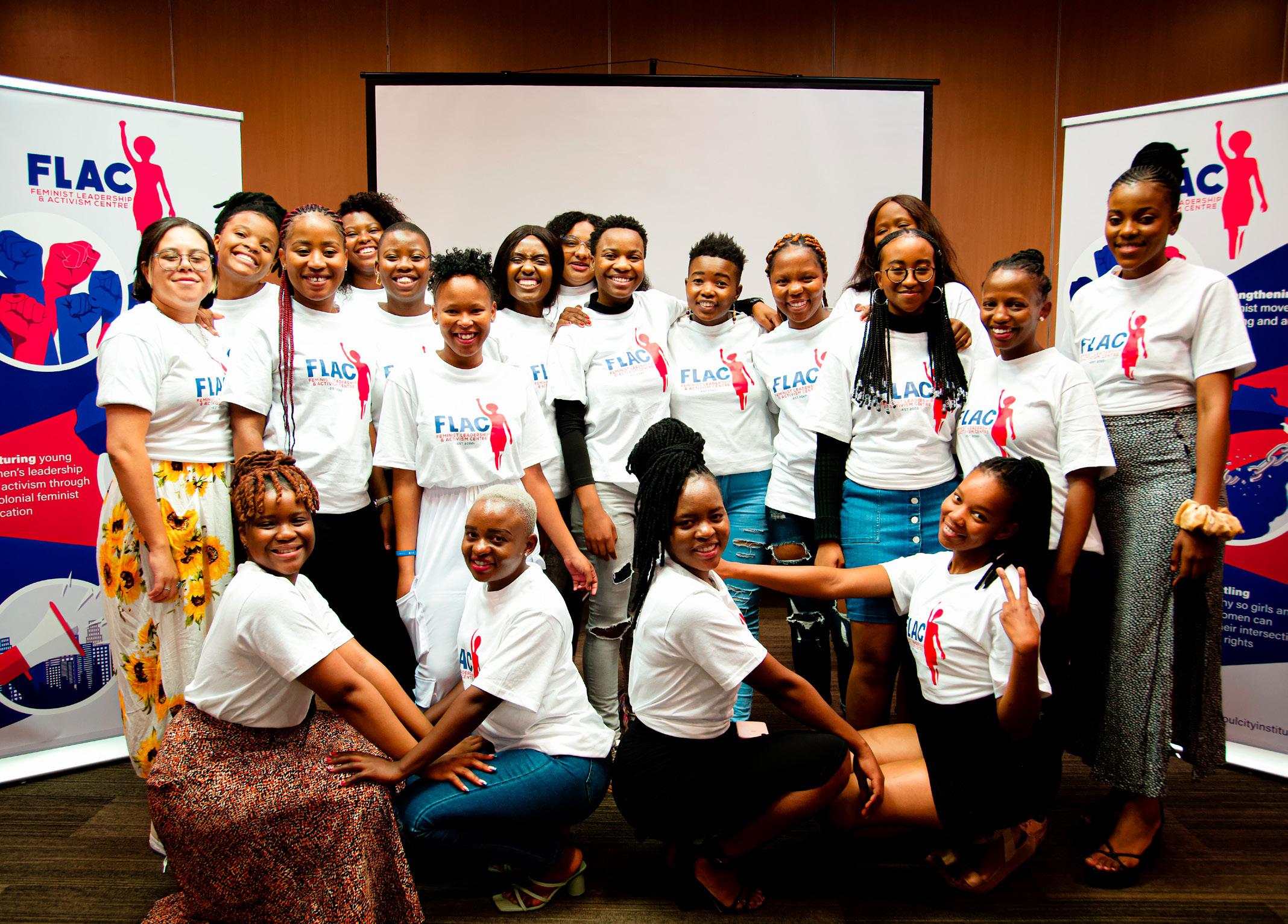
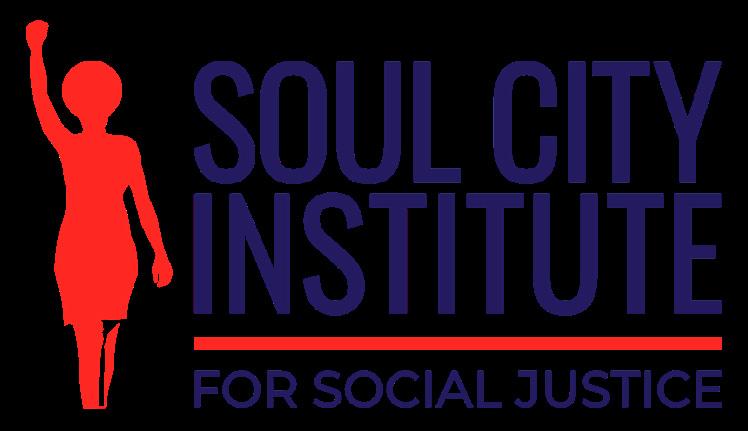
We at Soul City Institute have seen the power of behaviour change and believe it can help us address and prevent genderbased violence and femicide. But behaviour change is not linear, nor is it easy. We need to reach people where they are to inspire action, replacing harmful norms with human rights values through the power of pop culture, media, arts and tech, combined with on-the-ground engagement. As the CEO of this trailblazing organisation, I am deeply grateful to the Soul City
Institute team and all those who supported and partnered with us. We will continue to work towards preventing and ending GBV and femicide in South Africa.
www.soulcity.org.za Email: info@soulcity.org.za
Address: 1 Newtown Ave, Killarney, Johannesburg, 2193
Ashared vision to strengthen the economy of the Eastern Cape has culminated in a collaboration between the University of Fort Hare and the Provincial Department of Cooperative Governance and Traditional Affairs (CoGTA) to develop research on the role of Local Economic Development (LED) agencies as drivers of economic development in the Province.
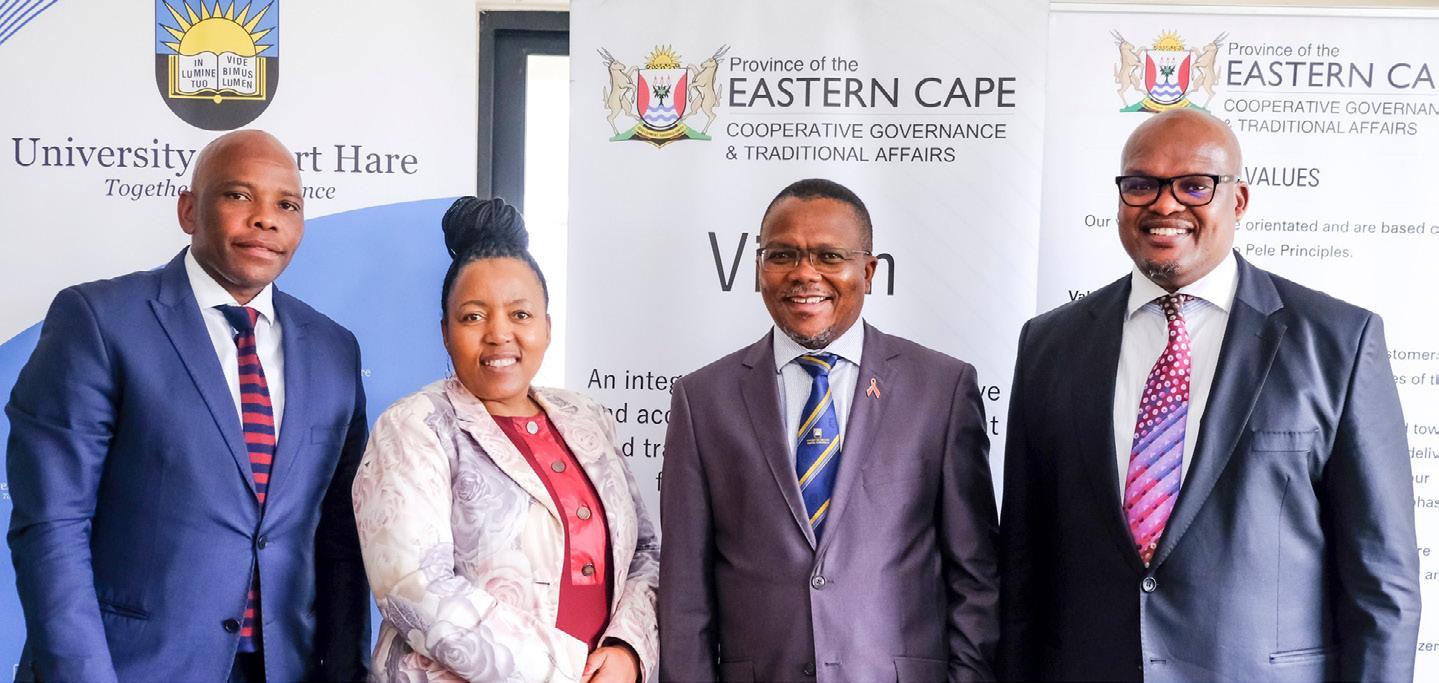
The collaboration between the institution and the government was sealed 10 November 2022 with a memorandum of understanding (MOU) by UFH Vice Chancellor, Prof. Sakhela Buhlungu and the Head of CoGTA, Mr Andile Fani.
According to the agreement, the partners will work together for the next 36 months (three years) to conduct research and facilitate public engagements on matters around LED. The studies will seek to explore the agencies efficacy and create a body of knowledge to inform policy decisions. The main objective of the MOU is to formalise a partnership where UFH will conduct research on the 11 provincial local economic development agencies, their track record and how they could be made more effective as agents of local economic development in municipalities.
The event was attended by CoGTA MEC Zolile Williams and the senior academics from UFH.
The research will be conducted by three researchers from the University’s Faculty of Management and Commerce: Prof
Bhulungu stated that the University welcomed the opportunity to work with the department, the development agencies and the municipalities and said that because the University’s area of specialisation is research, there is a definite role to play in terms of issues of skills development in research and teaching.
In stating the university’s interest in the collaboration, he described it as two-fold:
• The university is ‘citizens’ of three towns, and listed their campuses in East London (6,500 students), Bhisho ( 800 students) and Alice (9,000 students). As citizens they were also affected by service delivery successes and failures.
• The University is a major contributor to the local economy, paying rates and taxes, and an employee of more than 2,000 staff members.
The MEC of CoGTA said UFH acknowledged the value of the collaboration and stated that based on the findings of the research done by UFH, the department would now be better placed to analyse the efficacy of development agencies.
Fani acknowledged that the current research on the development agencies was dated and said that he looked forward to the new research findings and implementing the outcomes of the findings. He said that the new finding would give the Department direction going forward.
He appealed to municipalities with development agencies to collaborate, avail themselves to and support the researchers and that the Department municipalities and their agencies should become “champions of those outcomes.”
“If there are certain things that need confirmation, we are going to be available to sign off those documents,” he said.
Willie Chinyamurindi, Prof Munacinga Simatele and Prof Forget Kapingura.


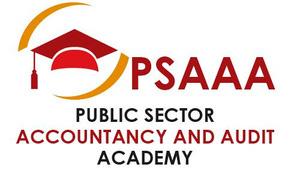
The Public Sector Accountancy and Audit Academy (PSAAA) is about much more than just providing excellent academic service to the public.
PSAAA was founded in 2020 with the goal of expanding the knowledge, skills, and capabilities of public-sector accounting and auditing professionals.
This is achieved through the public sector's capacity to ensure accountability in the prudent management of public financial resources.
“The Academy is about ccountability, credibility and competency,” says Acting PSAA CEO Russel Morena.
"As the late President Nelson Mandela often stated, "No country can truly prosper until its citizens are educated." As a result, PSAAA is committed to delivering training that will enable citizens to be confident in their abilities as public sector employees.
“We are an accredited institution, offering training to public sector accounting and auditing professionals. The academy has been accredited by the Quality Council for Trades and Occupations (QCTO) within its two years
of operations. This is a huge achievement as accreditation means the provision of quality training.”
The Academy recently celebrated a two-year anniversary and Morena added: “We reflect on the key strategic decision taken two years ago for SAIGA to remain relevant and also contribute to the development and certification of finance and auditing professionals.”
“The next two years will see the academy leveraging on opportunities in the market while building towards its vision of becoming a one-stop academy for finance and auditing training.” Among the flagship courses offered by PSAAA is the Public Sector Auditor Qualification (formerly known as GASP) for both prospective and incumbent professionals.
With the qualification and the Continuous Professional Development (CPD) course, accounting officers can stay on the cutting edge of South Africa’s rapidly developing financial sector.
The accreditation is designed to provide a thorough and efficient accounting framework for government-related finances.
The CPD course is a powerful tool to ensure that one remains current in a highly competitive environment.
Faith Ndlovu, a GASP program graduate, highly recommends the PSAAA courses.
“I completed my BCom accounting degree at the University of Johannesburg in 2014 and enrolled in The Government Auditing Specialism Program (GASP) in 2015,” she says.
“The journey drastically changed my professional lens and broadened my public sector knowledge and accelerated my career. Upon successful completion of GASP, I managed to secure a three-year contract that afforded me the opportunity to train as a Registered Government Auditor.”
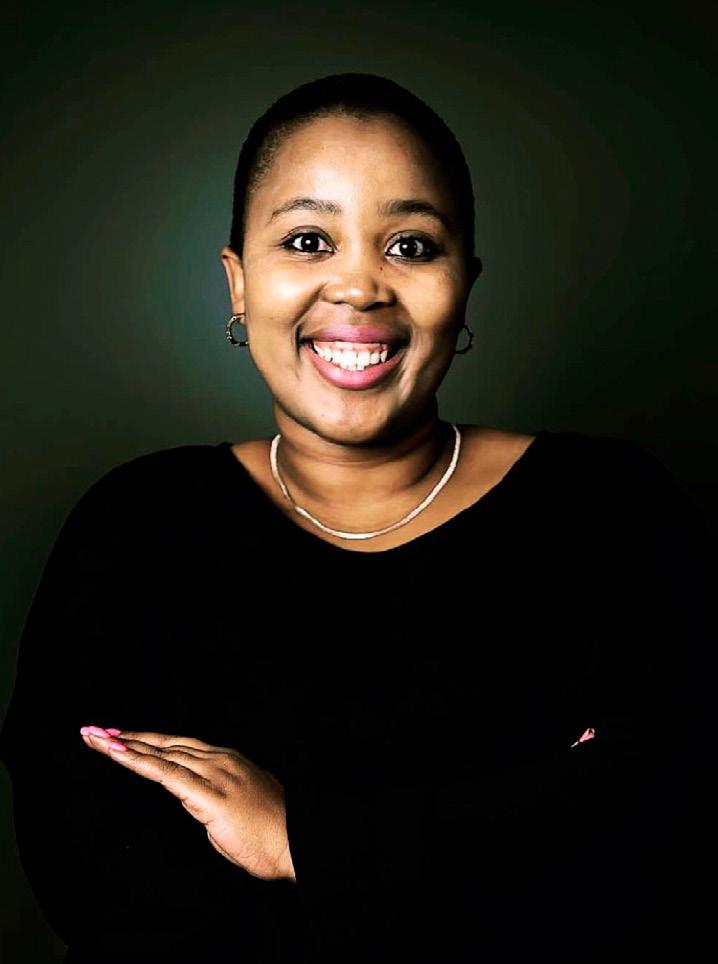
The Public Sector Accountancy and Audit Academy (PSAAA), established in 2020, is set to increase the knowledge, skills and abilities of public sector accounting and auditing professionals - and to capacitate the public sector to ensure accountability in the prudent management of public financial resources.



• Discuss the principles of good governance as it applies to public institutions
• Distinguish between the different governance models
• Apply the different models in practice
• Discuss the principles of good governance
• Discuss the rights and responsibilities of owners, investors and those charged with governance (applicable to public sector stakeholders)
• Describe the components that should form part of an organisation’s governance framework
• Evaluate the components implemented by an organisation and recommend improvements
• Identify and apply applicable the laws and other legal provisions
• Discuss the existence and application of public/private sector partnerships
• Evaluate the adherence to King IV principles
•
•
•


•
•
•
•
•
• Preparing and finalising a budget
•
•
•
•
•
•
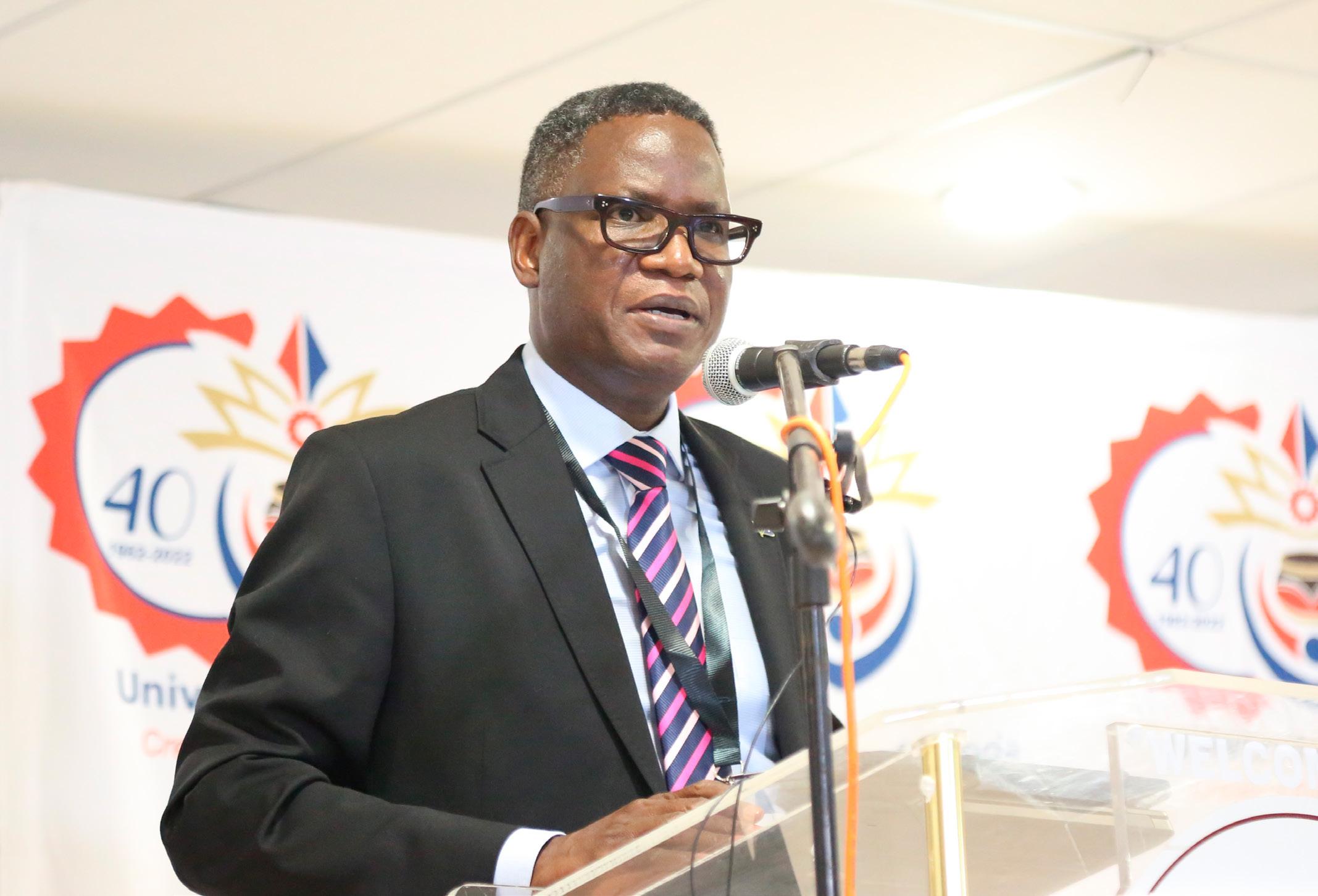
Th e University of Venda (UNIVEN) opened its doors in 1982 on the grounds of the Dimani Agricultural High School in the Tshivhase territory. Like other historically Black universities in South Africa, UNIVEN was established to serve Black people. Through the past 40 years of its existence, UNIVEN has seen tremendous transformation and growth at an extremely fast pace.
celebrated its 40th anniversary of serving local and i nternational communities by shaping future generations. This 40th Anniversary Celebration was held at the University Auditorium under the theme ‘ Reflection on the University’s achievements over the past f our decades’.
R ecent University rankings by Times Higher Education World University Rankings show that UNIVEN is among
the top 15 best universities in the country. This significant growth is o ne of the greatest achievements e ver attained by the University of Venda since its establishment in 1982.
T he challenge ahead of us is to do more and better than what we have done so far. Our path is upward and there is no room for regression. T he celebration was characterised by embracing past achievements, recognising success stories, and helping to shape the future.
T he event was, amongst others, attended by former Vice-Chancellors, Chairpersons of Council, former SRC Presidents, alumni, friends and partners of the University both local and international, Traditional and Religious Leaders, staff and students, as well as retired staff members of the University.
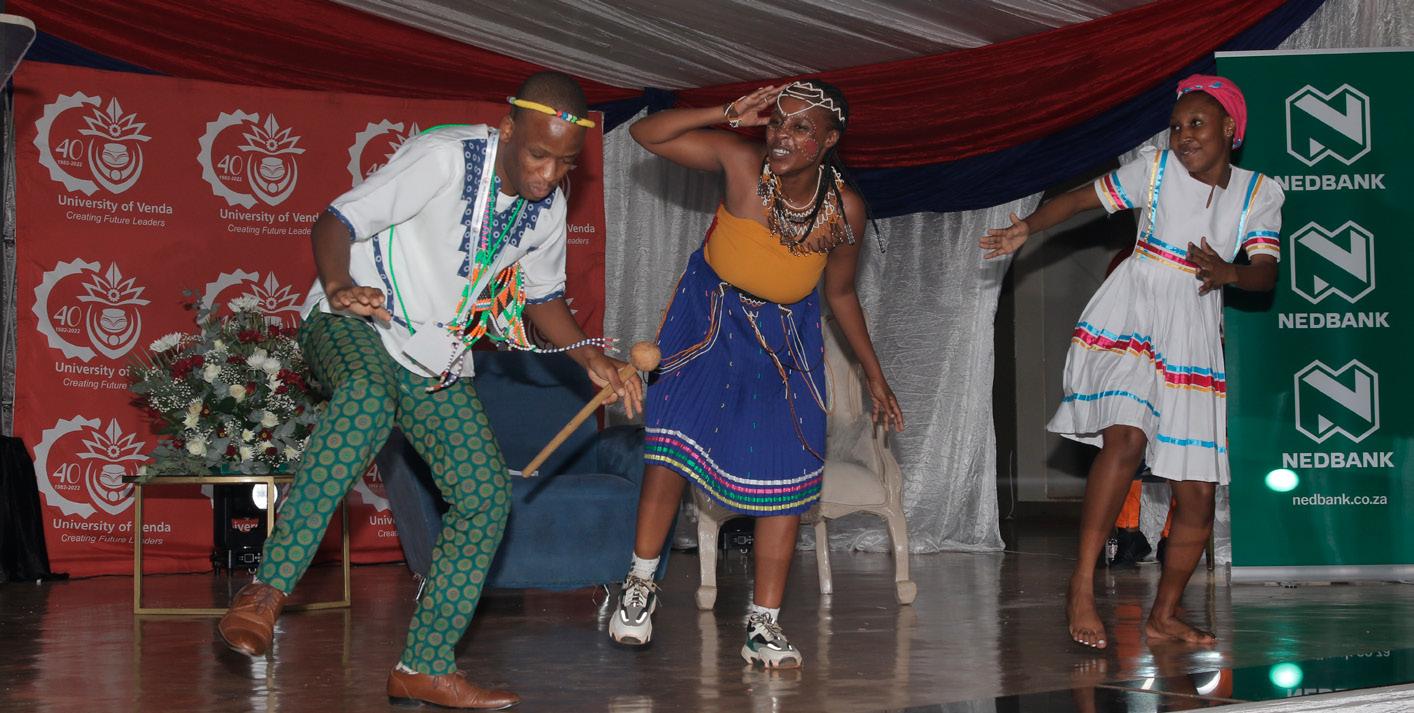
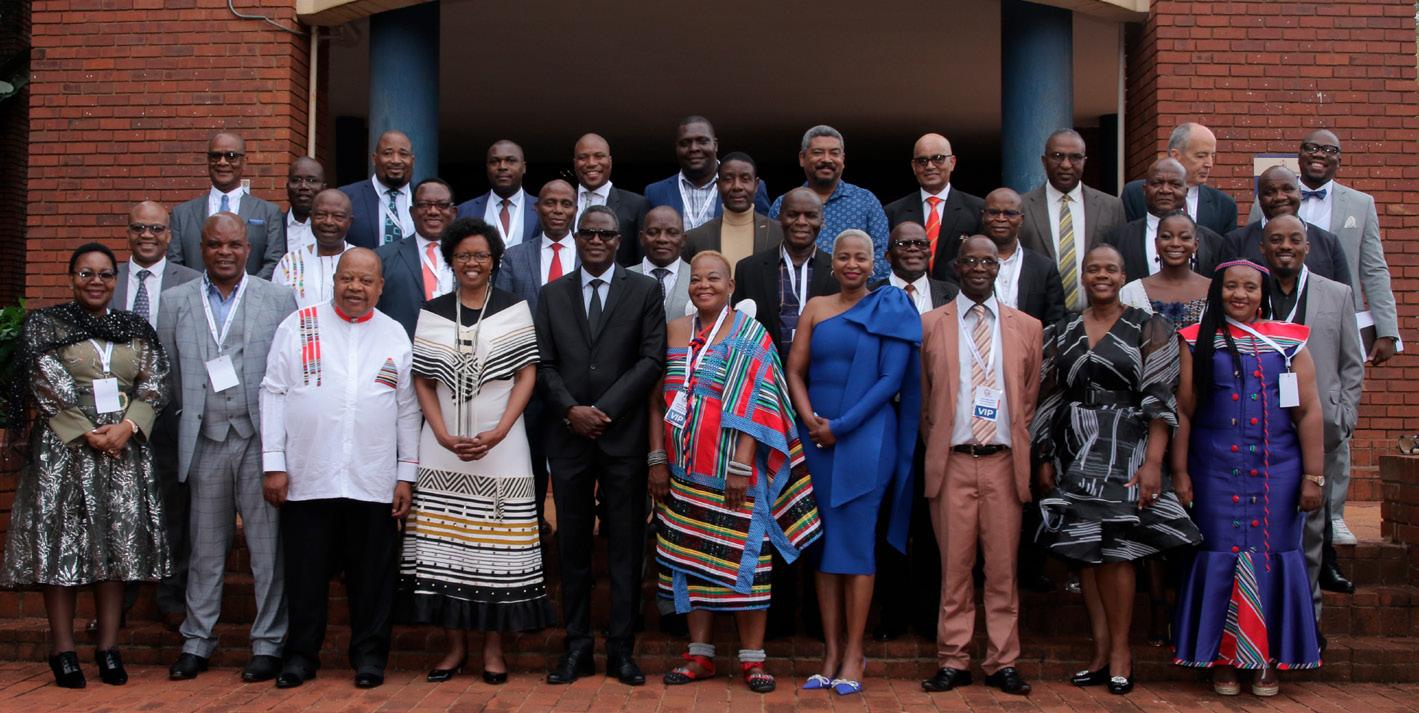
W hen outlining the evolution of the University of Venda during the 40thAnniversary celebration event, the V ice-Chancellor and Principal, Dr. B ernard Nthambeleni, indicated that UNIVEN started with only 177 students, and today it has an enrolment of more than 15 000 students. He said in the past 40 years, UNIVEN has created a vibrant space t hat produced and still produces well-rounded graduates to compete locally and internationally. These are graduates that are holding important positions locally and internationally both in the public a nd private sectors.
“Anniversaries are opportune moments to take stock of the road traversed, to reflect on the decisions made and the detours we have taken during our journey. They are also an opportunity to pay tribute to those that have laid the foundation of our journey and eased our burdens and lifted our spirits along the way. It is also a moment to celebrate the milestones achieved and to
r eflect on the hurdles ahead”, said D r. Bernard Nthambeleni.
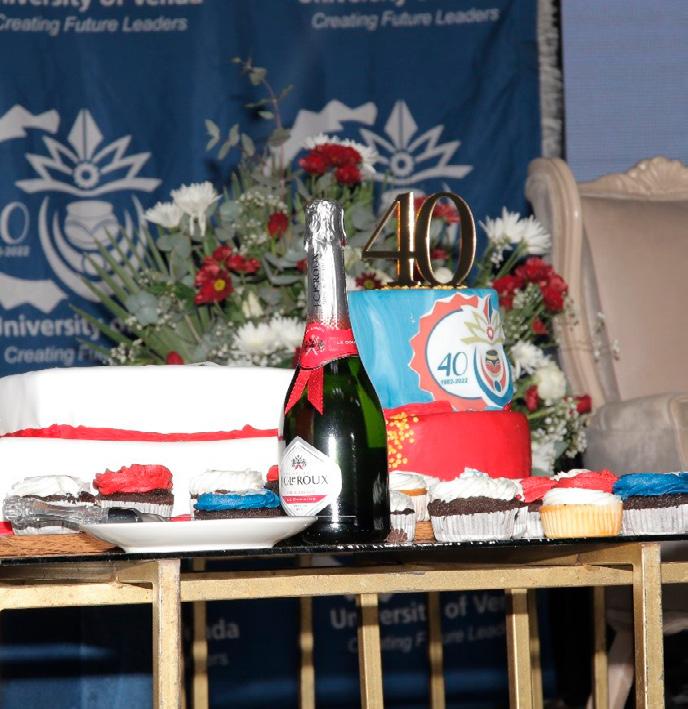
“As we celebrate this 40th anniversary, it is befitting to pay homage to our forerunners who shared a vision for a n educated nation, for without t heir foresight, there would be the n o University of Venda to speak o f”, he says.
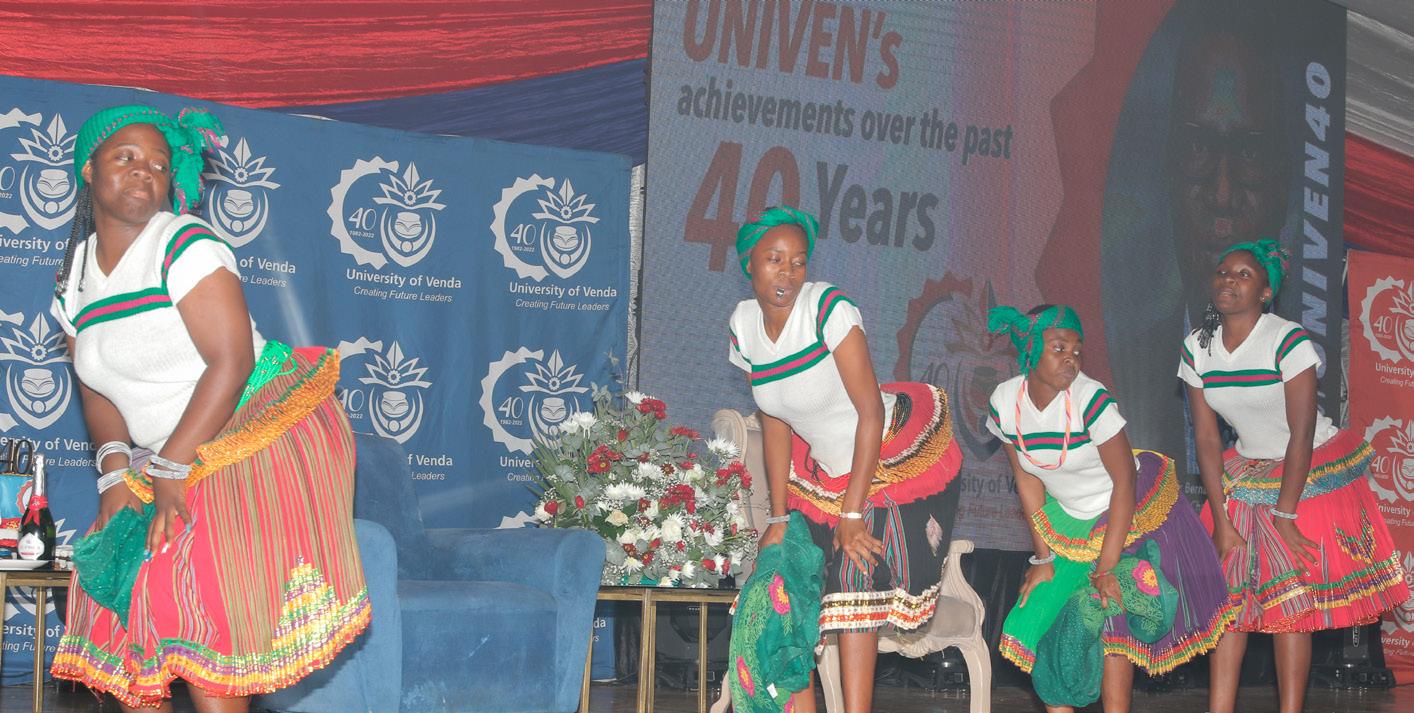

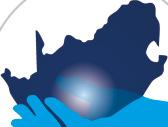
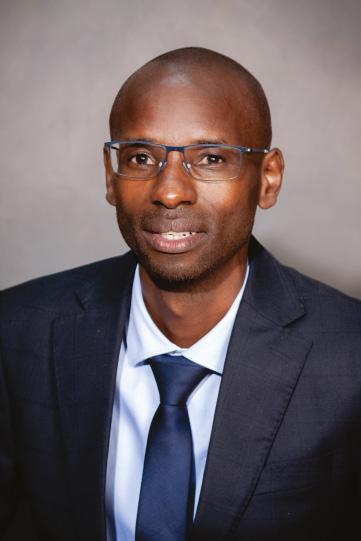





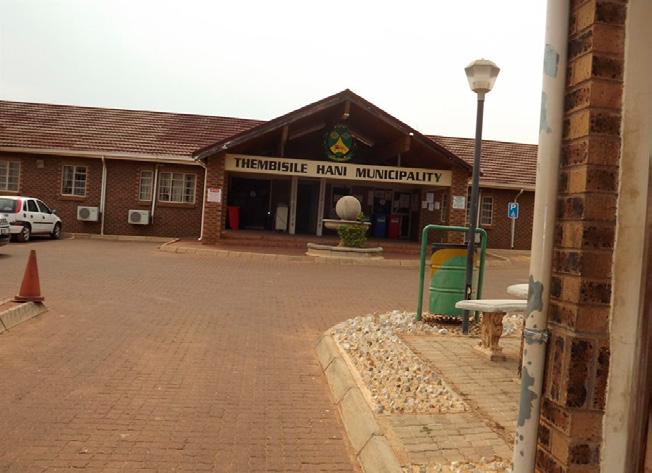
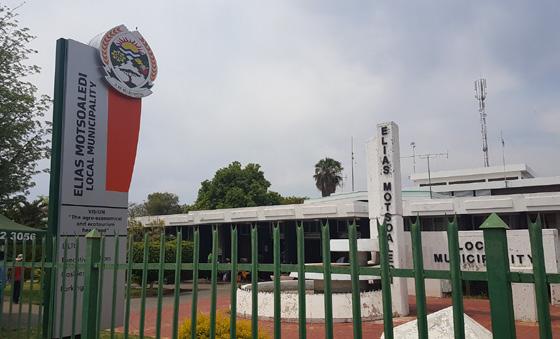

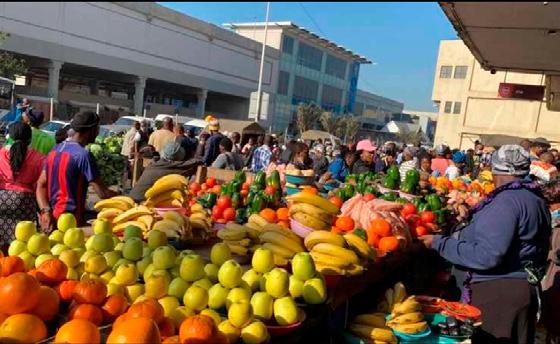
The City of Matlosana Municipality is situated approximately 164 km productive and constitutes prosperity. promotes the competitive advantage of Matlosana as a major Medical Hub fascilities, casualty/trauma and dental services. Most clinics focus on primary
The Council of Thembisile Hani Local Municipality (THLM) took a conscious decision to appoint its youngest Head of Administration, Mr. Dumisani Mahlangu with effect from the 1st of September 2022, on a 5-year fixed-term contract. The affirmation of youngest, is not just in relation to THLM, but the country at large.
Mahlangu is a product of the Engineering and Built Environment Sector, having garnered vast experience in the Civil Engineering and Construction sectors when he was applying his trade during the early stages of his professional career amongst renowned consulting engineering and construction firms. He branched into the Public Sector when he joined THLM in July 2015 as its Project Management Unit (PMU) Manager, before heading to Nkangala District Municipality (NDM) to head up its Technical Services Department in March of 2019.


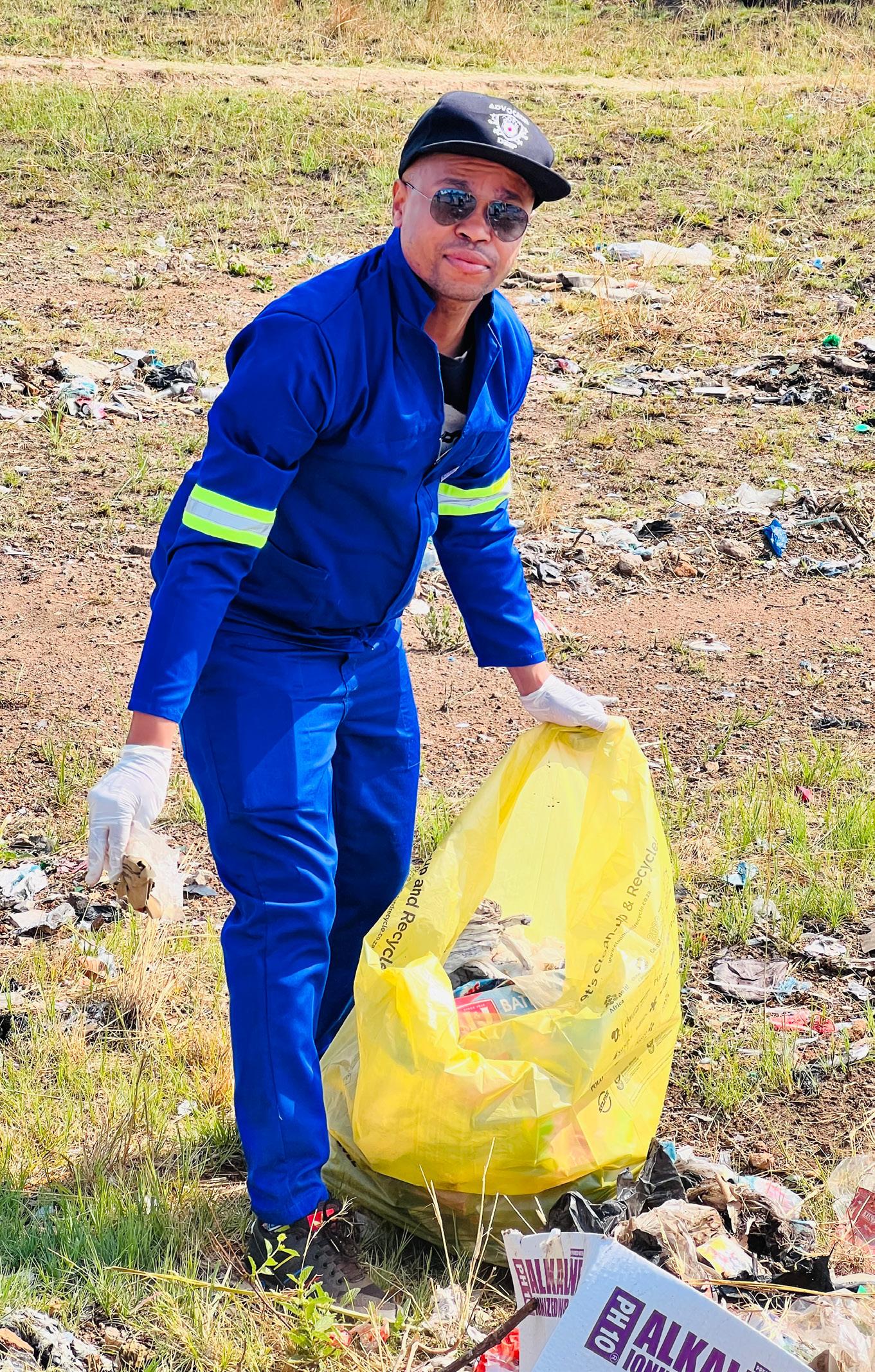
The city prides itself on having five private hospitals, two government hospitals, including the largest state hospital in the North West Province and 15 clinics including mobile clinics. It also boasts the only fully contained oncology unit in the North West Province, which offers a comprehensive service at four pathological laboratories and has the latest MRI scanner at the radiology unit.
N12 Development Route was identified by the municipality as a flagship project for golden opportunities in the following sectors: housing, business, industrial, heritage, mining, tourism, sport as well as recreation.
Born 26th of November 1986, in KwaMhlanga, an area within THLM, his primary and high schooling days can be tracked back to Star of Hope Independent School (in Moloto) and Nigel High School, respectively. Mahlangu began his tertiary education studying Electrical Engineering at Vaal University of Technology before taking a detour to study Civil Engineering at the Central University of Technology, Free State, where he graduated with a Baccalaureus of Technologiae in Civil (Transportation) Engineering in 2012. It was during this period that simultaneously applied his trade with
Appoints a new municipal manager, the youngest in the countryMunicipal Manager : Mr. Dumisani Mahlangu
“Great administration lays

four major standards, which are fairness, accountability, responsibility, and transparency”, says Mahlangu.
Agriculture is one of the mainstays of Matlosana, which proudly boasts a region rich with agricultural potential. The emphasis is focused on field crops, such as maize, wheat, sorghum, sunflowers, etc... (climatically suitable with a 70% probability of production success).
The Concept of Ubuntu and the Rationale of the Transparency Principle is the one that is yet to be published.

Municipal Finance and Management Programme (MFMP) Certificate that be attained with the Wits School of Governance in November 2020.
Aurecon (an International Consulting Engineering Firm) and continued with Keren Kula Construction (a black female-owned Grade-9 Construction Firm).
Aside from attracting investment, the N12 Treasure Route connects communities to the economic hub of Matlosana City. The improved road infrastructure changes the lives of the City’s citizens making it easier to access employment opportunities and other services.
Mahlangu obtained his Post Graduate Diploma (PGD) in Business Administration in November 2020 from the University of South Africa Graduate School of Business Leadership (UNISA), and this prompted him to pursue his Master of Business Administration (MBA), which he plans on completing on/or before December 2022.
Mahlangu is a family man, a husband and a father of two, a son and a brother who enjoys nothing more than spending quality time at the family homestead - and would firmly advocate for Sundays being family days! What we do know about Dumisani is that deejaying and cycling are amongst his extra-mural activities that he enjoys most, notwithstanding the production of articles here and there.
Shoppers can also be spoiled for choice between Matlosana Mall, City Mall, Flamwood Walk Shopping Mall, Tower Mall and other leading shopping centres in Matlosana.
Amongst the articles that Dumisani has written, two published articles stand out, and he implores citizens to set aside time and read them in their spare time, they are:
• Leadership and Organisational Behaviour, Factors that Collectively Contribute to the Success of the Team, which was published on the 21st of April 2021;


• The Construction Industry in South Africa is Undergoing a Litmus Test, which was first written in June 2021, but reworked and published on the 10th of August 2021;
Given the challenges that are experienced by the Construction Industry, the title of his MBA research is the “Impact of Preferential Procurement on the Construction Industry in South Africa”, and he plans on publishing it once graded as his contribution to nation building in a professionalized state.
Further academic credentials under his belt are:
Agriculture is one of the mainstays of Matlosana, which proudly boasts a region rich with agricultural potential. The emphasis is focused on field crops, such as maize, wheat, sorghum, sunflowers, etc...
Programme in Project Management Certificate that he attained from University of Pretoria (UP) in November
The Market is the property of the City of Matlosana and was established in 1980 and it is ranked 8th out of 17 Fresh Markets in the country according to turnover.
Zooming back to his appointment as THLM’s Accounting Officer, Mahlangu has since vowed and/or pledged to serve the community of THLM diligently, efficiently, effectively, honestly and with integrity and humility, and has since adopted the slogan of the Executive Mayor, which reads that “work conquers everything, every time. No explanation, no report, no clarity, but work”. “When you do something out of love, you don’t count the cost, notwithstanding the scientific finding that great administration lays on four major standards, which are fairness, accountability, responsibility, and transparency”, says Mahlangu.
With five Market agents, the market supplies customers as far as Botswana, Kimberly and Vryburg.
Mahlangu, a young, energetic leader with integrity believes that “leadership is about being genuinely obsessed with the development of others”, and others in this context are the people of
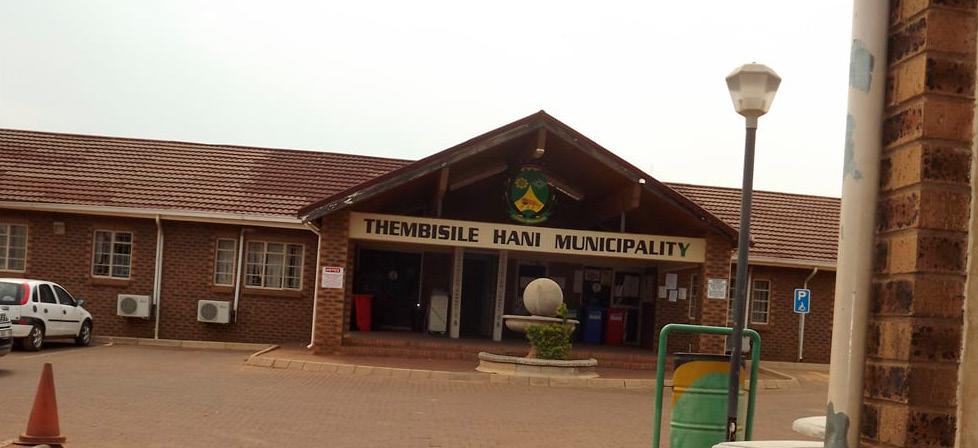
on
The City of Matlosana Municipality is situated approximately 164 km South West of Johannesburg, strategically located on the N12 Treasure Route, which is the North West Province’s primary tourism corridor.
The scenic N12 starts from Mpumalanga and is the gateway to the Western Cape Province. The route takes you from eMalahleni, to the vibrant Gauteng Province and the Sterkfontein Cradle of Humankind World Heritage Site, and continues to Potchefstroom, Klerksdorp, Kimberley, Beaufort West, up until George.
The Mayor of Elias Motsoaledi Local Municipality (EMLM), Cllr David Tladi, Exco Members, as well as Councillors handed out food parcels and provided other essentials such as wheelchairs to Tswelopele Disability Centre in Marapong village, Ward 08.
It is the Transformation of the N12 Treasure Route that has unlocked regional opportunities and resulted in massive activity and mobility along the Matlosana portion of the corridor. It has a multi-dimensional character that has created employment, enhanced commuter movement, enhanced investment opportunities, increased economic activity, etc.
work as part of and with the executive committee, the municipal council and the administration and everyone else who is committed to working towards the realization of the ideas of our people.”
The Mayor made an undertaking then that as the new council, they would focus on basic services and core functions for the betterment of their communities, and the Municipality’s interventions at the Centre during Disabilities Month, is proof of that.
disabilitie. Currently the Centre is taking care of 48 people living with disabilities. The Mayor said that the Municipality would be working with provincial government departments to ensure that more work gets done at the Centre.
The municipality, formerly known as Greater Groblersdal Local Municipality, is named after Elias Motsoaledi, born on July 26, 1924, in Nebo, Sekhukhuneland.
Motsoaledi moved to Johannesburg at the age of 17 in search of work and played an active role in the establishment of the South African Congress of Trade Unions (SACTU).
Create unforgettable memories at our quality business and leisure accommodation venues which include conferencing, wedding and spa facilities.
Speaking during the handover ceremony Honourable Mayor Tladi said government’s mandate is to ensure that it keeps up to its commitments of making sure that communities do feel being part of the entire society.
“It is important that as government, we reach out to those communities who cannot provide for themselves and make a difference in their lives - and also our constitution protects people with disabilities and ensures that every citizen is treated equally,” added Mayor Tladi.
Create unforgettable memories at our quality business and leisure accommodation venues which include conferencing, wedding and spa facilities. The City has a wealth of attractions for visitors:
• Adventure tourism
• Wildlife tourism

• Medical tourism
• Wellness tourism
At his inaugural speech, after being elected Mayor of Elias Motsoaledi Local Municipality on 22 November 2021, he stated, “As the Mayor I am committed to
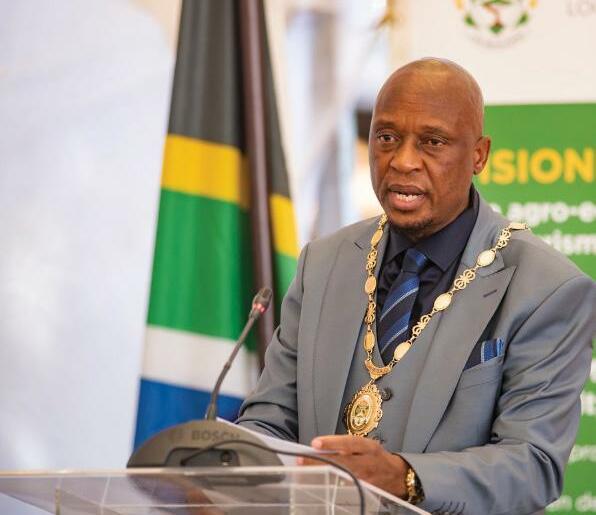
Dimakatso Ditshego, Founder and Project Manager of the Centre, expressed her gratitude for the donations and said, “I am so happy, I don’t even know what to say. When the Municipality said that they were coming, I couldn’t believe it. I can now see that changes are happening, and I can now see that more changes will still come.”
A lifelong member of the ANC and the SACP, he also played a central role in many campaigns, including the Defiance Campaign of 1952, the year in which he was banned. He was detained in terms of the 1960 State of Emergency and imprisoned for four months. On his release, he went underground and served on the Johannesburg Regional Umkhonto we Sizwe.
Ditshego said, “We hope this will change the lives of the beneficiaries as they will be able to move better. May this relationship continue for years to come while you also do this for others as well.”
Tswelopele Disability Centre was established on the 15th of February 2015 with fifteen (15) children living with
To us health care is of paramount importance as a healthy city is productive and constitutes prosperity. We boast well-developed medical facilities, which enhances and promotes the competitive advantage of Matlosana as a major Medical Hub in the North West Province. Services include: general and private medical fascilities, casualty/trauma and dental services. Most clinics focus on primary health care services.
The city prides itself on having five private hospitals, two government hospitals, including the largest state hospital in the North West Province and 15 clinics including mobile clinics. It also boasts the only fully contained oncology unit in the North West Province, which offers a comprehensive service at four pathological laboratories and has the latest MRI scanner at the radiology unit.
Arrested in 1963, Motsoaledi was one of the Rivonia Trialists and was sentenced to life imprisonment on Robben Island, a sentence he served until his release in 1989, 26 years later. On his release, he was elected to the National Executive Committee of the ANC.

N12 Development Route was identified by the municipality as a flagship project for golden opportunities in the following sectors: housing, business, industrial, heritage, mining, tourism, sport as well as recreation.
Motsoaledi passed away on the 09 May 1994, the day before the inauguration of the first Democratic President of South Africa, his fellow Rivonia Trialist and Robben Island Prisoner, Nelson Mandela.
“It is important that as government, we reach out to those communities who cannot provide for themselves and make a difference in their lives."
improving the economy of the district and livelihood of its people.
The Thabo Mofutsanyana District Municipality encompasses the six local municipalities of Dihlabeng, MalutiA-Phofung, Mantsopa, Nketoana, Phumelela and Setsoto and is committed to creating integrated, self-reliant and sustainable communities by improving living conditions and developing a conducive environment for business opportunities and job creation.
access employment opportunities and other services.
Shoppers can also be spoiled for choice between Matlosana Mall, City Mall, Flamwood Walk Shopping Mall, Tower Mall and other leading shopping centres in Matlosana.
As part of the Presidential District Development Model (DDM) programs in infrastructure, agriculture and renewable energy projects, Thabo Mofutsanyana Municipality has appointed Trioflex Incubator and KB Engineering to develop and implement renewable energy and water harvesting technology in the municipality. The appointments were made through a competitive bidding process.
Energy and Water Development Corporation (EAWD), an innovator in alternative energy and green tech, has signed a letter of intent with Trioflex Incubator (Pty) Ltd and KB Engineering GmbH.

Irma Velazquez, CEO of EAWD said, “Implementation of renewable energy and water harvesting technology projects will help improve lives and support the economic growth initiatives of the Thabo
mainstays of Matlosana, which proudly boasts a region rich with agricultural potential. The emphasis is focused on field crops, such as maize, wheat, sorghum, sunflowers, etc...
Mofutsanyana District Municipality," "There is a growing need for additional, reliable sources of power and water generation worldwide, and South Africa is no exception. Through the Trioflex Incubator, the partnership between EAWD and KB Engineering brings the proven technology and engineering experience to create sustainable production of water and energy while also developing skills and creating jobs within our community to further our goal of eradicating poverty," said Thapelo Mokoena, CEO of Trioflex Incubator.
Takatso Lebenya, the Municipal Manager of Thabo Mofutsanyana District Municipality, thanked Trioflex Incubator and KB Engineering for arranging the meeting in Hamburg, Germany, and applauded Mr Mokoena for his vision and perseverance, saying these interactions will go a long way in
Key priorities of the municipality include sustainable infrastructure, local economic development, job creation, agriculture and rural development, social development, community participation and financial viability.
The Market is the property of the City of Matlosana and was established in 1980 and it is ranked 8th out of 17 Fresh Markets in the country according to turnover.
"The interest and support from the local government in South Africa to work with local communities in the Thabo Mofutsanyana District Municipality to develop sources of sustainable energy and water is encouraging," said Norbert Kajüter, Managing Director, KB Engineering.
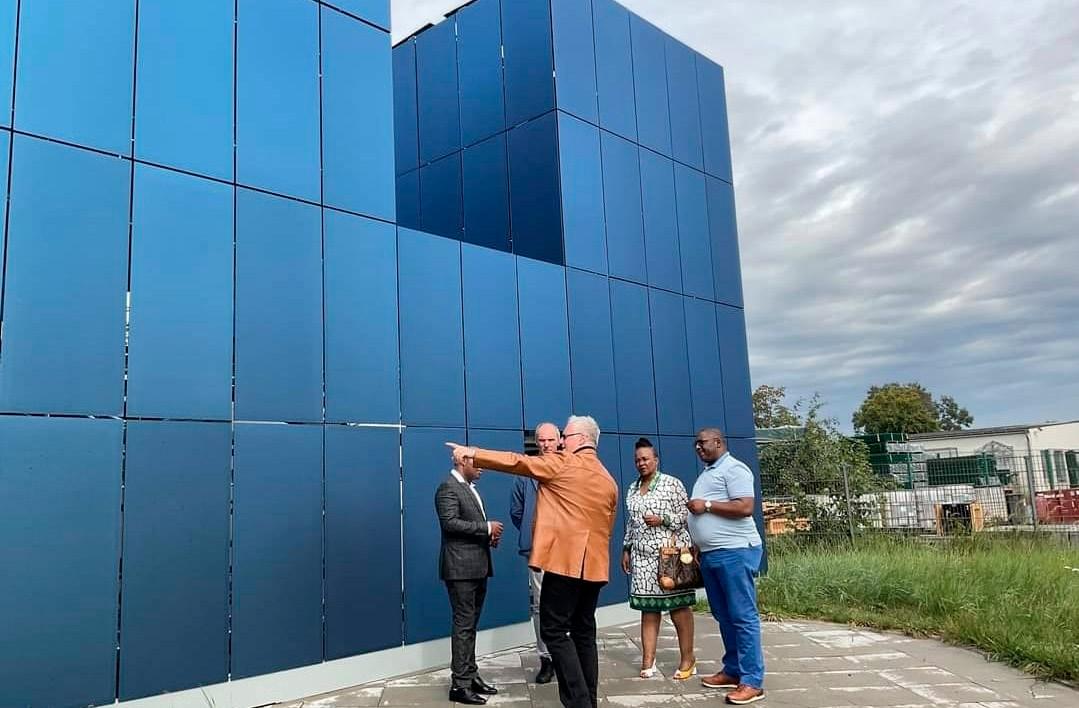

With five Market agents, the market supplies customers as far as Botswana, Kimberly and Vryburg.
CONTACT DETAILS
Address: Cnr Braamfisher & OR Tambo Streets, Klerksdorp
Tel: 018 487 8000/ 018 487 8800


Email: communications@ klerksdorp.org
CityofMatlosanaUpdates @MatlosanaCom
Cityofmatlosanamunicipal
Trioflex Incubator is 100% Black Owned and Managed and is an accredited QCTO Training Provider and acts as the strategic partner of Thabo Mofutsanyana District Municipality appointed to train Artisans and be a source of funding for unfunded projects as per the District Development Model (DDM) ONE PLAN. As a business Incubator, the company’s focus is on developing entrepreneurs to become successful.
The City of Matlosana Municipality is situated approximately 164 km South West of Johannesburg, strategically located on the N12 Treasure Route, which is the North West Province’s primary tourism corridor.
The scenic N12 starts from Mpumalanga and is the gateway to the Western Cape Province. The route takes you from eMalahleni, to the vibrant Gauteng Province and the Sterkfontein Cradle of Humankind World Heritage Site, and continues to Potchefstroom, Klerksdorp, Kimberley, Beaufort West, up until George.
It is the Transformation of the N12 Treasure Route that has unlocked regional opportunities and resulted in massive activity and mobility along the Matlosana portion of the corridor. It has a multi-dimensional character that has created employment, enhanced commuter movement, enhanced investment opportunities, increased economic activity, etc.
was adopted by Council in September. The policy will serve as a guide and support structure for the informal economy sector until 2028.
“At our inaugural Indaba last year, the sector raised several challenges that delayed transformation and growth. As a result, the Indaba adopted specific resolutions, which resulted in the review of the Informal Economy Policy and the provision of adequate infrastructure for informal traders. This policy will go a long way in ensuring the sector is not overlooked when the municipality formulates its business plans and allocates budget for various programmes,” said Mayor Kaunda.
Furthermore, as part of the Municipality’s continuous efforts to support informal businesses adversely affected by the floods earlier this year, the municipality distributed vouchers, ranging from R2 000 to R3 000, to around 150 informal businesses to purchase stock as part of the rebuilding process.
eThekwini Municipality, as part of the Municipality’s continuous efforts to support informal businesses, has approved a R60 million budget to build infrastructure for informal traders. This announcement was made during the second (2nd) Informal Economy Indaba, held at Inkosi Albert Luthuli International Convention Centre (Durban ICC) on Wednesday, 02 November 2022.
Create unforgettable memories at our quality business and leisure accommodation venues which include conferencing, wedding and spa facilities. The City has a wealth of attractions for visitors:
Create unforgettable memories at our quality business and leisure accommodation venues which include conferencing, wedding and spa facilities.
employment, goods and services for lower income groups,” said Mayor of eThekwini, Cllr Mxolisi Kaunda.
The Indaba, themed 'Embracing Informality', outlined the municipality’s plans to support and recognise the important role the informal sector plays in growing the city’s economy and job creation and was aimed at transforming the economy of the City’s informal sector into an efficient and competitive one.
The city prides itself on having five private hospitals, two government hospitals, including the largest state hospital in the North West Province and 15 clinics including mobile clinics. It also boasts the only fully contained oncology unit in the North West Province, which offers a comprehensive service at four pathological laboratories and has the latest MRI scanner at the radiology unit.
• Adventure tourism
• Wildlife tourism

• Medical tourism
• Wellness tourism
“The informal traders’ sector is very important to the city’s economy as it contributes over R8 billion, which translates to more than nine percent of the Gross Domestic Product (GDP). This sector is also a major provider of
To us health care is of paramount importance as a healthy city is productive and constitutes prosperity. We boast well-developed medical facilities, which enhances and promotes the competitive advantage of Matlosana as a major Medical Hub in the North West Province. Services include: general and private medical fascilities, casualty/trauma and dental services. Most clinics focus on primary health care services.
Cllr. Kaunda, revealed that through a consultative process, the municipality has been able to complete the review of the Informal Economy Policy which

“The handover is the first phase of the eThekwini Flood Relief Programme to benefit approximately 2 000 informal businesses, ranging from fruits and vegetables, clothing and textile, as well as the automotive sector. This was made possible through our collaboration with the Small Enterprise Finance Agency (SEFA) and Small Enterprise Development Agency (SEDA),” added Mayor Kaunda.
N12 Development Route was identified by the municipality as a flagship project for golden opportunities in the following sectors: housing, business, industrial, heritage, mining, tourism, sport as well as recreation.
“Dream beyond trading in the taxi rank and see yourself in bigger spaces,” said Mayor Kaunda.
•
•


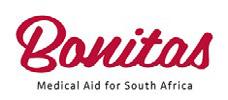





• Bridging the gaps of financial planning between wealthy and financially indigent individuals.









• Grow with our clients from as early as their first financial income (job/business) to set clear retirement goals.
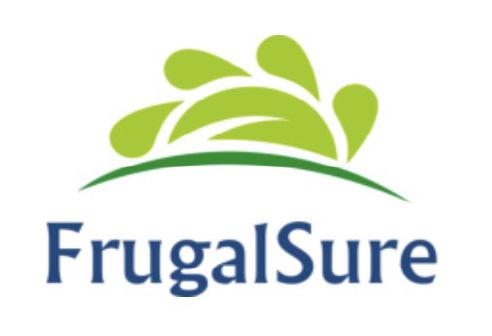

• Build realistic financial goals by reviewing our client’s financial plans regularly to accommodate their life stages and possible changes.







